You are using an outdated browser. Upgrade your browser today or install Google Chrome Frame to better experience this site.

Morocco Traveler View
Travel health notices, vaccines and medicines, non-vaccine-preventable diseases, stay healthy and safe.
- Packing List
After Your Trip
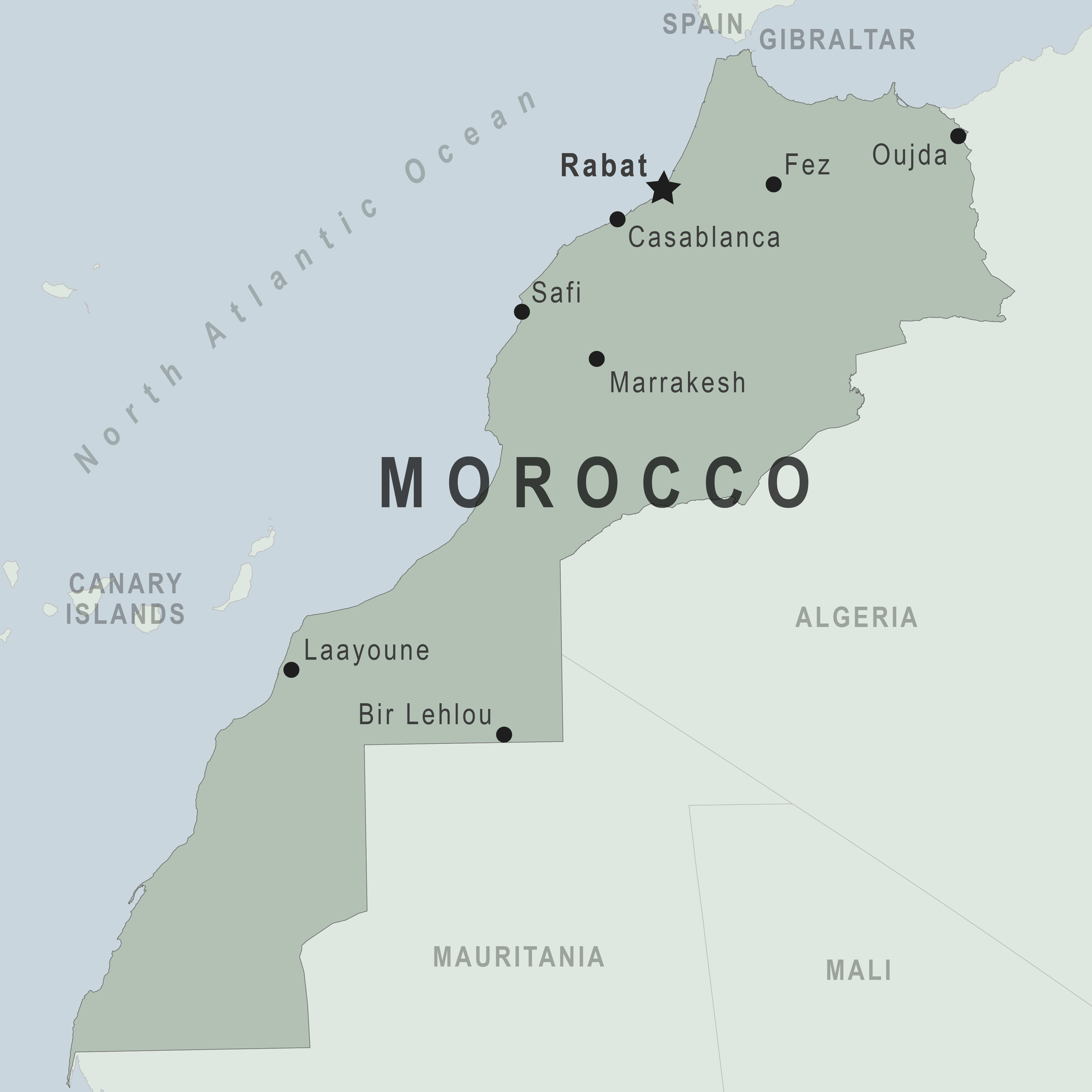
There are no notices currently in effect for Morocco.
⇧ Top
Check the vaccines and medicines list and visit your doctor at least a month before your trip to get vaccines or medicines you may need. If you or your doctor need help finding a location that provides certain vaccines or medicines, visit the Find a Clinic page.
Routine vaccines
Recommendations.
Make sure you are up-to-date on all routine vaccines before every trip. Some of these vaccines include
- Chickenpox (Varicella)
- Diphtheria-Tetanus-Pertussis
- Flu (influenza)
- Measles-Mumps-Rubella (MMR)
Immunization schedules
All eligible travelers should be up to date with their COVID-19 vaccines. Please see Your COVID-19 Vaccination for more information.
COVID-19 vaccine
Hepatitis A
Recommended for unvaccinated travelers one year old or older going to Morocco.
Infants 6 to 11 months old should also be vaccinated against Hepatitis A. The dose does not count toward the routine 2-dose series.
Travelers allergic to a vaccine component or who are younger than 6 months should receive a single dose of immune globulin, which provides effective protection for up to 2 months depending on dosage given.
Unvaccinated travelers who are over 40 years old, immunocompromised, or have chronic medical conditions planning to depart to a risk area in less than 2 weeks should get the initial dose of vaccine and at the same appointment receive immune globulin.
Hepatitis A - CDC Yellow Book
Dosing info - Hep A
Hepatitis B
Recommended for unvaccinated travelers younger than 60 years old traveling to Morocco. Unvaccinated travelers 60 years and older may get vaccinated before traveling to Morocco.
Hepatitis B - CDC Yellow Book
Dosing info - Hep B
Cases of measles are on the rise worldwide. Travelers are at risk of measles if they have not been fully vaccinated at least two weeks prior to departure, or have not had measles in the past, and travel internationally to areas where measles is spreading.
All international travelers should be fully vaccinated against measles with the measles-mumps-rubella (MMR) vaccine, including an early dose for infants 6–11 months, according to CDC’s measles vaccination recommendations for international travel .
Measles (Rubeola) - CDC Yellow Book
Rabid dogs are commonly found in Morocco. However, if you are bitten or scratched by a dog or other mammal while in Morocco, rabies treatment is often available.
Consider rabies vaccination before your trip if your activities mean you will be around dogs or wildlife.
Travelers more likely to encounter rabid animals include
- Campers, adventure travelers, or cave explorers (spelunkers)
- Veterinarians, animal handlers, field biologists, or laboratory workers handling animal specimens
- Visitors to rural areas
Since children are more likely to be bitten or scratched by a dog or other animals, consider rabies vaccination for children traveling to Morocco.
Rabies - CDC Yellow Book
Recommended for most travelers, especially those staying with friends or relatives or visiting smaller cities or rural areas.
Typhoid - CDC Yellow Book
Dosing info - Typhoid
- Avoid contaminated water
Leptospirosis
How most people get sick (most common modes of transmission)
- Touching urine or other body fluids from an animal infected with leptospirosis
- Swimming or wading in urine-contaminated fresh water, or contact with urine-contaminated mud
- Drinking water or eating food contaminated with animal urine
- Avoid contaminated water and soil
Clinical Guidance
Schistosomiasis
- Wading, swimming, bathing, or washing in contaminated freshwater streams, rivers, ponds, lakes, or untreated pools.
Avoid bug bites
Leishmaniasis
- Sand fly bite
- Avoid Bug Bites
Airborne & droplet
- Breathing in air or accidentally eating food contaminated with the urine, droppings, or saliva of infected rodents
- Bite from an infected rodent
- Less commonly, being around someone sick with hantavirus (only occurs with Andes virus)
- Avoid rodents and areas where they live
- Avoid sick people
Tuberculosis (TB)
- Breathe in TB bacteria that is in the air from an infected and contagious person coughing, speaking, or singing.
Learn actions you can take to stay healthy and safe on your trip. Vaccines cannot protect you from many diseases in Morocco, so your behaviors are important.
Eat and drink safely
Food and water standards around the world vary based on the destination. Standards may also differ within a country and risk may change depending on activity type (e.g., hiking versus business trip). You can learn more about safe food and drink choices when traveling by accessing the resources below.
- Choose Safe Food and Drinks When Traveling
- Water Treatment Options When Hiking, Camping or Traveling
- Global Water, Sanitation and Hygiene | Healthy Water
- Avoid Contaminated Water During Travel
You can also visit the Department of State Country Information Pages for additional information about food and water safety.
Prevent bug bites
Bugs (like mosquitoes, ticks, and fleas) can spread a number of diseases in Morocco. Many of these diseases cannot be prevented with a vaccine or medicine. You can reduce your risk by taking steps to prevent bug bites.
What can I do to prevent bug bites?
- Cover exposed skin by wearing long-sleeved shirts, long pants, and hats.
- Use an appropriate insect repellent (see below).
- Use permethrin-treated clothing and gear (such as boots, pants, socks, and tents). Do not use permethrin directly on skin.
- Stay and sleep in air-conditioned or screened rooms.
- Use a bed net if the area where you are sleeping is exposed to the outdoors.
What type of insect repellent should I use?
- FOR PROTECTION AGAINST TICKS AND MOSQUITOES: Use a repellent that contains 20% or more DEET for protection that lasts up to several hours.
- Picaridin (also known as KBR 3023, Bayrepel, and icaridin)
- Oil of lemon eucalyptus (OLE) or para-menthane-diol (PMD)
- 2-undecanone
- Always use insect repellent as directed.
What should I do if I am bitten by bugs?
- Avoid scratching bug bites, and apply hydrocortisone cream or calamine lotion to reduce the itching.
- Check your entire body for ticks after outdoor activity. Be sure to remove ticks properly.
What can I do to avoid bed bugs?
Although bed bugs do not carry disease, they are an annoyance. See our information page about avoiding bug bites for some easy tips to avoid them. For more information on bed bugs, see Bed Bugs .
For more detailed information on avoiding bug bites, see Avoid Bug Bites .
Stay safe outdoors
If your travel plans in Morocco include outdoor activities, take these steps to stay safe and healthy during your trip.
- Stay alert to changing weather conditions and adjust your plans if conditions become unsafe.
- Prepare for activities by wearing the right clothes and packing protective items, such as bug spray, sunscreen, and a basic first aid kit.
- Consider learning basic first aid and CPR before travel. Bring a travel health kit with items appropriate for your activities.
- If you are outside for many hours in heat, eat salty snacks and drink water to stay hydrated and replace salt lost through sweating.
- Protect yourself from UV radiation : use sunscreen with an SPF of at least 15, wear protective clothing, and seek shade during the hottest time of day (10 a.m.–4 p.m.).
- Be especially careful during summer months and at high elevation. Because sunlight reflects off snow, sand, and water, sun exposure may be increased during activities like skiing, swimming, and sailing.
- Very cold temperatures can be dangerous. Dress in layers and cover heads, hands, and feet properly if you are visiting a cold location.
Stay safe around water
- Swim only in designated swimming areas. Obey lifeguards and warning flags on beaches.
- Practice safe boating—follow all boating safety laws, do not drink alcohol if driving a boat, and always wear a life jacket.
- Do not dive into shallow water.
- Do not swim in freshwater in developing areas or where sanitation is poor.
- Avoid swallowing water when swimming. Untreated water can carry germs that make you sick.
- To prevent infections, wear shoes on beaches where there may be animal waste.
Schistosomiasis, a parasitic infection that can be spread in fresh water, is found in Morocco. Avoid swimming in fresh, unchlorinated water, such as lakes, ponds, or rivers.
Keep away from animals
Most animals avoid people, but they may attack if they feel threatened, are protecting their young or territory, or if they are injured or ill. Animal bites and scratches can lead to serious diseases such as rabies.
Follow these tips to protect yourself:
- Do not touch or feed any animals you do not know.
- Do not allow animals to lick open wounds, and do not get animal saliva in your eyes or mouth.
- Avoid rodents and their urine and feces.
- Traveling pets should be supervised closely and not allowed to come in contact with local animals.
- If you wake in a room with a bat, seek medical care immediately. Bat bites may be hard to see.
All animals can pose a threat, but be extra careful around dogs, bats, monkeys, sea animals such as jellyfish, and snakes. If you are bitten or scratched by an animal, immediately:
- Wash the wound with soap and clean water.
- Go to a doctor right away.
- Tell your doctor about your injury when you get back to the United States.
Consider buying medical evacuation insurance. Rabies is a deadly disease that must be treated quickly, and treatment may not be available in some countries.
Reduce your exposure to germs
Follow these tips to avoid getting sick or spreading illness to others while traveling:
- Wash your hands often, especially before eating.
- If soap and water aren’t available, clean hands with hand sanitizer (containing at least 60% alcohol).
- Don’t touch your eyes, nose, or mouth. If you need to touch your face, make sure your hands are clean.
- Cover your mouth and nose with a tissue or your sleeve (not your hands) when coughing or sneezing.
- Try to avoid contact with people who are sick.
- If you are sick, stay home or in your hotel room, unless you need medical care.
Avoid sharing body fluids
Diseases can be spread through body fluids, such as saliva, blood, vomit, and semen.
Protect yourself:
- Use latex condoms correctly.
- Do not inject drugs.
- Limit alcohol consumption. People take more risks when intoxicated.
- Do not share needles or any devices that can break the skin. That includes needles for tattoos, piercings, and acupuncture.
- If you receive medical or dental care, make sure the equipment is disinfected or sanitized.
Know how to get medical care while traveling
Plan for how you will get health care during your trip, should the need arise:
- Carry a list of local doctors and hospitals at your destination.
- Review your health insurance plan to determine what medical services it would cover during your trip. Consider purchasing travel health and medical evacuation insurance.
- Carry a card that identifies, in the local language, your blood type, chronic conditions or serious allergies, and the generic names of any medications you take.
- Some prescription drugs may be illegal in other countries. Call Morocco’s embassy to verify that all of your prescription(s) are legal to bring with you.
- Bring all the medicines (including over-the-counter medicines) you think you might need during your trip, including extra in case of travel delays. Ask your doctor to help you get prescriptions filled early if you need to.
Many foreign hospitals and clinics are accredited by the Joint Commission International. A list of accredited facilities is available at their website ( www.jointcommissioninternational.org ).
In some countries, medicine (prescription and over-the-counter) may be substandard or counterfeit. Bring the medicines you will need from the United States to avoid having to buy them at your destination.
Select safe transportation
Motor vehicle crashes are the #1 killer of healthy US citizens in foreign countries.
In many places cars, buses, large trucks, rickshaws, bikes, people on foot, and even animals share the same lanes of traffic, increasing the risk for crashes.
Be smart when you are traveling on foot.
- Use sidewalks and marked crosswalks.
- Pay attention to the traffic around you, especially in crowded areas.
- Remember, people on foot do not always have the right of way in other countries.
Riding/Driving
Choose a safe vehicle.
- Choose official taxis or public transportation, such as trains and buses.
- Ride only in cars that have seatbelts.
- Avoid overcrowded, overloaded, top-heavy buses and minivans.
- Avoid riding on motorcycles or motorbikes, especially motorbike taxis. (Many crashes are caused by inexperienced motorbike drivers.)
- Choose newer vehicles—they may have more safety features, such as airbags, and be more reliable.
- Choose larger vehicles, which may provide more protection in crashes.
Think about the driver.
- Do not drive after drinking alcohol or ride with someone who has been drinking.
- Consider hiring a licensed, trained driver familiar with the area.
- Arrange payment before departing.
Follow basic safety tips.
- Wear a seatbelt at all times.
- Sit in the back seat of cars and taxis.
- When on motorbikes or bicycles, always wear a helmet. (Bring a helmet from home, if needed.)
- Avoid driving at night; street lighting in certain parts of Morocco may be poor.
- Do not use a cell phone or text while driving (illegal in many countries).
- Travel during daylight hours only, especially in rural areas.
- If you choose to drive a vehicle in Morocco, learn the local traffic laws and have the proper paperwork.
- Get any driving permits and insurance you may need. Get an International Driving Permit (IDP). Carry the IDP and a US-issued driver's license at all times.
- Check with your auto insurance policy's international coverage, and get more coverage if needed. Make sure you have liability insurance.
- Avoid using local, unscheduled aircraft.
- If possible, fly on larger planes (more than 30 seats); larger airplanes are more likely to have regular safety inspections.
- Try to schedule flights during daylight hours and in good weather.
Medical Evacuation Insurance
If you are seriously injured, emergency care may not be available or may not meet US standards. Trauma care centers are uncommon outside urban areas. Having medical evacuation insurance can be helpful for these reasons.
Helpful Resources
Road Safety Overseas (Information from the US Department of State): Includes tips on driving in other countries, International Driving Permits, auto insurance, and other resources.
The Association for International Road Travel has country-specific Road Travel Reports available for most countries for a minimal fee.
Maintain personal security
Use the same common sense traveling overseas that you would at home, and always stay alert and aware of your surroundings.
Before you leave
- Research your destination(s), including local laws, customs, and culture.
- Monitor travel advisories and alerts and read travel tips from the US Department of State.
- Enroll in the Smart Traveler Enrollment Program (STEP) .
- Leave a copy of your itinerary, contact information, credit cards, and passport with someone at home.
- Pack as light as possible, and leave at home any item you could not replace.
While at your destination(s)
- Carry contact information for the nearest US embassy or consulate .
- Carry a photocopy of your passport and entry stamp; leave the actual passport securely in your hotel.
- Follow all local laws and social customs.
- Do not wear expensive clothing or jewelry.
- Always keep hotel doors locked, and store valuables in secure areas.
- If possible, choose hotel rooms between the 2nd and 6th floors.
Healthy Travel Packing List
Use the Healthy Travel Packing List for Morocco for a list of health-related items to consider packing for your trip. Talk to your doctor about which items are most important for you.
Why does CDC recommend packing these health-related items?
It’s best to be prepared to prevent and treat common illnesses and injuries. Some supplies and medicines may be difficult to find at your destination, may have different names, or may have different ingredients than what you normally use.
If you are not feeling well after your trip, you may need to see a doctor. If you need help finding a travel medicine specialist, see Find a Clinic . Be sure to tell your doctor about your travel, including where you went and what you did on your trip. Also tell your doctor if you were bitten or scratched by an animal while traveling.
For more information on what to do if you are sick after your trip, see Getting Sick after Travel .
Map Disclaimer - The boundaries and names shown and the designations used on maps do not imply the expression of any opinion whatsoever on the part of the Centers for Disease Control and Prevention concerning the legal status of any country, territory, city or area or of its authorities, or concerning the delimitation of its frontiers or boundaries. Approximate border lines for which there may not yet be full agreement are generally marked.
Other Destinations
If you need help finding travel information:
Message & data rates may apply. CDC Privacy Policy
File Formats Help:
- Adobe PDF file
- Microsoft PowerPoint file
- Microsoft Word file
- Microsoft Excel file
- Audio/Video file
- Apple Quicktime file
- RealPlayer file
- Zip Archive file
Exit Notification / Disclaimer Policy
- The Centers for Disease Control and Prevention (CDC) cannot attest to the accuracy of a non-federal website.
- Linking to a non-federal website does not constitute an endorsement by CDC or any of its employees of the sponsors or the information and products presented on the website.
- You will be subject to the destination website's privacy policy when you follow the link.
- CDC is not responsible for Section 508 compliance (accessibility) on other federal or private website.
Morocco Travel Guide
Stunning interior gardens, courtyards, and delicious tajines, spanning from the Atlas Mountains to the Sahara.
Best time to visit Morocco
Rent a car in morocco, best places to visit in morocco, sahara morocco: visit the merzouga desert on a 3-day tour, 9 best things to do in chefchaouen, morocco, 11 things to do in fes, morocco (complete guide), map of morocco, weather in morocco.
Morocco's weather is primarily dry year round, with mild winters, and intensely hot summers. Springtime, from March to May, is the most beautiful time to visit as landscapes bloom. September to November are also very pleasant months, ideal for exploring.
Destinations in Morocco
Things to do in marrakech, morocco: a 3-day guide, how to rent a car in morocco, best travel insurances.
- Find Hotels via Booking.com
- Find Hostels via Hostelworld
- Find a Rental Car via Sunny Cars
- Find Flights to Morocco via Skyscanner
- Get a Travel Insurance via Heymondo
- Book Tours & Attractions via GetYourGuide
- Book a Bus/Train/Transfer via 12Go
- Get a Visa via iVisa
- How to pack light for your trip
- How to plan your trip our tips
Why is Morocco worth visiting?
Morocco is an incredibly stunning and diverse country, full of wonder. Home to the Sahara desert, the Atlas Mountains, stunning architecture, lively medinas, calming hammams, bustling souks, and tranquil gardens, it’s a destination that’ll overload your senses but captivating to explore.
Is Morocco cheap to visit?
Enjoy this Moroccan charm without breaking the bank! While there are some very luxurious hotels and experiences in Morocco, it tends to be a very affordable travel destination; with tempting stalls selling delicious food for $5 and quaint riads starting at $20 a night, there are options for everyone.
Can I drink tap water in Morocco?
While most locals will drink tap water, it’s recommended to avoid it as a traveler. Stay hydrated by using a reusable water bottle with a filter system, or purchase a large bottle that you can refill from during your trip.
Do I need a visa for traveling in Morocco?
Good news! Most travelers can explore Morocco visa-free for up to 90 days. Check your country’s specific entry requirements before your trip, and when entering the country, make sure to get your passport stamped on arrival.
What language do they speak in Morocco?
Moroccan Arabic is the native language of Morocco, amongst other languages, depending on the area. Virtually all Moroccans will be able to speak French, and in the main tourist areas, English is also widely spoken, so you should have no problems getting by.
Do I need travel insurance for Morocco?
While traveling around beautiful Morocco, unforeseen circumstances may arise, like lost belongings and medical emergencies. Having travel insurance will keep you protected on the go and ensure peace of mind.
Is Morocco safe?
Morocco is a safe country to travel to, with friendly locals keen to chat. Petty crime does exist, so it’s always a good idea to exercise caution, leave valuables out of sight, avoid back alleys, and make sure not to walk alone at night. However, for the most part, Morocco is a beautiful place to explore worry-free!
What power plug type does Morocco have?
The standard plug used in Morocco is the two round pin plugs, known as plug type C and E. Make sure to bring your adapters or purchase one at the airport to keep connected during your trip.
Why do people love Morocco?
Morocco is loved for its incredibly diverse experiences and sensory delights. One moment, you can be experiencing sunrise on a camel in the Sahara Desert , the next enjoying a delicious tagine on a rooftop in Marrakesh, or wandering the blue streets of Chefchaouen. Morocco has it all!
Travel in Morocco
A mesmerizing land of diversity, Morocco guarantees to enlighten all your senses. From majestic mountains, serene beaches, and quaint gardens to bustling medinas, camel riding in the desert, and tea with Berbers, a vacation in Morocco promises to be full of surprises.
How to plan your trip to Morocco
Use our Morocco travel guides to create the ultimate adventure! Whether you’re planning a weekend break to Marrakech , keen to get lost in the ‘Blue Pearl’ city of Chefchaouen , or looking for a breathtaking Sahara desert experience, our guides have you covered with all you need to plan the perfect Morocco holiday .
Backpacking around the country? 10 days in Morocco gives you a great amount of time to experience the best places in Morocco .
Best time to visit Morocco
Heading on vacation to Morocco ? Before your trip, it’s essential to pick the best season to explore this bustling destination!
Spring and Autumn (March – May, September – October): The best time to visit Morocco is in Spring and Autumn, between March and May and September and October. This period brings warm temperatures between 20°C – 30°C and sunny skies, making travel throughout the country very pleasant. Spring is also when the landscape starts to bloom, making it incredibly beautiful!
Winter (November – February): Morocco rarely sees any rain, so while winters are colder, they’re still dry and great for exploring cities, ranging between 16°C and 21°C. The months of November and February can be amazing times to visit; tourist hotspots are quieter, and the temperature is still warm, with only a light jacket needed for your trip. While the rest of Morocco remains relatively mild, if you’re looking for snowy adventures, head to the Atlas Mountains, where you’ll have the opportunity to go skiing and snowboarding.
Summer (July and August): July and August are the height of the summer and the hottest months of the year. We’d recommend avoiding these months as the heat can become extremely unpleasant in the cities. The coast can be a little more bearable, so this may be the best time to visit Morocco if you’re planning on a relaxing beach vacation.
Other than the summer months, which may be too hot for most, Morocco’s weather is typically beautiful and sunny year-round, perfect for exploring or even doing some snowy activities!
Coastlines and beaches in Morocco
Morocco might not be the first place that pops to mind when you think of sun, sea, and sand, but with nearly 2,000 km worth of coastline, Morocco has some incredible and unique beaches to explore.
One of the most laid-back coastal towns is Essaouira, a vibrant fishing port and medina, home to a long stretch of golden sand perfect for watersports. For a more unique experience, head to Legzira Beach, home to natural piercing red rock arches — a mesmerizing sight to behold. If you’re looking for the best places in Morocco to surf, the relaxed fishing village of Taghazout is home to amazing waves, with Devil’s Rock Beach becoming a hot spot for surfers worldwide.
From sunbathing on the Mediterranean sand to surfing the chilly Atlantic waves, there’s something for everyone, offering a calming escape from the hustle and bustle of Morocco’s lively cities.
Food, culture, and religion in Morocco
From the divine aromas of Moroccan cuisine to the calming calls of prayer and the vibrant colors of the medinas, Morocco is a place where food, culture, and religion beautifully intertwine, creating a uniquely immersive experience.
Food: The heart of Moroccan culture lies in its cuisine, bursting with aromatic flavors and spices. Delicious dishes like tagines, couscous, and m’hanncha take you on a journey with your taste buds filled with different spices, unique to whoever created them. Tea also plays a huge part in Moroccan life, taking great care of every step of the brewing and pouring process. This tradition gestures hospitality and friendship, sharing alluring stories along the way.
Culture: Moroccan culture is also vivid in its intricately designed architecture and artwork, with palaces covered in elaborate styles and souks showcasing craftsmanship through woodwork, textiles, and ceramics; each piece of art tells a story.
Religion: Religion plays a significant role in Moroccan life, with most of the population following Islam. As you travel Morocco , you’ll see and hear this influence through the magnificent mosques and soothing calls to prayer, the daily routines of locals, and their customs.
Why you should travel to Morocco
Morocco is a wonderfully chaotic yet beautifully quiet country. Journey through the bustling medinas of Fes and Marrakech to the tranquil Sahara Desert and the Atlas Mountains. The diverse experiences Morocco has to offer promise unforgettable memories.
There’s something for everyone in Morocco. For the backpacker looking to immerse their senses, the labyrinthine streets and souks will have you in awe, providing a glimpse into the traditional way of life. For those looking to unwind on their Morocco holiday , the numerous exquisitely designed riads will offer you your own tranquil paradise away from the hustle and bustle. Alternatively, choose the Agafay and the Sahara Desert , with their awe-inspiring landscapes, for epic, adventurous activities and clear, starry nights.
The unique experiences, incredible landscapes, vibrant culture, and warm locals of Morocco are truly something special.
Safety and travel advice Morocco
Traveling Morocco, a tantalizingly mysterious country in Africa, can be a challenging yet rewarding place to visit. Taking necessary precautions will help you get the most out of your trip.
Crime and safety in Morocco: Crime rates are relatively low, but like many tourist destinations, scam artists, overly persistent vendors, and pickpocketers can be expected in popular tourist areas. When visiting busy cities like Marrakech and Fes , you’ll find many touts trying to sell you things or unlicensed tour guides offering to show you where to go for “no money”, but then demanding payment once they’ve taken you there. In this case, simply provide a polite ‘no’ and walk away. It’s always a good idea to exercise caution, leaving valuables out of sight, and at night, making sure not to walk alone.
Solo female travelers: While Morocco is relatively safe to travel as a solo female, it’s always safer to travel with someone else if you can do so, particularly if you’re not an experienced traveler. As a Muslim country, it’s worth respecting local customs by dressing modestly (consider wearing loose-fitting clothing that covers your knees and shoulders to avoid unwanted attention). Also, refrain from walking alone, especially at night and within quieter areas.
Natural Disasters: Although natural disasters occur infrequently, Morocco is in an earthquake zone. Typically, earthquakes are minor and will go unnoticed, but there are cases of more significant incidents, with the last happening in September 2023. While this shouldn’t put you off visiting, it’s essential to familiarize yourself with safety procedures in the event of an earthquake and stay informed during your trip by registering with your embassy.
Driving in Morocco: Renting a car in Morocco allows you the freedom to explore at your own pace. Traffic in the major cities can be challenging, whereas driving in the countryside is extremely quiet, and most main roads are generally well maintained. Don’t be afraid of using the car horn, as it’s seen as a form of communication. Additionally, never leave your passport with the rental company while you hire the vehicle, and always keep your documents close to you, as there are many police checkpoints.
Travel Insurance: Don’t forget travel insurance for your vacation in Morocco! This will cover you for unexpected incidents such as medical emergencies, flight delays, and theft, ensuring you have a worry-free trip. Find the best travel insurance for you .
- Environment
- Road to Net Zero
- Art & Design
- Film & TV
- Music & On-stage
- Pop Culture
- Fashion & Beauty
- Home & Garden
- Things to do
- Combat Sports
- Horse Racing
- Beyond the Headlines
- Trending Middle East
- Business Extra
- Culture Bites
- Year of Elections
- Pocketful of Dirhams
- Books of My Life
- Iraq: 20 Years On
Morocco travel guide: what you need to know as the country reopens to tourists
The kingdom is welcoming international visitors for the first time since november last year.
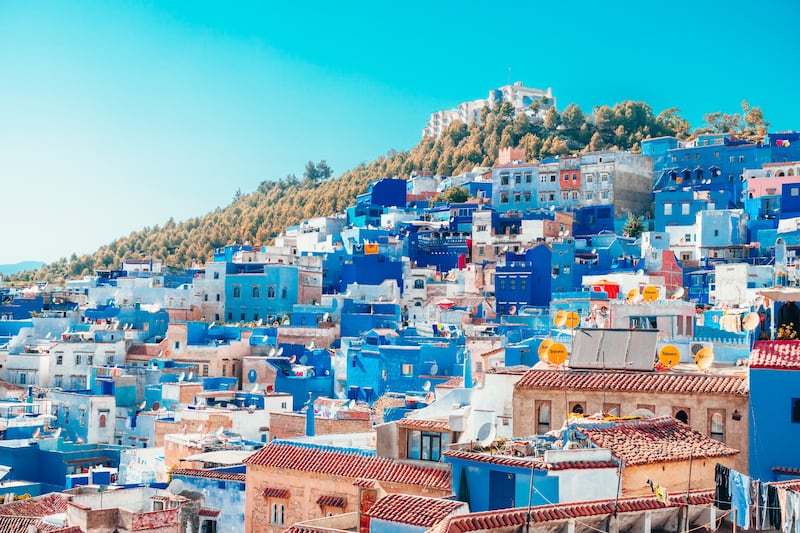
Morocco is welcoming travellers again from February 7. Unsplash

Famed for its bustling markets, colourful riads and rolling Saharan sand dunes, Morocco has reopened to tourists on Monday.
Fully vaccinated travellers can now visit, after the commercial flight ban was lifted.
It is the second time the kingdom will welcome travellers, having originally opened to visitors in June last year.
Five months later, the country closed its airspace because of the spread of the Omicron variant of Covid-19.
Now, with travel once again an option, visits to the Atlas Mountains , days on Essaouira's beaches and evenings wandering through Casablanca's diverse architecture are back on the cards.
Here’s what you need to know before you go.
Do I need to be vaccinated to visit Morocco?
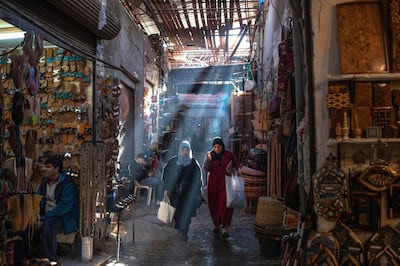
All travellers planning to visit Morocco must be fully vaccinated. The second dose of the vaccine must have been taken at least 14 days before travel.
There are 10 approved vaccines acceptable for travel to the kingdom, including Sinopharm. Children under 18 are exempt from vaccination before travel.
What do I need to do before I travel to Morocco?
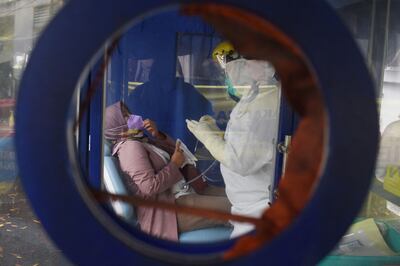
Before flying, travellers must fill out this passenger locator form and have a printed, signed copy of it to hand to authorities on arrival.
Travellers will also need to take a PCR test no more than 48 hours before flight departure time. Results need to be in English, Arabic or French.
Travellers aged 6 and older will have an antigenic test upon arrival in Morocco and some travellers may be asked to take a second PCR test at airports.
All arriving passengers should also expect to undergo temperature screening and some may be asked to take an additional test at their hotel or residence.
Children under 6 do not need to take a PCR before flying to Morocco.
Which airlines are flying to Morocco?
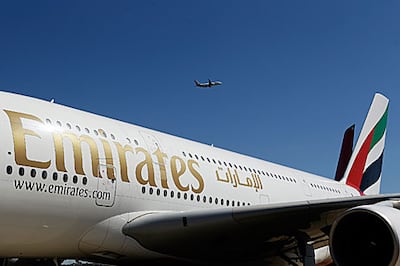
Emirates is restarting its passenger services to and from Casablanca on Tuesday, February 8.
The Dubai airline 's flights to the city will depart at 7.30am, arriving at 1.15pm. Return flights depart Casablanca at 3.05pm, arriving in Dubai at 1.30am the next day.
Economy fares for flights in February start from Dh4,500.
Etihad Airways , the national airline of the UAE, will also recommence flights to Casablanca. The Abu Dhabi airline will fly to and from the northern city from March 3, with return fares for flights in March starting from Dh1,885.
What restrictions are in place in Morocco?
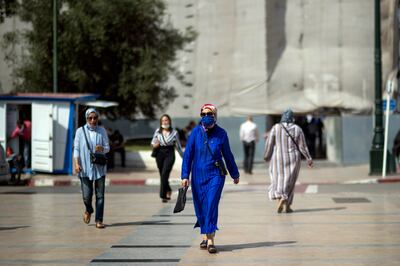
The kingdom of Morocco remains under a state of health emergency. This means there are limits on gatherings, with a maximum of 50 people and face masks in all public places are mandatory.
Hammams, public swimming pools, beaches and sports facilities are open, but have capacities capped at 5 per cent. Restaurants, cafes, shops and supermarkets must close by 11pm.
Travellers need a vaccine pass to enter most public places including hotels, restaurants, shops, etc. It’s important to note that penalties including fines and prison sentences are in place for those not following the rules.
When’s the best time to visit Morocco?
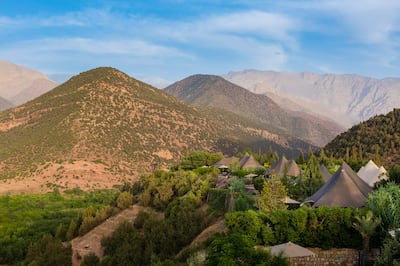
Parts of Morocco can be visited all year round, especially coastal regions and the Atlas Mountains. Spring and autumn are high season across much of the kingdom, as it's when temperatures are warm and pleasant.
If you're planning to fly to Casablanca, you can enjoy a Mediterranean summer with less hot temperatures than destinations in the south thanks to the city's cool Atlantic current.

Update April 12, 2024
Information for u.s. citizens in the middle east.
- Travel Advisories |
- Contact Us |
- MyTravelGov |
Find U.S. Embassies & Consulates
Travel.state.gov, congressional liaison, special issuance agency, u.s. passports, international travel, intercountry adoption, international parental child abduction, records and authentications, popular links, travel advisories, mytravelgov, stay connected, legal resources, legal information, info for u.s. law enforcement, replace or certify documents.
Before You Go
Learn About Your Destination
While Abroad
Emergencies
Share this page:
Travel Advisory July 13, 2023
Morocco - level 2: exercise increased caution.
Reissued with obsolete COVID-19 page links removed.
Exercise increased caution in Morocco due to terrorism .
Country Summary : Terrorist groups continue plotting possible attacks in Morocco. Terrorists may attack with little or no warning, targeting tourist locations, transportation hubs, markets/shopping malls, and local government facilities.
Read the country information page for additional information on travel to Morocco.
If you decide to travel to Morocco:
- Stay alert in locations frequented by tourists.
- Avoid demonstrations and crowds.
- Enroll in the Smart Traveler Enrollment Program (STEP) to receive Alerts and make it easier to locate you in an emergency.
- Follow the Department of State on Twitter and Facebook .
- Review the Country Security Report for Morocco.
- Visit the CDC page for the latest Travel Health Information related to your travel.
- Prepare a contingency plan for emergency situations. Review the Traveler’s Checklist .
Embassy Messages
View Alerts and Messages Archive
Quick Facts
Must have at least six months of validity at time of entry
One page required for entry stamp
Not required for stays under 90 days
None
Declare large quantities at entry
Export of Moroccan currency is prohibited
Embassies and Consulates
U.s. consulate general casablanca.
8 Boulevard Moulay Youssef, Casablanca, Morocco
Telephone: +(212) (522) 642-099
Emergency After-Hours Telephone: +(212)(661) 13-19-39
Fax: +(212) (522) 29-77-01
The normal work week in Morocco is Monday through Friday.
U.S. Embassy Rabat
KM 5.7, Avenue Mohammed VI Souissi, Rabat 10170, Morocco
Telephone: +(212)(537) 63-72-00
Emergency After-Hours Telephone: +(212)(661)13-19-39
Fax: +(212)(537) 63-72-01
Please note that U.S. Embassy Rabat does not offer consular services and does not have entry facilities for public visitors.
Destination Description
Learn about the U.S. relationship to countries around the world.
Entry, Exit and Visa Requirements
Passports and Visas:
- You must have a valid passport with at least one blank page.
- Visas are not required for visits lasting less than 90 days. Visit the Embassy of the Kingdom of Morocco website for the most current visa information.
- Overstays: If you remain in Morocco beyond 90 days without having requested an extension of stay, you will need to appear before a judge prior to departing Morocco. Please contact the immigration office at your local police station for details. Clearance may include the payment of a fine.
- Lost/Stolen Passports: Please obtain a police report for a lost or stolen passport in the area where the loss or theft occurred. Recently, police have required evidence of U.S. citizenship prior to issuing the report of loss. In these cases, U.S. citizens may visit U.S. Consulate General Casablanca to obtain a temporary emergency passport prior to obtaining a report of loss.
- Travelers who plan to reside in Morocco must obtain a residence permit, (Certificat d’Immatriculation) Applications should be submitted to the Bureau des Etrangers of the Prefecture de Police or Commissariat Central in major cities, and to the Gendarmerie in remote areas and villages. Please see Residency Permits section under the Local Laws & Special Circumstances tab.
- Carry a copy of your U.S. passport with you at all times to have proof of identity and U.S. citizenship readily available, if needed.
- Children who possess U.S. passports and who are born to a Moroccan father may experience difficulty leaving Morocco without the father's permission, even if the parents are divorced and the mother has legal custody. Under Moroccan law, these children are considered Moroccan citizens.
- U.S. citizen women married to Moroccans do not need their spouse's permission to leave Morocco.
HIV/AIDS: The U.S. Department of State is unaware of any HIV/AIDS entry restrictions for visitors to or foreign residents of Morocco.
Find information on dual nationality , prevention of international child abduction , and customs regulations on our websites.
Safety and Security
All countries in the region remain vulnerable to attacks from transnational terrorist organizations or individuals inspired by extremist ideology with little or no warning. The potential for terrorist violence against U.S. interests and citizens exists in Morocco. Long an important counterterrorism partner with the United States, Morocco’s capable security services have taken robust actions to guard against terrorist attacks. Moroccan authorities continue to disrupt groups seeking to attack U.S. or Western-affiliated and Moroccan government targets, arresting numerous individuals associated with international terrorist groups. Nevertheless, credible information indicates terrorist groups continue to plot potential attacks in the region, including Morocco. Lone wolf attacks are difficult to detect and disrupt and can occur without warning. In December 2018, two Scandinavian tourists were murdered by three Islamic State of Iraq and Syria (ISIS) supporters in the Imlil Mountains near Marrakesh. U.S. citizens are reminded to remain vigilant with regards to their personal security.
Establishments that are identifiable with the United States are potential targets for attacks. These may include facilities where U.S. citizens and other foreigners congregate, including clubs, restaurants, places of worship, schools, hotels, movie theaters, U.S. brand establishments, and other public areas. U.S. citizen campers should camp in guarded campgrounds rather than isolated campsites.
Demonstrations: Demonstrations occur frequently in Morocco, are typically focused on political or social issues, and are only rarely confrontational or violent.
- During periods of heightened regional tension, large demonstrations may take place in major cities.
- By law, all demonstrations require a government permit, but spontaneous unauthorized demonstrations, which have greater potential for violence, can occur. In addition, different unions or groups may organize strikes to protest an emerging issue or government policy.
- Travelers should be aware of current events in Morocco and stay informed of regional issues that could resonate in Morocco and create an anti-American response.
- Avoid demonstrations if at all possible.
- If caught in a demonstration, remain calm and move away immediately when provided the opportunity.
- Exercise increased vigilance in areas that attract large crowds, such as sporting events.
Western Sahara: From 1975 to 1991, Western Sahara was the site of armed conflict between Moroccan government forces and the POLISARIO Front, which continues to seek independence for the territory. Tensions along the border in Western Sahara heightened in November 2020 when Moroccan forces conducted an operation on the border to clear a blockade by the POLISARIO Front; both sides have since engaged in a low intensity conflict along the border. There are thousands of unexploded mines in the Western Sahara and in areas of Mauritania adjacent to the Western Saharan border. Exploding mines are occasionally reported and have caused death and injury. There have been instances in which U.S. citizens suspected of being participants in political protests or of supporting NGOs that are critical of Moroccan policies have been expelled from, or not been allowed to enter, Western Sahara.
Crime: Crime in Morocco is a serious concern, particularly in major cities and tourist areas.
- Use common sense and the same personal security measures you would normally use in a large U.S. city or tourist destination.
- Do not leave bags unattended. Keep them in sight and avoid placing passports, cash, cell phones, or other valuables in the outer pockets of backpacks or purses, or on tables in public places. Do not leave bags slung over the backs of chairs, on hotel or store counters, on top of your suitcase or larger travel bag, or out of your physical control in hotel lobbies, train stations, restaurants, and other public locations.
- Aggressive panhandling, pick-pocketing, purse-snatching, theft from unoccupied vehicles, and harassment of women are the most frequently reported issues.
- Criminals use weapons, primarily knives, during some street robberies and burglaries. These crimes have occurred at any time of day or night, not only in isolated places or areas less frequented by visitors, but in crowded areas as well.
- Residential break-ins also occur and have on occasion turned violent, but most criminals look for opportunities based on stealth rather than confrontation.
- Travelers should avoid soccer stadiums and their environs on days of scheduled matches as large groups of team supporters have been known to become unruly and harass and assault bystanders.
- Joggers should be mindful of traffic and remain in more heavily populated areas. It is always best to have a jogging companion, dress modestly, and avoid isolated areas or jogging at night.
- At night and when moving about unfamiliar areas, avoid traveling alone and utilize “petit” taxis which vary by color in the major cities (Casablanca-Red, Rabat-Blue, Marrakech-Tan, etc.).
- Taxis* in Morocco are generally crime-free during day time, although city buses are not considered safe.
- Trains are generally safe, but theft, regardless of the time of day, sometimes occurs.
- Avoid carrying large sums of cash and be particularly alert when using ATM machines. In the event you are victimized by crime or an attempted crime, please report the incident to the local police and the U.S. Consulate General in Casablanca as soon as possible.
* NOTE: Some popular web-based ride-sharing services have operated in Morocco; however, the French-based company Heetch is currently the only service legally authorized to operate by the Moroccan Government. Media report that drivers of web-based ride-sharing services have been harassed and assaulted by regular taxi drivers in the recent past.
Victims of Crime: U.S. citizen victims of crimes should contact the local police at 19 from a land line or 190 from a mobile phone, and the U.S. Consulate in Casablanca at (212) 522 64 20 99. Remember that the local authorities are responsible for investigating and prosecuting crimes. See our webpage on help for U.S. victims of crime overseas .
- help you find appropriate medical care;
- assist you in reporting a crime to the police;
- with written consent, contact your relatives or friends;
- explain the local criminal justice process in general terms;
- provide a list of local attorneys;
- provide information on victim’s compensation programs in the United States;
- provide an emergency loan for repatriation to the United States and/or limited medical support in cases of destitution;
- help you find accommodation and arrange flights home;
- replace a stolen or lost passport.
Tourism : The tourism industry is generally regulated in major tourist areas. Hazardous areas/activities are identified with appropriate signage and professional staff is typically on hand in support of organized activities. However, outside of these areas, the tourism industry is unevenly regulated, and safety inspections for equipment and facilities do not commonly occur. Hazardous areas/activities are not always identified with appropriate signage, and staff may not be trained or certified either by the host government or by recognized authorities in the field. In the event of an injury, appropriate medical treatment is typically available only in/near major cities. Outside of a major metropolitan center, it may take more time for first responders and medical professionals to stabilize a patient and provide life-saving assistance. U.S. citizens are encouraged to purchase medical evacuation insurance. See our webpage for more information on insurance providers for overseas coverage.
Local Laws & Special Circumstances
Criminal Penalties: You are subject to local laws. If you violate local laws, even unknowingly, you may be expelled, arrested, or imprisoned. In some places you may be taken in for questioning if you don’t have your passport with you.
Furthermore, some laws are also prosecutable in the U.S., regardless of local law. For examples, see our website on crimes against minors abroad and the Department of Justice website.
Arrest Notification : If you are arrested or detained, ask police or prison officials to notify the U.S. Consulate immediately. See our webpage for further information.
- Crimes of fraud, including passing bad checks, non-payment of bills (including hotel bills), or breach of contract are considered serious in Morocco and can often result in imprisonment and/or fines.
- Bail generally is not available to non-residents of Morocco who are arrested for crimes involving fraud.
- Debtors can be held in prison until their debts are paid or until an agreement is reached between the parties.
- Passports may be seized by the Moroccan government to guarantee that debtors settle their cases.
- Debtors may be unable to work in Morocco without passports while still being held responsible for their debts.
- Prior to entering into a contract, you may want to consider consulting an attorney.
Faith-Based Travelers : Islam is the official religion in Morocco. However, the constitution provides for the freedom to practice one's religion. The Moroccan government does not interfere with public worship by the country’s Jewish minority or by expatriate Christians. Proselytizing is, however, prohibited. In the past, U.S. citizens have been arrested, detained, and/or expelled for discussing or trying to engage Moroccans in debate about Christianity. In February 2014, several U.S. citizens were expelled from Morocco for alleged proselytizing. Many of those expelled were long-time Moroccan residents. In these cases, U.S. citizens were given no more than 48 hours to gather their belongings or settle their affairs before being expelled. See the Department of State’s International Religious Freedom Report .
LGBTI Travelers: Consensual same-sex sexual relations are criminalized in Morocco. Penalties include fines and jail time. See our LGBTI Travel Information page and section 6 of our Human Rights report for further details.
Travelers Who Require Accessibility Assistance: While in Morocco, individuals with disabilities may find accessibility and accommodation very different from what is customary in the United States.
Students: See our Students Abroad page and FBI travel tips .
Women Travelers : Women walking alone in certain areas of cities and rural areas are particularly vulnerable to assault by men. They should exercise caution when in public spaces, including nightclubs or other social establishments. Women are advised to travel with a companion or in a group when possible and to ignore any harassment. See our tips for Women Travelers .
Customs: Travelers must declare large quantities of U.S. dollars brought into the country at the port of entry. The export of Moroccan currency (dirhams) is prohibited; however, Moroccan currency can be converted back into U.S. dollars prior to departure only if the traveler has a bank or money transfer receipt indicating he or she exchanged dollars for dirhams while in Morocco.
Moroccan customs authorities may enforce strict regulations concerning temporary importation into or export from Morocco of items such as firearms, unmanned aerial vehicle (UAV) or drones, religious materials, antiquities, business equipment, and large quantities of currency. It is advisable to contact the Embassy of Morocco in Washington, D.C., or the Moroccan Consulate General in New York for specific information concerning customs requirements.
Please see our information on Customs and Import Restrictions.
Citizenship : The Government of Morocco considers all persons born to Moroccan fathers to be Moroccan citizens. In addition to being subject to all U.S. laws, U.S. citizens who also possess the nationality of Morocco may be subject to other laws that impose special obligations on citizens of Morocco. Recently, Morocco has begun allowing Moroccan mothers of children born outside Morocco to petition for their children’s citizenship. For further information on that process, please contact the Embassy of Morocco in Washington, D.C., or the Moroccan Consulate General in New York .
Residency Permits: In order to obtain a residence permit, travelers must present (among other requirements) a criminal history record check. This record check can only be obtained in the United States. The U.S. Consulate and Embassy are unable to take fingerprints to send for FBI record requests. For specific information, individuals seeking residency should visit their local police station.
The following documents must accompany a residency renewal application:
- Birth Certificate
- Copy of the current passport
- Copy of the current Moroccan residency card
- Medical certificate from a doctor stating that the requester is free from any contagious disease
- Court record (Casier Judiciaire) obtained from the Ministry of Justice in Rabat
- 100 MAD stamp
Individuals planning on residing in Morocco or relocating to the U.S. may be asked to provide a notarized change of residence form. This form is available at the U.S. Consulate by appointment.
Sending Passports through the Mail: According to Moroccan law, it is prohibited to send passports by mail across international borders. Passports sent to or through Morocco via Fedex, DHL, or other courier will be confiscated by Moroccan authorities. Confiscated U.S. passports are eventually sent to the U.S. Consulate General in Casablanca after being processed by the Ministry of Foreign Affairs. If your passport has been confiscated, you can contact the American Citizens Services section at [email protected] to ask if it has been received.
Property: U.S. consular officers are prohibited by law and regulation from accepting personal property for safekeeping regardless of the circumstances involved. If there is concern over the protection of property left behind in Morocco due to confiscation or deportation for political, legal, or other reasons, U.S. citizens should take every precaution to ensure that available legal safeguards are in place either before, or immediately after, purchasing property in Morocco or taking up residence there. U.S. citizens are also encouraged to consider assigning a Power of Attorney, or Procuration, to be used in Morocco if necessary. More information and sample Power of Attorney forms are available on the Consulate General of the Kingdom of Morocco in New York website.
Photographing Sensitive Locations: Taking photographs of anything that could be perceived as being of military or security interest may result in problems with the authorities. As a general rule, travelers should not photograph palaces, diplomatic missions, government buildings, or other sensitive facilities and when in doubt should ask permission from the appropriate Moroccan authorities.
Professional Basketball in Morocco: The U.S. Consulate General in Casablanca is aware that there are local professional basketball teams who have made contracts with U.S. citizens to play on Moroccan teams. Some of these players have subsequently claimed they were not paid as stipulated per the terms of the contract. Individuals considering playing basketball professionally in Morocco may wish to consult with a lawyer regarding the terms of their contract prior to signing. A list of lawyers can be found on the Embassy's webpage.
Adequate medical care is available in Morocco’s largest cities, particularly in Rabat and Casablanca, although not all facilities meet Western standards.
- Emergency and specialized care outside the major cities is far below U.S. standards and may not be available at all.
- Most medical staff will have limited or no English-speaking ability.
- Most ordinary prescription and over-the-counter medicines are widely available.
- Specialized prescriptions may be difficult to fill and availability of all medicines in rural areas is unreliable.
- Travelers should not ask friends or relatives to send medications through the mail, FedEx, or UPS since Moroccan customs will impound the delivery and not release it to the recipient.
- Travelers planning to drive in the mountains and other remote areas may wish to carry a medical kit and a Moroccan phone card for emergencies.
- In the event of vehicle accidents involving injuries, immediate ambulance service is usually not available. The police emergency services telephone number is “190” (see Traffic Safety and Road Conditions section below).
The U.S. Mission in Morocco is unable to pay your medical bills. Be aware that U.S. Medicare does not apply overseas.
Medical Insurance: Make sure your health insurance plan provides coverage overseas. Most care providers overseas only accept cash payments. You may also be required to pay a deposit before being admitted for treatment. See our webpage for more information on insurance providers for overseas coverage . We strongly recommend supplemental insurance to cover medical evacuation.
If traveling with prescription medication, check with the Government of Morocco Ministry of Foreign Affairs to ensure the medication is legal in Morocco. Always carry your prescription medication in original packaging, along with your doctor’s prescription.
Vaccinations: Be up-to-date on all vaccinations recommended by the U.S. Centers for Disease Control and Prevention.
Further health information:
- World Health Organization
- U.S. Centers for Disease Control and Prevention (CDC)
Travel and Transportation
Road Conditions and Safety: Traffic accidents are a significant hazard in Morocco. Driving practices are very poor and have resulted in serious injuries to and fatalities of U.S. citizens. This is particularly true at dusk during the Islamic holy month of Ramadan, when adherence to traffic regulations is lax, and from July to September when Moroccans resident abroad return from Europe by car in large numbers.
- Drivers should exercise extreme caution when driving at night due to poor lighting systems along roads.
- Traffic signals do not always function, and are sometimes difficult to see.
- Modern freeways link the cities of Tangier, Rabat, Fez, Casablanca, and Marrakesh. Two-lane highways link other major cities.
- Secondary routes in rural areas are often narrow and poorly paved. Roads through the Rif and Atlas mountains are steep, narrow, windy, and dangerous.
- Pedestrians, scooters, and animal-drawn conveyances are common on all roadways, including the freeways, and driving at night should be avoided if possible.
- During the rainy season (November - March), flash flooding is frequent and sometimes severe, washing away roads and vehicles in rural areas.
Traffic Laws: In the event of a traffic accident, including accidents involving injuries, the parties are required to remain at the scene and not move their vehicles until the police have arrived and documented all necessary information. The police emergency services telephone number is “190”. Often Moroccan police officers pull over drivers for inspection within the city and on highways.
Traffic Fines: Confiscation of a driver’s license is possible if a violator is unable or unwilling to settle a fine at the time of a traffic stop.
If you are stopped for a speeding violation, you have the right to request the video footage documenting the infraction. Once the speeding violation is confirmed, you have three options:
- Pay the fine on the spot and obtain a receipt of payment;
- Pay at the local city’s treasury (La Perception). The police/gendarme officer will issue you a ‘ticket’ indicating the amount of the fine and keep your driver’s license until you pay the fine.
- Should you wish to contest a violation, you may file a complaint at court; however, Moroccan authorities may keep your driver’s license and vehicle registration while this lengthy process takes place.
Foreign driver’s licenses are valid for use in Morocco for up to one year. After that, foreign residents must pass the Moroccan driver’s test and obtain a Moroccan driver’s license. The test is conducted in Arabic and French. Speakers of other languages are allowed to have a sworn translator with them when taking the test.
Public Transportation: While public buses and taxis are inexpensive, driving habits are poor, and buses are frequently overcrowded. City buses are not considered safe. The train system has a good safety record. Trains, while sometimes crowded, are comfortable and generally on time. See our Road Safety page for more information. Visit Morocco’s National Tourism website for additional information.
- Train Station Hotline: 0890 20 30 40
- Bus Station Hotline: 0800 09 00 30
- Directory Enquiry- 160
Web-based ride-sharing services are not legal in Morocco; however, some well-known companies (UBER and Careem) have attempted operations with limited success. Media reports of ride-sharing drivers being harassed and assaulted by regular taxi drivers were common.
Aviation Safety Oversight: The U.S. Federal Aviation Administration (FAA) has assessed the Government of Morocco’s Civil Aviation Authority as being in compliance with International Civil Aviation Organization (ICAO) aviation safety standards for oversight of Morocco’s air carrier operations. Further information may be found on the FAA’s safety assessment page .
Maritime Travel: Mariners planning travel to Morocco should also check for U.S. maritime advisories and alerts at www.marad.dot.gov/msci . Information may also be posted to the U.S. Coast Guard homeport website (https://homeport.uscg.mil), and the NGA broadcast warnings website https://msi.nga.mil/NGAPortal/MSI.portal (select “broadcast warnings”).
For additional travel information
- Enroll in the Smart Traveler Enrollment Program (STEP) to receive security messages and make it easier to locate you in an emergency.
- Call us in Washington, D.C. at 1-888-407-4747 (toll-free in the United States and Canada) or 1-202-501-4444 (from all other countries) from 8:00 a.m. to 8:00 p.m., Eastern Standard Time, Monday through Friday (except U.S. federal holidays).
- See the State Department’s travel website for the Worldwide Caution and Travel Advisories .
- Follow us on Twitter and Facebook .
- See traveling safely abroad for useful travel tips.
Review information about International Parental Child Abduction in Morocco . For additional IPCA-related information, please see the International Child Abduction Prevention and Return Act ( ICAPRA ) report.
Travel Advisory Levels
Assistance for u.s. citizens, morocco map, learn about your destination, enroll in step.

Subscribe to get up-to-date safety and security information and help us reach you in an emergency abroad.
Recommended Web Browsers: Microsoft Edge or Google Chrome.
Check passport expiration dates carefully for all travelers! Children’s passports are issued for 5 years, adult passports for 10 years.
Afghanistan
Antigua and Barbuda
Bonaire, Sint Eustatius, and Saba
Bosnia and Herzegovina
British Virgin Islands
Burkina Faso
Burma (Myanmar)
Cayman Islands
Central African Republic
Cote d Ivoire
Curaçao
Czech Republic
Democratic Republic of the Congo
Dominican Republic
El Salvador
Equatorial Guinea
Eswatini (Swaziland)
Falkland Islands
France (includes Monaco)
French Guiana
French Polynesia
French West Indies
Guadeloupe, Martinique, Saint Martin, and Saint Barthélemy (French West Indies)
Guinea-Bissau
Isle of Man
Israel, The West Bank and Gaza
Liechtenstein
Marshall Islands
Netherlands
New Caledonia
New Zealand
North Korea (Democratic People's Republic of Korea)
Papua New Guinea
Philippines
Republic of North Macedonia
Republic of the Congo
Saint Kitts and Nevis
Saint Lucia
Saint Vincent and the Grenadines
Sao Tome and Principe
Saudi Arabia
Sierra Leone
Sint Maarten
Solomon Islands
South Africa
South Korea
South Sudan
Switzerland
The Bahamas
Timor-Leste
Trinidad and Tobago
Turkmenistan
Turks and Caicos Islands
United Arab Emirates
United Kingdom
Vatican City (Holy See)
External Link
You are about to leave travel.state.gov for an external website that is not maintained by the U.S. Department of State.
Links to external websites are provided as a convenience and should not be construed as an endorsement by the U.S. Department of State of the views or products contained therein. If you wish to remain on travel.state.gov, click the "cancel" message.
You are about to visit:

Morocco Travel Guide
Your ultimate morocco travel guide, with tips, things to do, and best things to see in morocco. great for first-time and returning travelers..
Morocco is a fascinating multicultural country blended from African, Arab and European influences.
It is our closest link to the continent of Africa and a diverse holiday destination.
The country offers an incredible amount of history, culture, art, and music along with a fascinating geographical landscape incorporating the Sahara desert, the snow-capped Atlas Mountains and the Atlantic coastline.
This Morocco trave l guide will help you plan your next vacation.
Popular Guides
- Moroccan Foods
- 5 Things to See in Morocco
Our Highlight
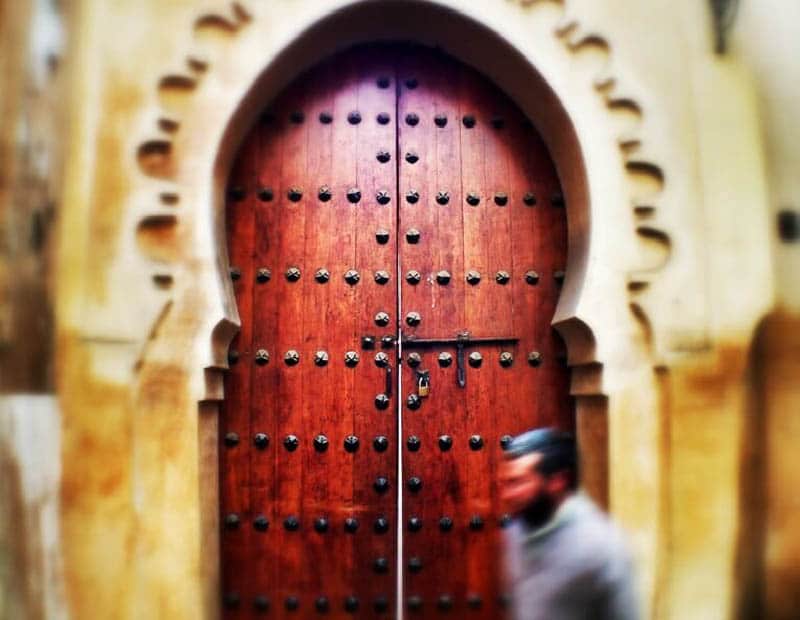
Table of contents
Table of Contents
Fast Facts about Morocco
- Moroccan power voltage is 127/220 V 60 Hz; Power sockets C & E
- The local currency is the Moroccan Dirham (MAD) and is around 9.50 MAD to 1 USD
- In the north of Morocco, visitors will find the Spanish enclaves of Ceuta and Melilla, claimed by Morocco and considered by the Moroccan state to be “occupied territory.”
- In these two towns, the main currency is the euro.
- Tipping is a way of life in Morocco; almost any service can warrant a tip so make sure to bring small bills.
- Haggling is also a way of life in Morocco.
- NEVER pay the asking price, vendors often double or even triple the prices of an item to allow some wiggle room through the haggling process.
- If you are not Muslim, you are not allowed in many of the mosques. Exceptions include the partially restored Almohad structure of Tin Mal in the High Atlas, the similarly disused Great Mosque at Smara in Western Sahara, the courtyard of the sanctuary-mosque of Moulay Ismail in Meknes and the Hassan II Mosque in Casablanca.
- Moroccan laws towards alcohol are quite liberal however drinking alcohol in public places is not recommended. During Ramandan, try to avoid drinking, eating or smoking in public during the hours of fasting.
- SIM Cards :
Things to See and Do in Morocco
- Enjoy a Four-Wheeling Adventure – join the guides of Dunes Desert Exploration and take a three hour tour in the desert on your very own dune buggy or quad bike.
- Surf’s up – Taghazout is a small fishing village 19 km north of the city of Agadir in the southwest of Morocco and houses some of the country’s best surf spots. It is nestled amongst a set of small bays just south of the legendary surf breaks of Anchor Point, Killers, and Mysteries.
- Go to a Hammam – A Hammam is a hot steam bath followed by a massage. Sounds simple enough doesn’t it? It definitely can be quite the experience!
- Visit Fes – Fes is the oldest city in the country and the Medina (or Fes el-Bali) is a World Heritage site. Fez is also famous for its leather products and most of it comes from the leather bazaar (souq). The souq is home to three ancient leather tanneries, the largest and oldest being the Chouara Tannery, which is almost a thousand years old.
- Take a cooking course – learn how to cook traditional Morrocans dishes from a gourmet chef while enjoying great conversations, appetizers and tea.
- Watch the sun rise on a Merzouga morning – to experience a desert sunrise is an unforgettable experience and the best place to do so is at the Merzouga sand dunes of Erg Chebbi
- Take in the colors of the Dades Gorge – There is nothing in the world quite like the Dades Valley. The mineral-rich Dades Gorge sparkles in many hues of blue and green as well as white and red.
- Spend a day in Jemaa el Fna in Marrakech – one of the main cultural spaces in Marrakech, this square has become one of the symbols of the city.
Morocco Travel Guides
- Top 5 Things You Must See in Morocco
- Things to Do in Marrakech – Practical Travel Tips and Where to Stay
- Etiquette in the Middle East- Travel for Men and Women
Accommodation
Budget: You can find a variety of hostels from 53-175 MAD per night. Enjoy dorms or private rooms, free breakfast, hot showers, and central locations to nearby tourist destinations. The Riad Verus in Fes even offers free Arabic classes.
Mid-Range: For mid-range, expect to pay around 380-860 MAD per night. These hotels come with a hotel restaurant and bar, rooms with flat-screen TVs and free Wi-Fi, a swimming pool, and room service.
High-End: For five-star hotels, you will pay around 860-4,100 MAD per night.Take in the best withspa services, fine dining, swimming pools with lounge areas, refined private suites with living rooms, a fitness center, and an airport shuttle.
Moroccan cuisine has a variety of influences, including Arabic, Berber, Mediterranean, and Andalusian cuisine, among others. Staples include fruits, vegetables, meat (beef, goat, lamb, and mutton), seafood, grapes, olive oil, and spices.
Couscous is a popular dish and is often served with meat or vegetables. Morocco also has a vibrant street food scene, where you can sample dishes like harira (a soup made from tomatoes, lentils, chickpeas, lamb, rice, and spices such as cinnamon) or merguez (minced beef or lamb sausages served in flatbread). There are sit-down restaurants as well where you can try more of Morocco’s cuisine. In total, expect to pay around 120 MAD per day for food. Read our full article 13 Delicious Moroccan Foods to Eat When Visiting Morocco
The Best Ways to Get Around Morocco
Getting to morocco:.
Flights: Morocco has 25 airports, but the main airport to fly into is the Mohammed V International Airport, located 15.5 miles from the city center of Casablanca. Another popular airport is Marrakesh Menara International Airport (4.6 miles from downtown Marrakesh), but the flights are mostly from Europe. You can check for the best flights to Morocco on Skyscanner .
Transportation:
Buses : Buses are good for traveling between cities. For more local trips between towns, expect to pay 3-5 MAD, or to go between cities, expect to pay between 210-340 MAD. A bus trip from Casablanca to Marrakesh, for example, will cost about 210 MAD.
Car Rental: To rent a car, you need to be at least 18-21 years old with a U.S. driver’s license that you have held for 1-2 years. Car rental prices start at 450 MAD per day for drivers 25 and older.
Taxis: Taxis are another way to get around. There are two types of taxis in Morocco: Petit and Grand. Petit taxis can seat up to 3 passengers, are metered, and only travel in the city, while Grand can seat up to and travel outside of a city. Grand taxis tend to have a fixed rate of 10.5 MAD for in-city travel.
Uber: Uber is not available at the time.
When to go To Morocco
For cheaper hotel rates and fewer crowds, visit Morocco during the shoulder seasons of April-May and September-November. The fall season in particular is a great time for hiking.
During the summer months of June-August, temperatures can get very hot, especially the closer you are to the Sahara, while winter months see more rainfall, which can dampen outdoor activities.
Where to Stay in Morocco
Hotel Moroccan House Casablanca : When in Casablanca, stay in this beautifully decorated hotel. Featuring traditional Moroccan-styled rooms, amenities include massage services, a restaurant, a hammam, and breakfast. For those who want to explore more of Casablanca, the tram station is just a 3-minute walk away.
Riad Rcif: Come stay in a restored 14 th -century palace at this unique hotel in Fes. Featuring colorfully decorated hotel rooms with artwork and glass-stained windows, the hotel also comes with a restaurant, a roof terrace with great views of the city, room service, and free breakfast. The Ibn Danan Synagogue is just 1.5 miles away.
ibis Marrakech Centre Gare Hotel: Just a short trip to Jemaa el-Fnaa square, Majorelle Garden, and the Koutoubia Mosque, this popular hotel in Marrakesh is a great place to stay. Swim in the outdoor pool while enjoying the surrounding gardens, watch TV in your hotel room, get drinks anytime at the 24-hour bar, order room service, or dine at the hotel restaurant.
Check out our favorite booking platforms Booking.com , Tripadvisor and VRBO for the best deals on accommodation.
What to Pack for Morocco
Morocco is about the size of France with coasts upon the Atlantic and the Mediterranean Sea and has an arid climate .
The coastal regions generally have a Mediterranean climate, however as travelers move further inland the conditions can become more extreme and elevation can play a role in the changeable weather conditions.
Morocco is also a Muslim country
- Modesty is respected and travellers are expected to follow the country’s etiquette. In villages and small towns, and even in the medinas of large cities, many women still wear the veil and the street is seen as strictly the man’s domain.
- Women travelers should avoid wearing revealing clothes, like short shorts, low cut shirts or thin-strapped blouses.
- Sarongs – I think we have sarongs in every packing list. From covering up when visiting mosques, being used as a towel or keeping cool on a hot night.
- Pack loose clothing with breathable fabric – cover up with fabric you know will breathe, especially if you plan on heading into the Sahara desert or to one of the coastal regions.
- Tunics are a great option as they can be dressed up or down, are lightweight and offer good coverage.
- Footwear – Pack a pair of lightweight, durable and comfortable shoes. Moroccan streets can be dusty and unclean so if you are uncomfortable with the idea of getting your little piggies dirty then opt for closed-toe shoes instead of sandals/flip flops.
- Kleenex / toilet paper – it is quite common that restaurant restrooms do not offer toilet paper to patrons, so make sure you are prepared.
- Also, don’t be surprised if you encounter squat toilets!
See our packing tips: packing list for smart travel
And see our Etiquette Tips for Travel to the Middle East
Morocco Travel Guide: Best Booking Resources
Whenever we travel to we make sure to start with these companies. We have tried a lot of different ones over the years and all of these have consistently proven to be the best when it comes to offering great prices.
We have used every one of these personally and continue to do so.
- Booking.com : This is our go site to when comparing prices for accommodation. It usually has the cheapest prices, especially in Europe and we love their interface. Not to mention you get free cancellation and you are guaranteed the best price.
- Trip Advisor : What we like about Trip Advisor is that we can look at all the reviews and then book our accommodation. TripAdvisor is where we go when we want to compare prices with multiple accommodation providers.
- VRBO : is the main search engine we use when we are looking for a home or apartment rental. It can sometimes be cheaper than hotels and it is the best way to stay in areas that offer a more local feel.
- Hostelworld : With one of the largest databases of hostels in the world, Hostelworld is the go-to site when you are looking for budget accommodation.
- Skyscanner : This is the first place we check for flights. It consistently comes back with the cheapest and best options. It allows us to compare a lot of airlines to get the best price.
- Rome 2 Rio : If you want to see how to get somewhere by plane, train, bus, ferry or car Rome2Rio lays it all out for you as well as related costs.I love how they show it all to you on a Google Map and it works offline.
- Get Your Guide: For all your day trip and city guide needs, we use Get Your Guide. It has the world’s largest collection of things to do with more than 30,000 activities in 7500 destinations.
- World Nomads Insurance: When traveling to Italy you should always have travel insurance. We have found the best bang for your buck is by far World Nomads.
Morocco Travel Guide: Related Articles
To browse all our articles and guides about Morocco click here.
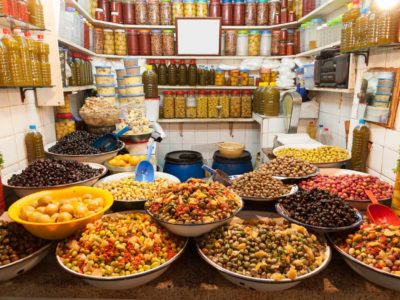
Traditional Moroccan Food to Eat in Morocco or At Home
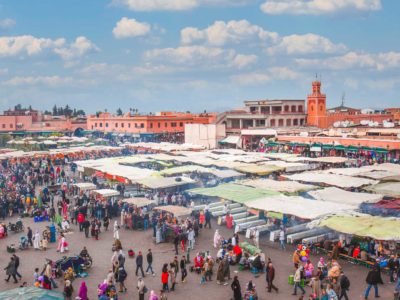
22 Best Things to Do in Marrakech, Morocco
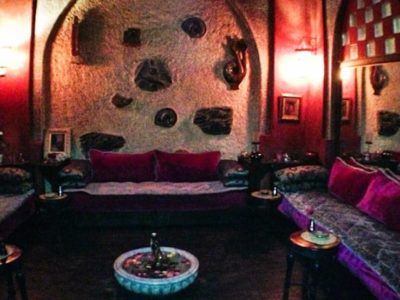
Hammam Spa Tips – Our Surreal Moroccan Massage Experience

- Jan 31, 2023
Morocco: The Ultimate Travel Guide (Best Places To Visit + Itineraries)
Morocco is located in the northwest corner of Africa. Thanks to its stunning landscapes, colorful cities, year-round pleasant weather, and unique cuisine, Morocco is a popular travel destination. And although the country is rapidly modernizing, it still retains much of its ancient architecture and even more of its traditional customs. In this article, we’ll highlight the most important things to know before going, the 10 best places to visit in Morocco, and some itineraries we recommend.

Check out our video on Morocco to see the best places to visit through our camera!
Table Of Contents
Important things to know.
Best Places To Visit In Morocco + map
Proposed Morocco Itineraries
Tips to save money and other resources
Best time to travel to Morocco
The best time to visit Morocco is from April until June and from September until November . In these months, you will have good weather and not too many tourists. Keep in mind that at the beginning of spring and at the end of autumn, rain is not unusual.
Cost and currency
Overall, Morocco is very affordable . Accommodation, food, and tourist attractions are often way cheaper than other popular travel destinations. In Morocco, they use the Moroccan Dirham , so if you plan on going, keep an eye on the exchange rates to save more money.
Safety in Morocco
Morocco is a safe country to travel to as long as you understand its laws and cultural customs , and adhere to the status quo. Its crime rates are relatively low but be aware of scam artists and pickpockets which are common in Morocco, especially in the cities! Also watch out for people trying to sell you drugs, which is more common in northern Morocco.
Morocco Travel Tips
1. First, we only recommend driving a rental car if you’re comfortable with long distances . There are also a large number of police checkpoints and we got multiple fines during our road trip.
2. Second, we recommend spending more time in nature rather than in the chaotic cities , like Marrakech or Fez. Cities have a reputation for people who offer a service you haven’t requested which can be exhausting at times.
3. Finally, the WiFi connection was poor when we were there. So it’s best to get a SIM card upon arrival , which is fairly cheap (around 200 dirham - to be paid in cash - for 20GB). Maroc Telecom or INWI sim cards are the preferred ones with best coverage.
Best Places To Visit In Morocco
We'll now highlight 10 of the best places to visit in Morocco.
If you're traveling to Morocco and want to save time searching for directions to all of the places we mention in this article, then look no further than our custom map. Simply click on a point in the map below to get directions there for yourself!
Located in northern Morocco, Fez is one of the most ancient cities in Morocco . Rich in culture, traditions, and history, Fez is often referred to as the country’s cultural capital. Spend a day or two exploring the chaotic medina that is filled with madrasas, palaces, residences, mosques, and other structures that date back to as early as the 9th century. A good way to do this is by taking a guided tour of the medina . But also make sure to venture outside the old town to see what Fez has developed into today. If you're interested in visiting Fez, make sure to check out our blog with everything you need to know about Fez .

9. Essaouira & the Atlantic Coast
At number 9 we have Essaouira , a bohemian city situated along the Atlantic Coast. Known as the windy city of North Africa, lots of surfers, kitesurfers, and windsurfers find their way here. But visitors also enjoy strolling through the fortified medina , walking along the beach boulevard , or simply relaxing at the hotel. But if you’re looking for sunbathing and swimming, you might want to look at other beach destinations along the Atlantic Coast, such as Agadir , Oualidia , Asilah, Taghazout .
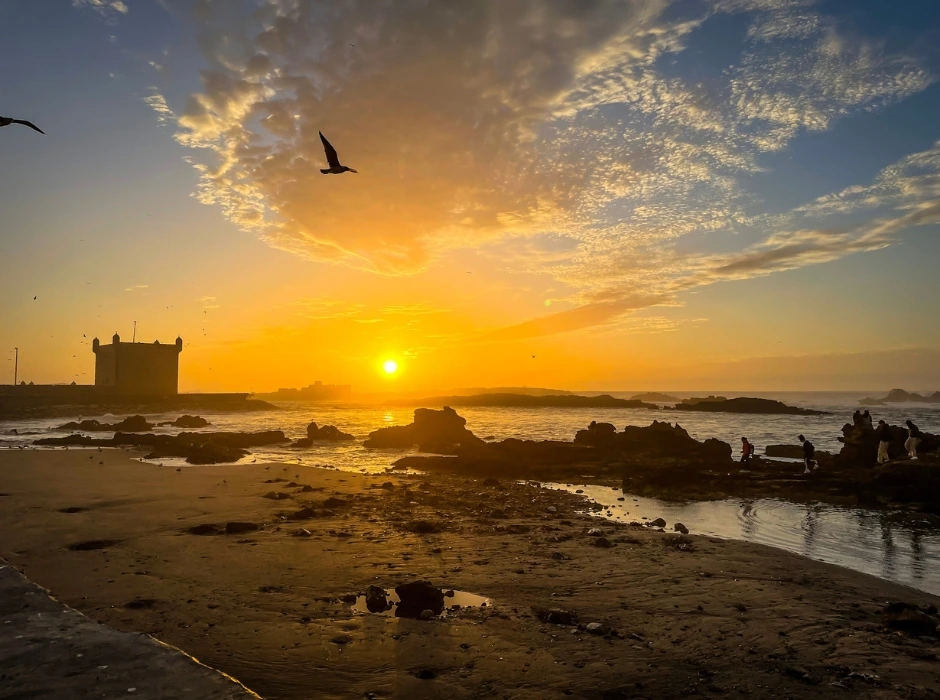
8. Dades Valley
Another beautiful place to visit in Morocco is Dades Valley . Located in the south, it’s often nicknamed the “Valley of a Thousand Kasbahs” because this valley is dotted with palm trees and mudbrick palaces . But what makes the landscape really unique is its red rock formations and the serpentine road at the end of the gorge. It’s best to take in this incredible scenery by driving through the valley and making a few photo stops. If you have more time, we recommend hiking to the “monkey fingers” trail .
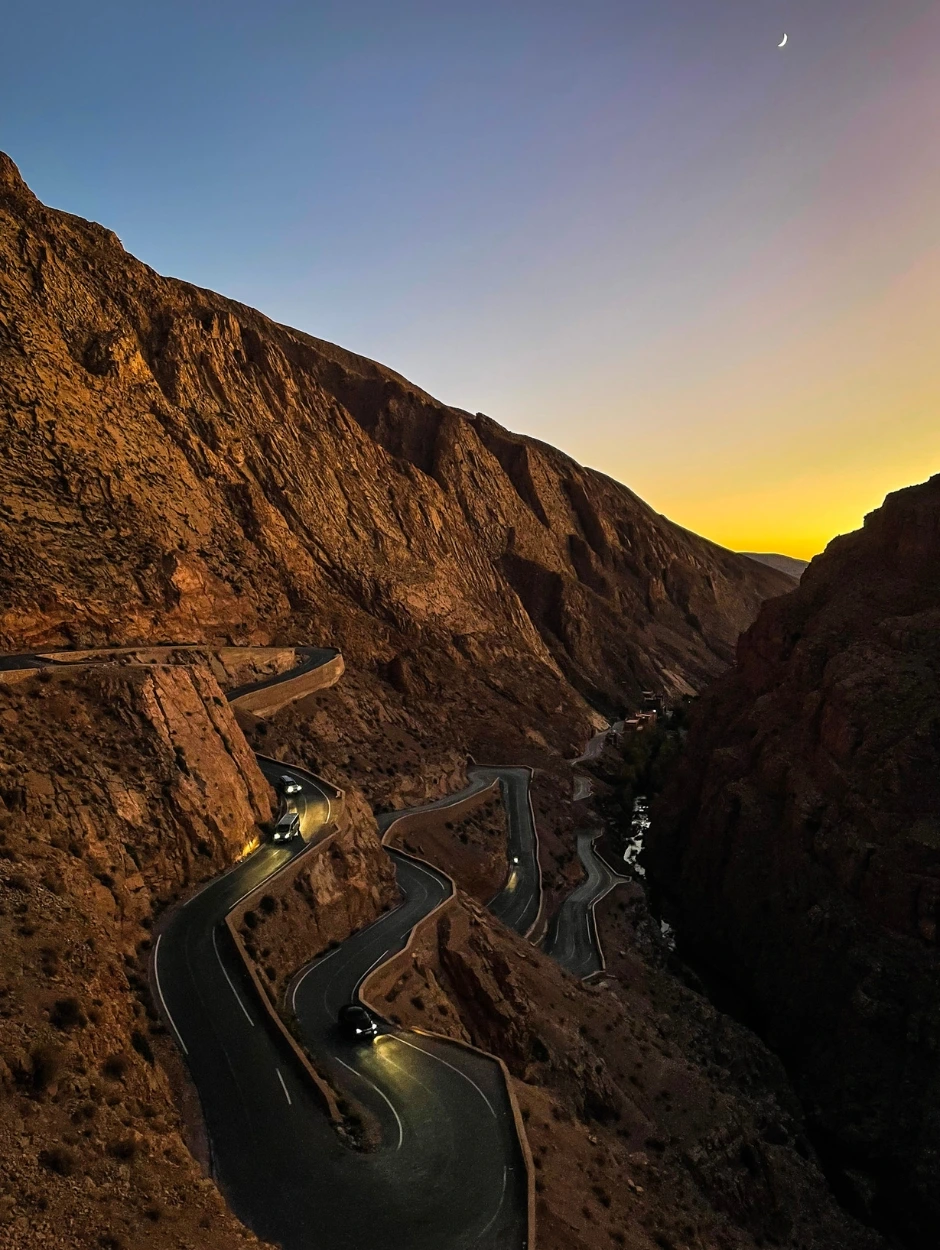
7. Chefchaouen
At number 7 we have the small town of Chefchaouen, set amidst the Rif Mountains in the northwest of Morocco. It’s also nicknamed the “Blue City” because of picturesque streets filled with houses painted in different shades of blue. And while it’s still a mystery as to why all the houses are painted blue, it’s a fun experience to simply walk around and get lost in the alleyways. Apart from that, there are also some other interesting places worth a visit, including the Spanish Mosque for sunset , the washing stations of Ras el Ma , and the Kasbah Museum . Learn more about this intriguing city in our other blog about the best things to do in Chefchaouen .

6. Marrakech
The most popular place to visit in Morocco is undoubtedly the bustling city of Marrakech , located in the center of the country. There’s something for everyone here: whether you like to enjoy the diverse food scene , explore the historic palaces and sights, or stroll around the peaceful gardens . Start your journey at the Jemaa el-Fna square in the heart of the city. Most tourist attractions are within walking distance from here. But if you want to learn more about the local life and city history, we highly recommend going on a guided walking tour of the medina . For more information check out our blog about the best things to do in Marrakech .
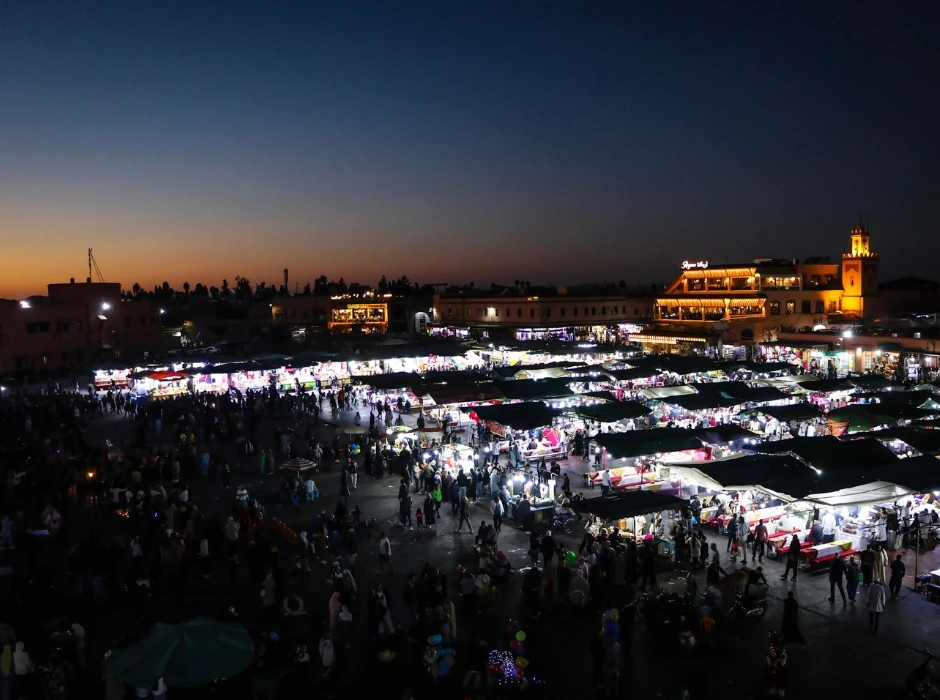
5. Ouzoud Waterfalls
Located 160 kilometers or 100 miles to the east of Marrakech, the Ouzoud Waterfalls are a true escape from the hustle and bustle of the city. With a height of 110 meters or 360 feet, these are the tallest and most spectacular waterfalls in Morocco. We visited this beautiful place as a day trip from Marrakech, which allowed us to spend about 4 hours at the falls. This tour included a guided walk down to the base of the falls with plenty of time to take in the beauty. We also encountered some monkeys along the way who inhabit this area! Overall, we really enjoyed this day tour and would definitely recommend it when you're in Marrakech. However, be aware that this place can get very busy during the high season.
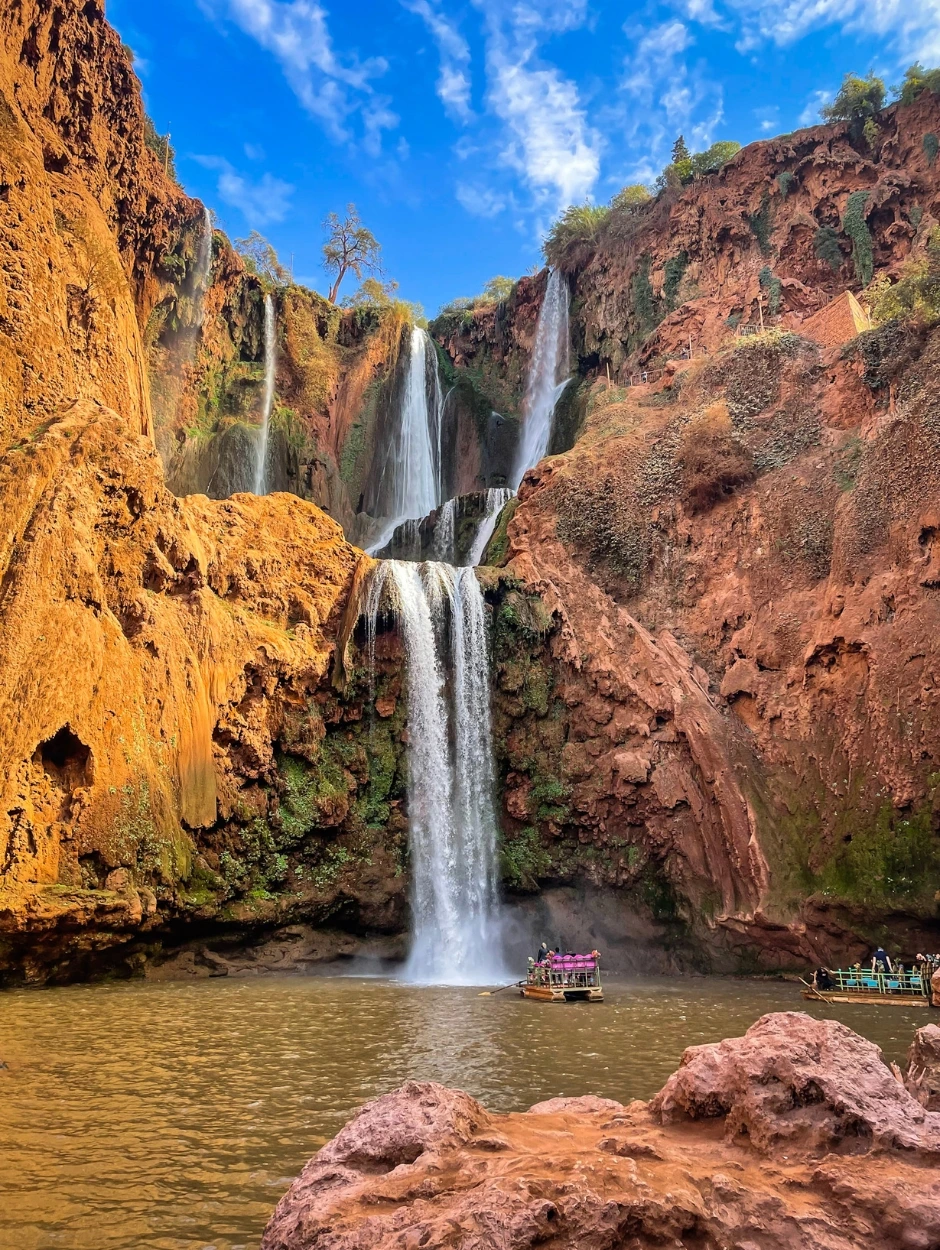
4. Todra Gorge
Running parallel to Dades valley, Todra Gorge is another beautiful natural sight to see in Morocco. Here, a river carved its way through the orange limestone for centuries. As a result, canyon walls reach over 400 meters or 1300 feet high in some places. There are many ways to enjoy the gorge, whether you are an avid hiker, rock climber, mountain biker , or you prefer to simply e njoy the scenery and soak up the culture . We did a half day hike into the canyon and over its rocky walls, which we really enjoyed. We even spotted some nomadic camps along the trail.
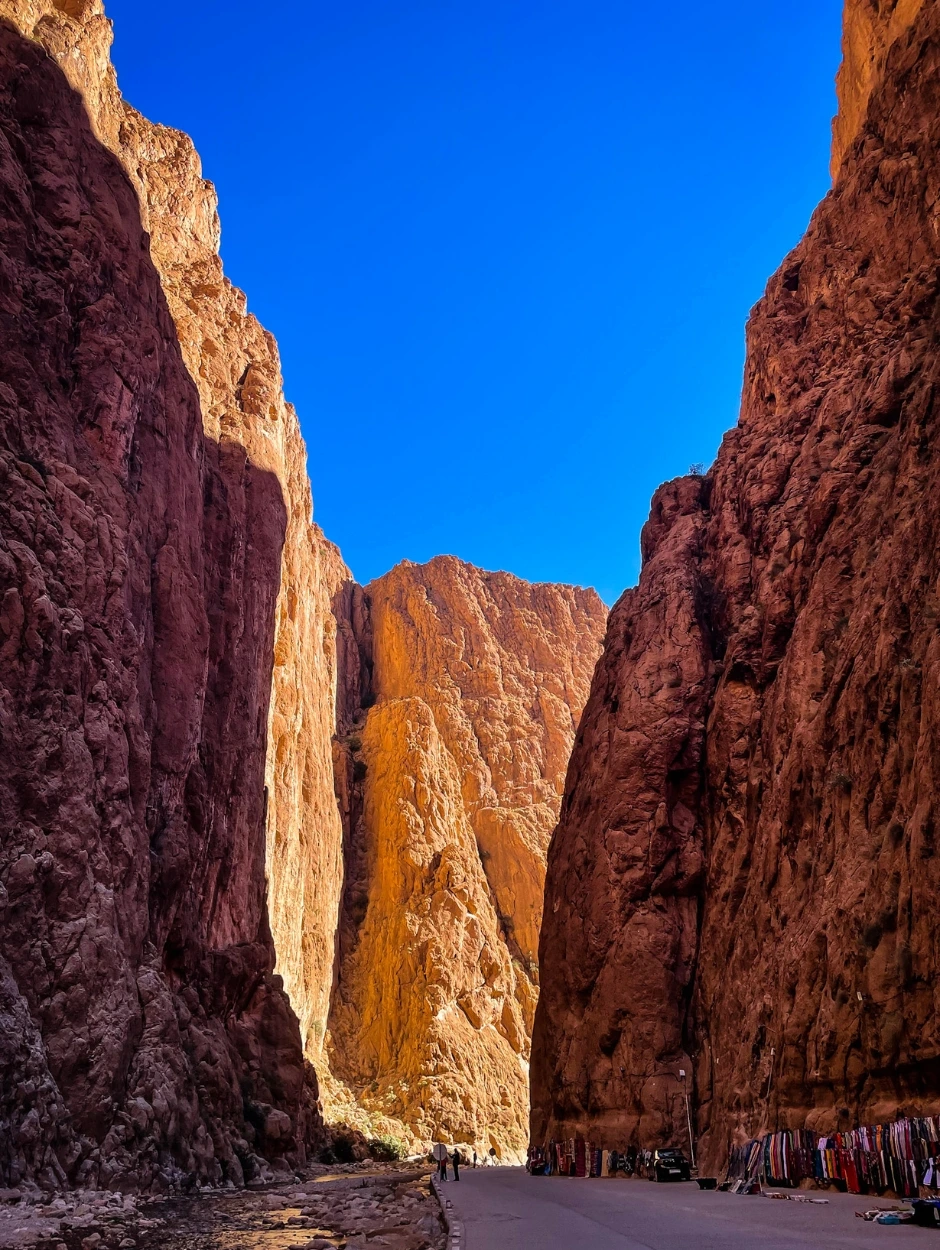
3. Aït Ben Haddou
At number 3, we have the picturesque village of Aït Ben Haddou , located along the former caravan route between the Sahara and Marrakech. It’s known for its historic clay buildings , which is a great example of Moroccan earthen architecture. And while most of the village has been abandoned in recent years, there is still a lot left for travelers to explore. Some of the main highlights include watching the sunrise and sunset from one of the many viewpoints , walking up to the ancient grain store on top of the village, and visiting one of the “kasbah’s” . If you don't have a lot of time, we recommend doing this as a day trip from Marrakech .
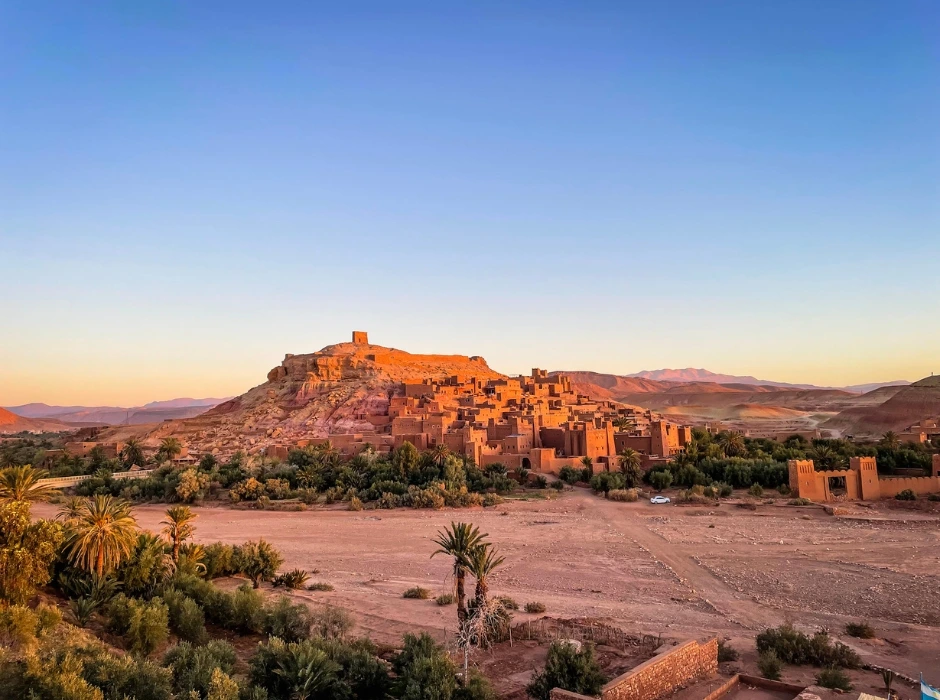
If you have more time in the area, we also recommend exploring nearby Ouarzazate . This city has been welcoming Hollywood directors since the ‘60s and is the movie capital. We did a guided tour of the Atlas Studios , where films like Cleopatra, The Mummy, and Gladiator were shot.

2. High Atlas Region
As North Africa’s highest mountain range, the High Atlas is a paradise for trekkers and skiers . Stretching from the Atlantic Ocean in the west to the Moroccan-Algerian border in the east, this region covers approximately 740 km or 460 miles. The most impressive part is undoubtedly Toubkal National Park , which is easily accessible from Marrakech by car or bus. And the beautiful village of Imlil is the starting and ending point of most hiking circuits in the park. We joined a three-day trek across three valleys and traditional berber villages. But it’s also possible to go on a day or 2-day hike here from Marrakech. We recommend the 2-day hike if you're in decent shape. The 3-day hike follows the same route and was too slow for us (the hiking time was only 4-5 hours per day for the 3-day trek).
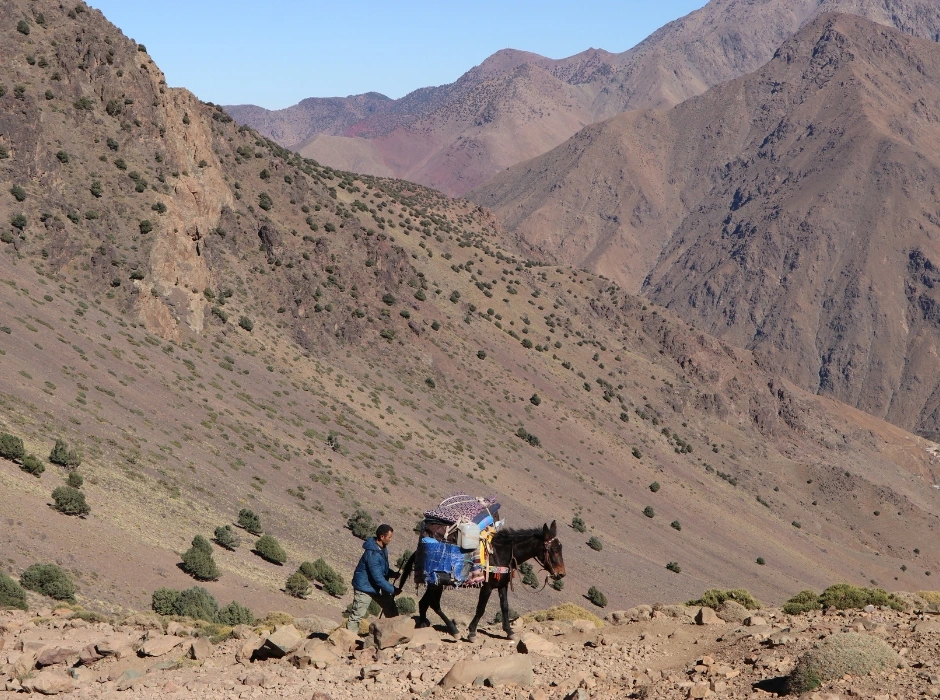
1. Sahara Desert
The most beautiful place to visit in Morocco in our opinion is the Sahara Desert, which spans the south of the country mainly along the border with Algeria. Here, you can enjoy orange dunes, blue skies, camel trekking, camping under the stars , and much more. And while there are various desert options in Morocco, we explored the popular Erg Chebbi dunes at the edge of the town of Merzouga . Get a taste of what the nomadic life in the desert is truly like by spending at least 2 to 3 days here. Learn all about our 3-day safari experience in our Merzouga blog .

Morocco Itineraries
Here are some rough itineraries we propose:
7 days in Morocco
Marrakech (2 days)
Aït Ben Haddou + Ouarzazate (1 day)
Dades + Todra Gorge (1 day)
Merzouga desert (3 days)
10 days in Morocco
Ouzoud waterfalls (1 day trip from Marrakech)
Atlas Mountains (2 days)
14 days in Morocco:
Drive to Fez (2 days - stops in Azrou, the Ziz Gorge, or Ifrane)
Fez (1 day)
Chefchaouen (1 day trip from Fez)
OR spend the last 4 days at one of the beaches along the Atlantic Ocean (instead of Fez & Chefchaouen)
Are you traveling to Morocco but don't have time to plan all aspects of your trip? We created a detailed 10-day itinerary that has all the information and links you need, e.g. accommodations, places to eat and drink, distances, activities, etc . Everything is also pinned on a map so you can easily navigate your way around when you're there. We created this itinerary after traveling around Morocco for 4 weeks. We handpicked the most beautiful places we visited and fun activities we did. This itinerary is for the active traveler who likes hiking and nature, but also learning about the local culture and history. This itinerary saves you 40+ hours of researching and planning.
If you have more time in Morocco or you would like to explore more cities and beaches, it’s worth checking out other beautiful destinations that we didn't mention in our top 10:
Moulay Idriss
Erg Chigaga desert (M’hamid)
Use These Websites To Save Money On Your Trip To Morocco
Booking.com for places to stay
Skyscanner for cheap flights
GetYourGuide for local tours
Rentalcars.com for affordable car rentals
Free Giveaway
Did you enjoy our article on the best places to visit in Morocco? Download our free giveaway and spark your wanderlust with our top 100 travel destinations around the world!

Other Top Morocco resources:
If you're looking for some other suggestions and tips on Morocco, here are some great articles that will help you:
The 12 best things to do in Morocco by The Lonely Planet
12 Best Things To Do In Morocco by Hand Luggage Only
14 Top-Rated Things to Do in Morocco by Planetware
Need more travel inspiration? Check out our other destinations or other articles about Morocco:
Marrakesh, Morocco: A Travel Guide To The Bustling City Of Marrakesh
Chefchaouen in Morocco: A Guide To The Blue City
Fez, Morocco: A Guide To Morocco's Cultural Capital
Merzouga, Morocco: Our Merzouga Desert Trip And Honest Review

Related Posts

Hi! We are Ine & Zac. An international travel couple from Belgium and the US. We created World Wild Hearts to inspire life-changing travel experiences like we've had. Use these tips, stories, and guides to inspire your next adventure of a lifetime!
SAVE MONEY ON YOUR TRIPS

DOWNLOAD FREE TRAVEL RESOURCES
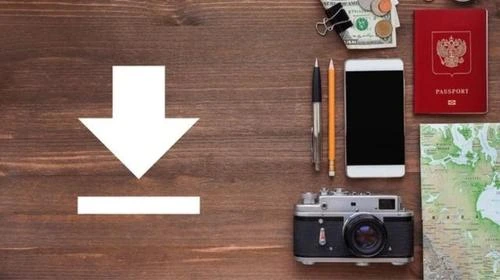
WATCH OUR TRAVEL VIDEOS

This post contains a few affiliate links. That means we may earn a small commission when you click on the links at no additional cost to you. You can read our full disclaimer here . Thanks for supporting our travel blog!
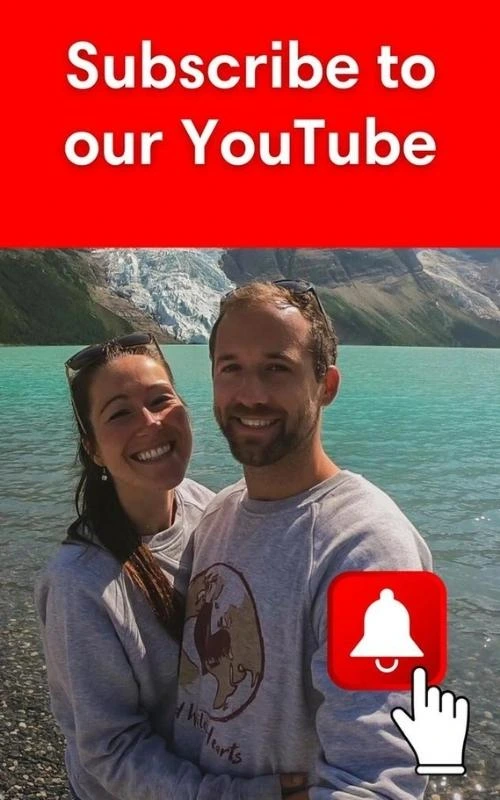
COMPREHENSIVE TRAVEL PLANNER
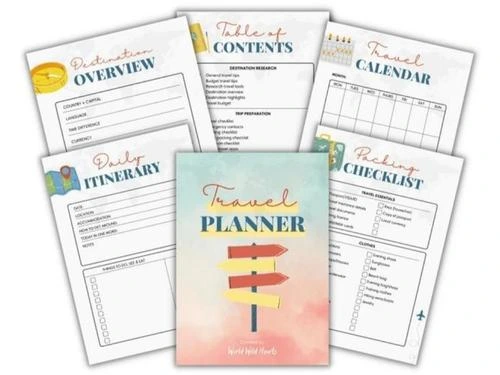
Morocco Travel Guide: How to prepare and plan your Trip
Planning to travel to Morocco and looking for some trusted travel tips? Well then, read on for an adventure filled plan and our top tips! Morocco is only a four hour plane ride away from Europe – and yet it’s like you’ve just been dropped into a completely different world. Morocco is an ideal travel destination for a road trip , with adventures, oriental flair and a pleasantly warm climate.
We have compiled everything we know from our experience and all our best travel tips for Morocco in this one post so that you can best prepare for your road trip. When is the best time to travel? How safe is a trip to Morocco? How do I get from A to B? You’ll find the answers to these questions and more, in this special travel guide for Morocco.
1. Pre-travel Tips: Important Facts about Travelling to Morocco
2. arrival tips: getting into morocco, 3. accommodation guide for morocco: where to stay, 4. eating and drinking in morocco, 5. religion and culture: dress and behaviour tips in morocco, 6. security: how safe is morocco to travel, 7. transport guide: road trip through morocco by car, 8. city transport in morocco: taxi tips, 9. travel costs: how expensive is it to travel morocco, 10. photography tips & restriction in morocco, 11. internet & apps for travelling morocco.
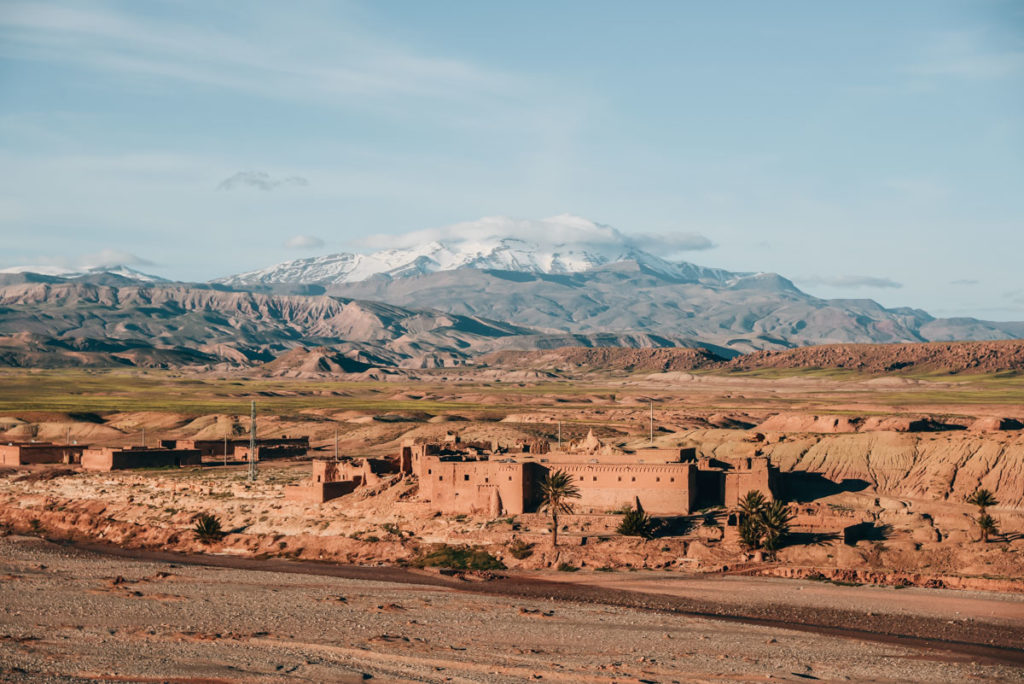
What to expect in Morocco
What images come up when you think of Morocco? Probably one that shows the Arabian-night lifestyle in flawless perfection, right? Yes, you can definitely look forward to that when you travel to Morocco. But: Morocco is SO much more than that.
The following three things make this country special and speak for a trip to Morocco:
- Oriental flair: it starts with the colorful markets, continues through the typical cuisine to the hamams and the wonderful hotels (riads): in Morocco you can soak up the oriental way of life from dawn to dusk.
- Landscape : From the Atlas Mountains to gigantic canyons, from the desert to the mountain passes – Morocco’s landscape will take your breath away. We had high expectations before, but we have to admit: it was even better!
- Geographical proximity to Europe : you are in a completely different world within just a few hours from Mainland Europe. No nerve-wracking jet lag, no long-haul flight. A perfect travel destination for anyone who doesn’t want to travel too far.
Do you want to know which sights you shouldn’t miss and where all the highlights are around the country? Then we recommend our detailed blog article, where we show you which places we have traveled to and what you can expect there.
You can read that here: Our Itinerary: All Destinations in Morocco
Best time and season for Travelling to Morocco
You can travel to Morocco all year round , but of course there are months that are better and those that are less suitable. It also depends on which regions of Morocco you want to travel to.
The ideal travel times for a round trip through Morocco are spring (if possible avoid the holiday season, i.e. Easter) and autumn. While it can still be cool in Europe in spring, you can usually expect bright sunshine in Morocco. And you can also spend wonderful late summer days in Morocco in autumn.
We would not recommend midsummer (July and August), especially if you want to see the desert. In addition, sand storms in the desert start brewing between April and October. Sightseeing at 35 degrees in the shade can also become unbearable. You have to expect restrictions during Ramadan , as some restaurants are closed during the day.
Around Christmas and New Year many flee into the warming sun and it gets very crowded in Morocco and accordingly more expensive. If you want to avoid this, you should also avoid this time.
We traveled to Morocco in late February / early March . During the day it was pleasantly warm, sometimes even quite hot in the sun. It cooled off in the evening. Our accommodations were all equipped with heating. Our tip: in the colder months, be sure to find rooms with heating, otherwise the nights will be rather uncomfortably cold.
Travel Guide to Morocco: Our Tip
Although you can find many tips for Morocco on the Internet, such as on our blog, we still recommend that you get a printed travel guide. Here we can highly recommend the Rough Guide Travel Guide. Rough Guide travel guides are well-known by the fact that they are fairly detailed and very well researched.
The new edition of the Morocco Travel Guide by Rough Guide was published in 2019 and is therefore quite up to date. Our conclusion: perfect for anyone travelling to Morocco!
You can buy the guide here: The Rough Guide Morocco
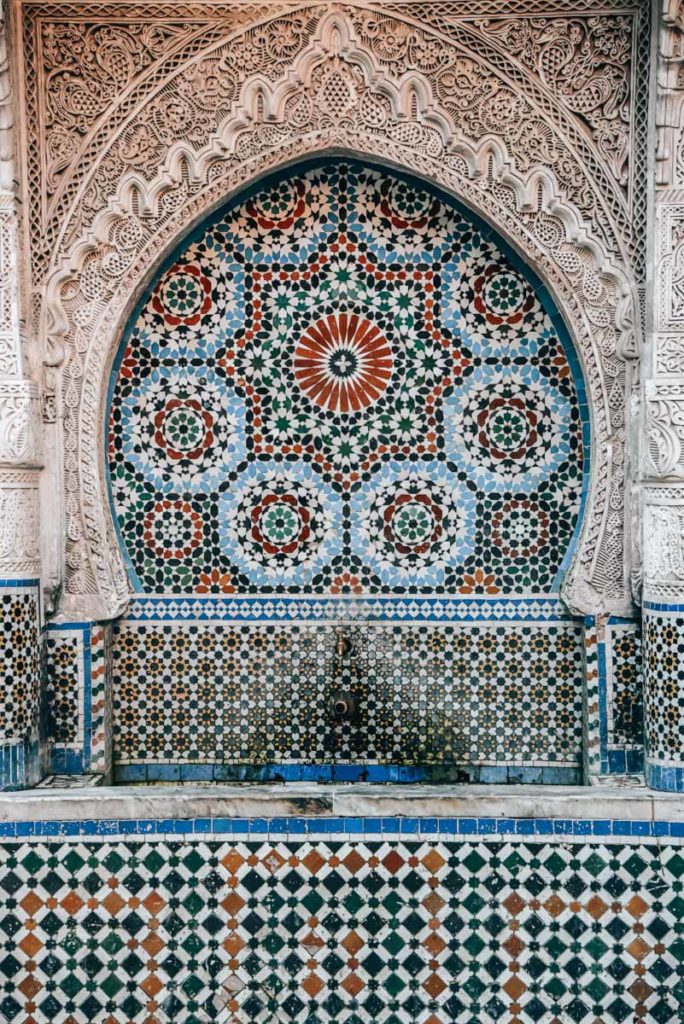
Good news: Austrians and Germans do not need a visa to enter the country. On the plane you will receive an entry card that you must fill out. The border police will take the card and may ask you a few questions. That was it basically.
You can expect the same procedure awaiting you as you leave. Anyone who works in journalism or in another area that could be a thorn in the side of the police should prepare for a somewhat longer question-and-answer game. That was the case with us, but all in all things are relatively relaxed, so don’t worry!
Traditionally, you spend the night in Morocco in so-called riads. Riads are traditional, multi-storey buildings that have a wonderful courtyard and often have a grand roof terrace . From the outside, it is often hard to believe which oasis is hidden behind the gates of a riad.
We swear: Nowhere else in the world have we seen such a high density of grand and stylish accommodation as in Morocco. In larger cities you are literally overwhelmed by the offerings. If possible, we definitely recommend that you stay in a riad. For about 70 to 100 Euros per night you can get a very nice room with breakfast for two people.
Here you will find all our recommendations: Hotel tips for Morocco
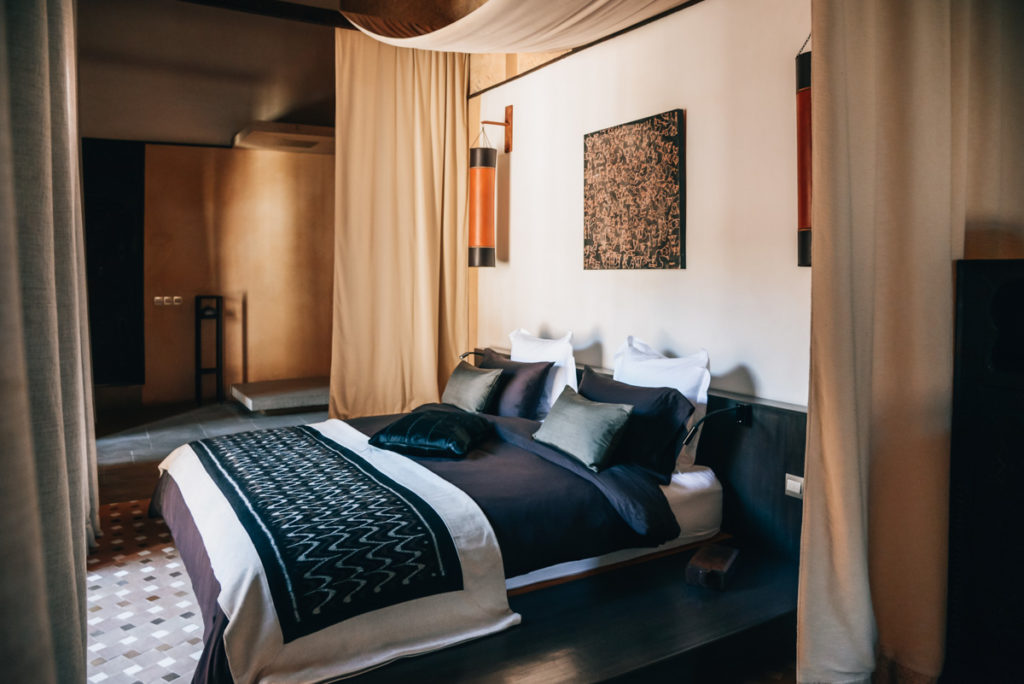
In Morocco, people love the combination of sweet and salty , and dried dates, apricots and raisins are used in many dishes. Honestly, we’re massive fans!
Typical of Morocco is the so-called tagine, a dish that is prepared in a clay pot (also called Tagine ) and is often served with couscous. This stew usually consists of meat and vegetables, but there are also meatless options.
Although we liked Moroccan food, to be honest the culinary offerings got a bit boring over time. Especially for vegetarians , you’ll find the same dishes being served, as the selection is unfortunately rather limited, unless you eat out at hip trendy restaurants. Meat is often eaten in Morocco, unfortunately vegetarian dishes are less common on the menu than in some other countries.
An exception is breakfast , which is almost always very bread and carbohydrate-heavy. Breakfast is included in most accommodations. You will almost always be served different dishes, including Moroccan pancakes, bread, jams and homemade yogurt.
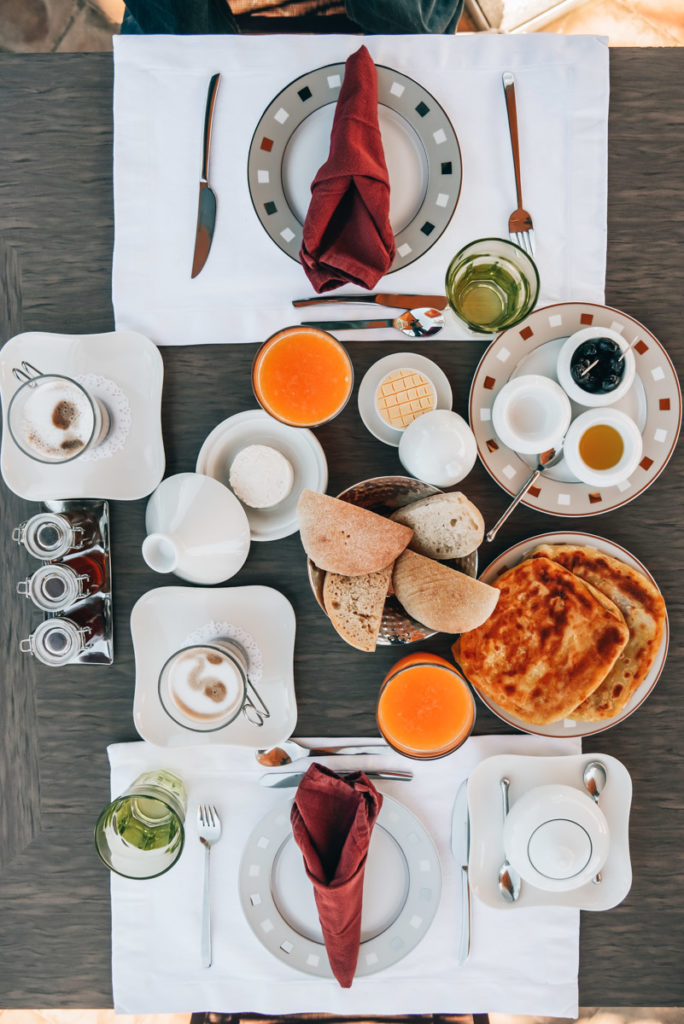
As is well known, Islam is the state religion in Morocco. Knowing that in advance will help you adapt to the culture shock faster. Unfortunately, this means, among other things, that the patriarchal structures are very visible. You’ll find mostly men on the streets.
We therefore, especially recommend women not to wear skimpy clothing . Loose blouses, long trousers and long dresses and skirts are more practical. Honestly, as a tourist, you already stand out immediately so it’s more pleasant to be dressed as covered and casually as possible.
There is no obligation to wear a headscarf , but admittedly: even in direct sunlight we like to use a cloth. Exchanging tenderness or PDA in public is a no-go in Morocco.
Good to know: Non-Muslims can only visit two mosques in Morocco – the Hassan II mosque in Casablanca and the tomb mosque of Moulay Ismail in Meknes. But don’t worry: there are beautiful palaces and Koran schools in Morocco that you can visit.
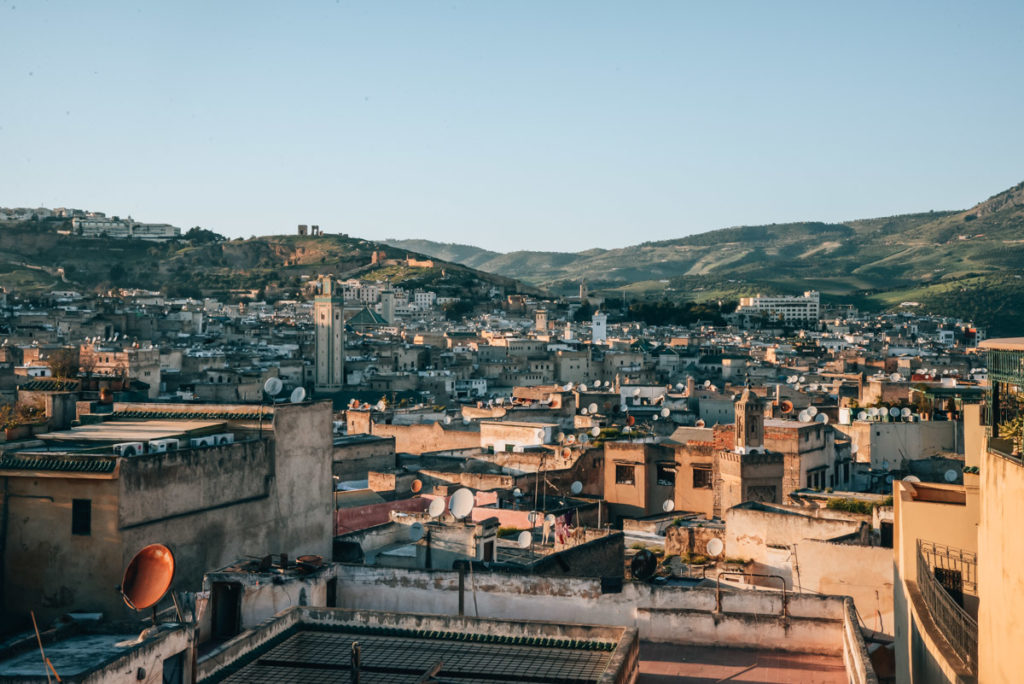
One of the questions we were asked most often: how safe is it to travel around Morocco? First of all, we would advise you to read the most up to date section on the website of your home country’s respective Foreign Ministry Office. In terms of security, this should always be your first point of contact.
However, we will of course also be happy to share our own personal experiences and that is where the good news comes. Nothing bad ever happened to us in Morocco. We had no negative experiences. We were not robbed or harassed. Yes, we probably paid too much for a few things, but that’s about it.
Our specific tips for security:
- Travel as a couple if possible. Of course there are also many who travel through Morocco alone – including women. To be honest, we personally found it very nice to travel as a couple.
- Avoid the medina at night. The medina (the old town) of some cities consists of very narrow streets. Especially at night, these dark alleys can feel a little shady. Try to avoid walks at night. We recommend this to women traveling alone.
- Do not flaunt your valuables. We typically are the kind of people who are often too lazy to safely stow our (rather expensive) camera gear and instead let it hang loosely around our shoulders instead. Apparently, you shouldn’t make a habit out of this – especially in crowds.
- Don’t be fooled by self-proclaimed guides. At every corner in Marrakech someone will offer to show you the way to “La Place” (the large square). In truth, he wants to take you to his shop to sell you something, or he really shows you the place and then of course charges a good amount. Our tip: If you really get lost, it’s better to ask a woman the right way.
- Cities vs. Rural region: We personally found the men in larger cities (above all in Marrakech) to be much more intrusive and uncomfortable than in rural regions. While, for example, tips are constantly demanded in cities (e.g. for photos), people in the countryside are much more chill about it. We’ll give you more tips for taking photos later in this blog article.
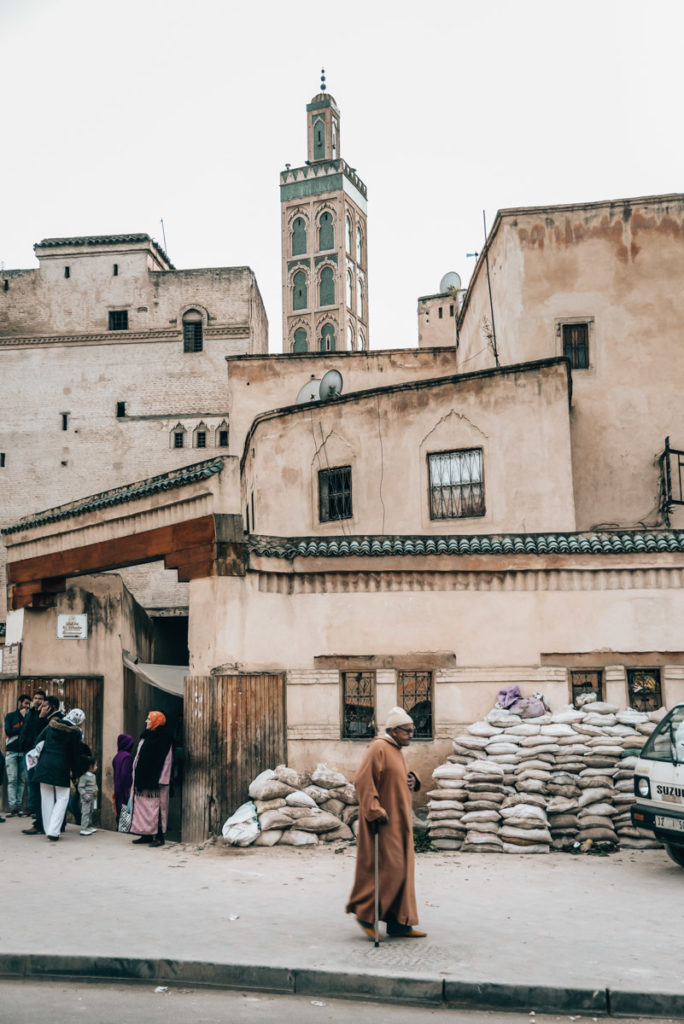
Morocco is a really ideal place to travel with a rental car . There are several reasons for this:
- First of all, the main streets are largely in good condition . Even with a small car you can easily reach most places.
- Traffic is very limited outside of the larger cities. It may be that you don’t see any other cars anywhere.
- There is right-hand traffic in Morocco, so you don’t have to get used to it (unless you’re from NZ, Australia, UK or other Commonwealth Countries)
- Most places are signposted in two languages (English, Arabic).
- The prices for a rental car are comparatively cheap: For our Peugeot 301 we paid around 250 Euros (excluding navigation system) for a week.
Renting a car in Morocco – what should I watch out for?
Provider and deductible.
We booked our rental car through Sunny Cars . We’ve only ever had good experiences with them, because when you book through Sunny Cars you get full insurance including reimbursement of the excess in the event of damage. Sunny Cars acts as an intermediary here: You book your car on the Sunny Cars website and collect it from a local car rental company (e.g. Hertz, Europcar, etc.).
What does a deductible mean? In some countries, this is also called the ‘excess’ or ‘deposit’. e.g. If you drive a dent into the car, you will receive a refund on any additional costs incurred with that accident from Sunny Cars. However, if you book the rental car “with a deductible/excess/deposit” (this is the case with many other platforms), you have to pay a certain amount (usually a few hundred Euros) in the event of damage, which you won’t get back.
You can search for cheap rental cars (fully comprehensive) here: Sunny Cars
Is it safe to drive through Morocco with a rental car?
Honestly, we had our hesitations at first, but it was absolutely no problem ! The streets are mostly in very good condition. There is little traffic. We have never met any dubious people. We only avoided driving at night, but mostly because it is easy to miss a pothole.
Other tips for renting & driving in Morocco
We are happy to rent the car ourselves at the airport, because there is usually less traffic than in the stations in the city and you can get used to the traffic conditions in peace. We picked up our car from Marrakech on the day of departure for two reasons: Firstly, you don’t need a car in Marrakech so we were able to save costs. Secondly, as soon as you drive towards the medina, the traffic is horrendous. We didn’t want to do that to ourselves.
We bought a navigation device , but would not recommend it. It was quite expensive (approx. 12 Euros per day) and we didn’t find much benefit from having it. In addition, we couldn’t find a lot of the places in the navigation system and had to trust our own orientation or the travel guide map.We’d recommend you to better download an offline app for your smartphone. It makes a lot more sense.
An international driver’s license is usually not necessary when renting and we were never asked for it. Nevertheless, we recommend that you get one for insurance reasons alone. You can easily get your international driver’s license for around 15 Euros at the ÖAMTC (Austria) or ADAC (Germany).
In larger cities, you should avoid the car, which saves you time and stress. It is best to park the rental car as close as possible to the accommodation (e.g. in a guarded parking lot or at best at the hotel car park) and switch to taxis for the duration of the stay or cover the distances by foot.
Police controls in Morocco
What many stories are circulating on the Internet are the police controls in Morocco: Yes, it is true. They are everywhere and you are likely to be controlled if you travel to Morocco in your own car.
Our personal experience: We never had a negative experience with the Moroccan police. Even when we were stopped after crossing a stop line during an overtaking manoeuvre, the policeman was very understanding (“French campervans are always slow, I understand that.”)
However, corruption is definitely an issue: we managed to negotiate the amount of our penalty down by half. Otherwise, the control was quite heavily regulated.

Even in the larger cities ( Marrakech , Fez , Casablanca etc.) you can do most of the walking . For longer distances, it is common to take a taxi. A basic distinction is made in Morocco between Petit Taxi and Grand Taxi.
- The Petit Taxi (small taxi) is – as the name suggests – a very small car that can pass through narrow streets.
- A Grand Taxi tends to be used for longer distances, i.e. between two cities or for destinations that are slightly outside the city.
The fare is generally determined by a taximeter, but of course they will try to convince you that it is not currently working. Therefore, you should either ask another driver or negotiate the fare in advance if they try to pull the ‘taximeter trick’ on you.
Prices vary from city to city – depending on how much people are used to tourism. In Marrakech, for example, you can expect a short distance ride to cost 50 Dirhams or more. However, you should really pay a maximum of 30 Dirhams. In Casablanca, we often only paid 20 Dirhams for a longer distance. Also, you can expect a surcharge at night.

Currency & Paying in Morocco
Morocco’s currency is the Moroccan Dirham (MAD). 1 Euro corresponds to about 10.70 Dirham (as of early 2021). With the prices written in Morocco, you simply mentally omit a zero at the end to get the approximate amount of Euros.
You can easily withdraw money from ATMs . If you are from Austria, make sure that the GeoControl function is deactivated at your bank before you leave. You can usually do that online.
Travel expenses in Morocco: price level and price examples
What does it cost in Morocco …?
- Double room in a beautiful riad in Marrakech: 70 to 100 Euros per night
- Car rental for a week: 200 to 250 Euros
- Taxi ride in Marrakech or Fez: 20 to 30 Dirhams
- Dinner for two in a nice restaurant: 200 Dirhams
- Entry to the Majorelle Gardens in Marrakech: 80 Dirhams
- Entry to the Bahia Palace in Marrakech: 50 Dirhams
We would describe the price levels in Morocco as somewhat lower than in Austria or Germany. But don’t expect to have a super cheap trip in Morocco.
Tipping Culture
Tipping is not only seen as desirable in Morocco for many services, but is actually expected . In restaurants, 5 to 10 percent is appropriate. We would also leave the service staff from our accommodation around 10 to 20 Dirham per day in the room.
If you ask for directions or if you take a picture of someone, he or she may also ask for money. We would also then give about 10 to 20 Dirhams.
Morocco is a paradise for photography enthusiasts . And yet there are a few things to consider: Especially if you want to take pictures of people (and Moroccans are really photogenic), you should always ask for permission . In larger cities where people are used to tourists, you will almost always be asked to tip if you want to take pictures of someone.
An extreme example is the Djemaa el Fna in Marrakech. There are dozens, if not hundreds, of people who earn their daily bread as a photo model. Unfortunately, you are often asked for money here, in a not overly kind approach.
On our trip, we preferred another way to get great portraits: We would simply buy something from someone and then asked the person for a photo.
It should be borne in mind that in Islam, the depiction of people is prohibited or not welcome. You should keep this restriction in mind when taking pictures, especially if you are in highly religious areas. If in doubt, we would advise against taking a photo and retreat rather than attract attention.
Under no circumstances should you photograph military facilities and uniformed officers (police, security guards, etc.) (thanks to Ricky for the tip).
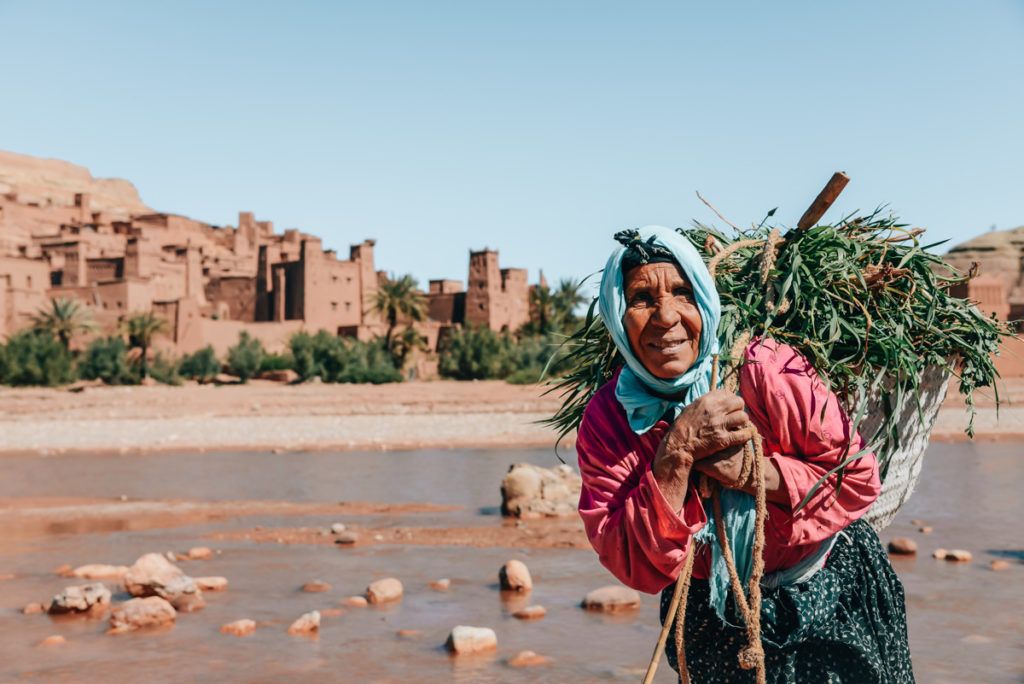
Mobile Internet: SIM card in Morocco
Nowadays, most of us are used to being online while traveling. Therefore, we would highly recommend that you buy a local SIM card for your smartphone when you get there. It is a great way to navigate from A to B and can also be used to search for tips on restaurants or sights.
You can buy the SIM card directly at the airport. It is important that your smartphone is unlocked for all networks (i.e. not limited to one provider). The SIM card is usually setup and activated directly by the staff – without any problems. The price will depend on the data volume, but generally speaking SIM cards are quite cheap.
Network coverage in Morocco is good, although there are places where you don’t have a network. Especially in sparse, barren regions between the cities you often have to do without reception. However, the reception is very good in the cities themselves.
Also WiFi is quite widespread in Morocco: the vast majority of hotels offer WiFi. However, the speed leaves somethings to be said.
Helpful apps for your trip to Morocco
- Google Translate (download the French version so you can use it offline): Especially in rural areas, you’ll find many speak little to no English, but instead speak French.
- maps.me or CityMaps2Go (download the Morocco map so that you can also use it offline): perfect for marking individual sights and restaurants.
- Maps app (iPhone) or Google Maps: Great for navigating from A to B.
- Happy Cow: great for finding vegetarian restaurants nearby.
Disclaimer: Affiliate Links
This blog article contains our personal recommendations in the form of affiliate links. If you book or buy something through these links, then we will receive a small commission. This will not change the prices for you at all. A million thanks from the both of us!
Do you have any other travel tips for Morocco? Let us know in the comments. We look forward to reading about your experience!
You might also be interested in this
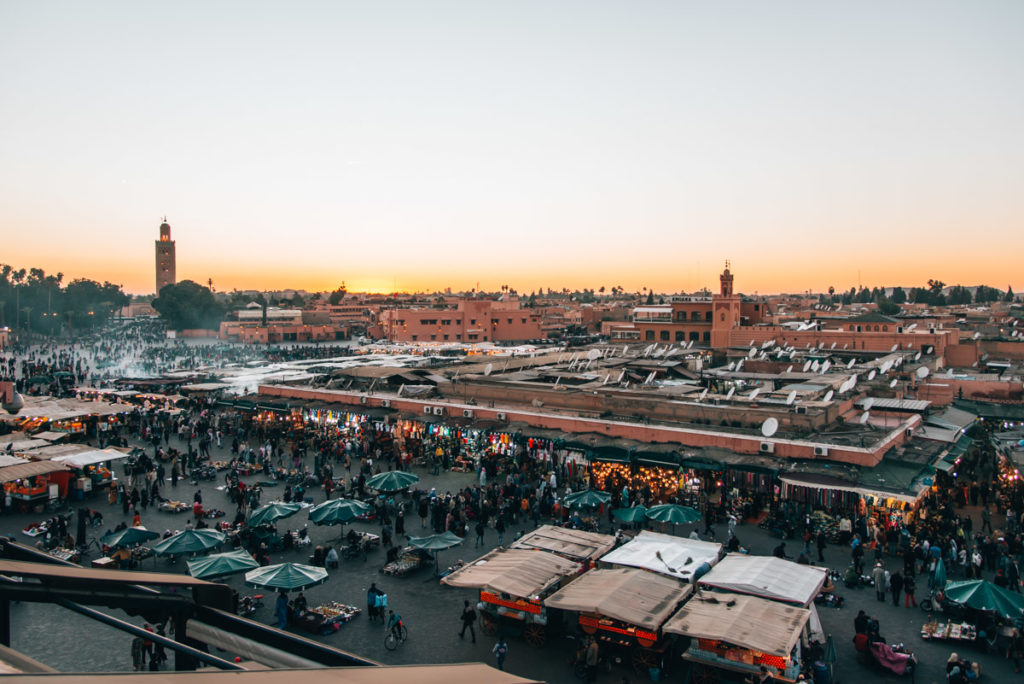
Marrakech Travel Guide: Travel Tips and our Honest Review
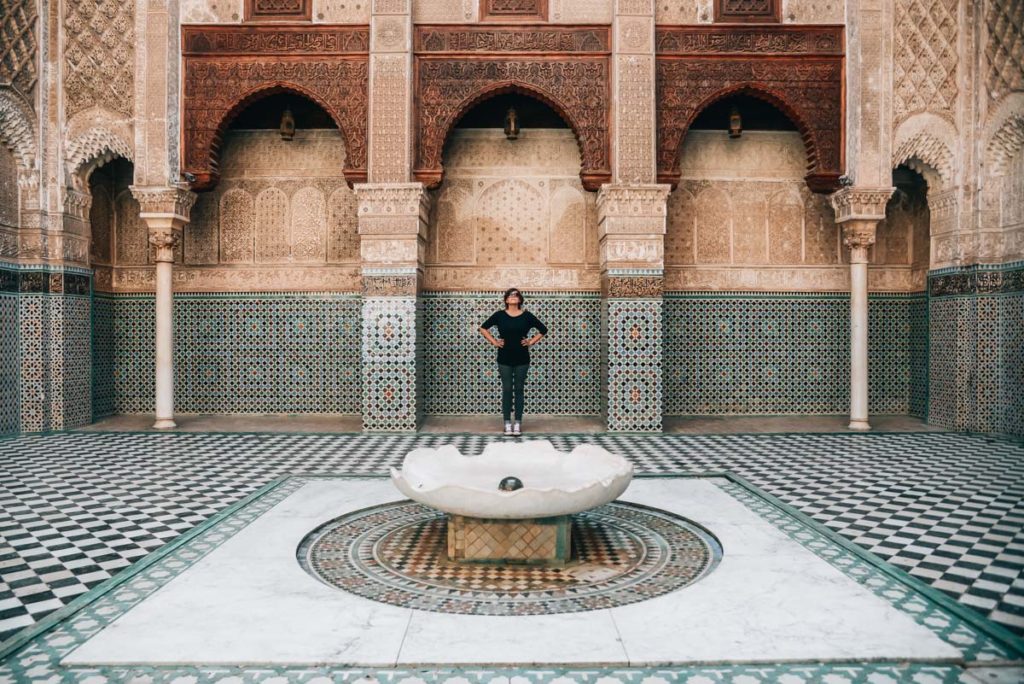
Fez Travel Guide: Best Sights and Tips for the Oldest Medina in Morocco
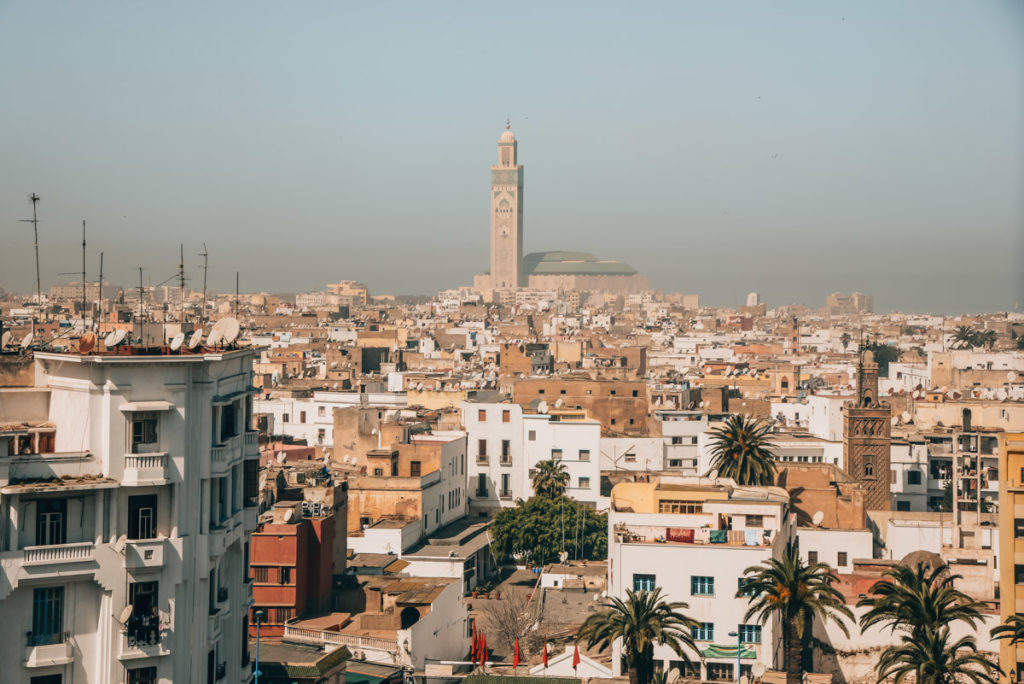
Casablanca Travel Guide: How to Spend the Perfect Day
Leave a reply cancel reply.
Your email address will not be published. Required fields are marked *
- Privacy Policy
- Skip to main content
- Skip to "About this site"
Language selection
Search travel.gc.ca.
Help us to improve our website. Take our survey !
COVID-19: travel health notice for all travellers
Morocco travel advice
Latest updates: The Need help? section was updated.
Last updated: April 5, 2024 07:32 ET
On this page
Safety and security, entry and exit requirements, laws and culture, natural disasters and climate, morocco - exercise a high degree of caution.
Exercise a high degree of caution in Morocco due to the threat of terrorism.
Border regions of Western Sahara - Avoid all travel
- within 30 km west of the Berm, Morocco’s militarized boundary in the Western Sahara
- between the Berm and neighbouring countries on the eastern and southern sides
Back to top
Protests related to the situation in Israel, the West Bank and the Gaza Strip
Since October 13, 2023, protests have been taking place in Rabat, Casablanca and other cities near government buildings. The current protests are related to the ongoing situation in Israel, the West Bank and the Gaza Strip.
Additional protests are expected in Rabat, Casablanca, Marrakesh, Fez, Tangier and several other cities across the country.
Moroccan authorities may employ enhanced measures to respond to demonstrations, including:
- deploying additional security forces
- using crowd dispersal methods
If you are near an affected area:
- exercise caution
- expect heightened security measures
- avoid all demonstrations and gatherings
- follow the instructions of local authorities
Border regions
The berm (border regions of western sahara).
A militarized boundary, known as the Berm, separates the Moroccan-controlled part of Western Sahara from the rest of the Saharan territory, which borders Algeria and Mauritania. There are fatalities involving unexploded ordnance in this zone each year.
Border with Algeria
Morocco’s border with Algeria is closed. Don’t attempt to cross into Algeria by land or water. Avoid boating close to the maritime border in order not to cross it.
Western Sahara
Western Sahara is a non-autonomous territory whose political and legal status has yet to be determined through the United Nations. It’s a former area of conflict that’s still littered with unexploded landmines, particularly in remote regions and the militarized zone.
We may be extremely limited in our ability to provide assistance to Canadians in Western Sahara.
Travel in remote areas
When you travel to a remote area:
- restrict travel to officially designated tourist areas
- seek local, official tourist advice prior to travelling to the desert areas in the south
- hire only official guides recommended by hotels, travel agencies or local tourist authorities
- use only a four-wheel-drive vehicle for off-road driving in the mountains or desert
- ensure that your vehicle is properly equipped and has appropriate supplies and essentials, including potable water
There’s a threat of terrorism, and attacks have targeted foreigners. In December 2018, 2 Scandinavian tourists were found dead in a mountainous area of southern Morocco, 10 km from Imlil, a village in the High Atlas. Moroccan authorities have described the killing as a terrorist act. Terrorist attacks could occur at any time.
Targets could include:
- government buildings, including schools
- places of worship
- airports and other transportation hubs and networks
- public areas such as tourist attractions, restaurants, bars, coffee shops, shopping centres, markets, hotels (specifically coastal beach resorts), and other sites frequented by foreigners
For your safety:
- always be aware of your surroundings when in public places
- stay at hotels that have robust security measures; keep in mind, however, that even the most secure locations can’t be considered completely free of risk
There’s a threat of kidnapping against Westerners in remote regions of Morocco and in areas bordering Algeria and Mauritania.
- Maintain a high level of vigilance at all times, especially when travelling in the southern and border areas of Morocco
- Don’t hike alone in remote mountain regions

Demonstrations
Demonstrations take place from time to time, most often in Rabat. Even peaceful demonstrations can turn violent at any time. They can also lead to disruptions to traffic and public transportation.
- Avoid areas where demonstrations and large gatherings are taking place
- Follow the instructions of local authorities
- Monitor local media for information on ongoing demonstrations
Mass gatherings (large-scale events)
Petty crime
Petty crimes notably pickpocketing, purse snatchings (sometimes by motorcyclists), scams and other thefts take place, most frequently in medinas, market areas, parks and on beaches but can also occur in all types of neighbourhoods.
To limit your risks:
- stay on major roads, especially when in the medinas, and exercise caution
- ensure that your personal belongings are secure
- don’t show signs of affluence, particularly when walking at night
- avoid carrying a purse
- don’t accept food, drinks or invitations from strangers, or change your planned itinerary at their request
- exercise caution in the mountainous Rif region, on the northern coast of Morocco. Drugs are produced in this area and tourists are occasionally tricked into unknowingly committing drug offences
While Moroccans are generally very friendly and hospitable, you should always exercise common sense and travel wisely.
Armed robbery
Armed robberies with knives have occurred and have resulted in injuries and in some cases, deaths. Don’t resist robbers.
Thefts occur around ATMs.
Credit card fraud
Credit card fraud is also frequent.
Forced purchases
Tourists have been forcibly taken to stores and intimidated into making purchases.
Women’s safety
Women travelling alone may be subject to certain forms of harassment and verbal abuse.
Advice for women travellers
Road safety
Road conditions and road safety vary greatly throughout the country, depending on location and weather (for example, in the mountains or during the rainy season).
- Avoid driving at night
- Have an accident report form (constat à l’amiable), which can be purchased at newsstands, in your vehicle at all times.
Not all drivers respect traffic regulations. Pedestrians, scooters and animals on roadways can also pose risks.
National roads
National roads are generally in good condition but are narrow and heavily congested.
Driving is generally easier on the highways.
Be extremely careful when driving on the Rabat-Casablanca highway and on certain national highways because of high traffic volume.
Accidents causing fatalities are common.
If an accident occurs and only involves material damage, the police won’t usually intervene. The parties involved should complete an accident report (joint report), which can be purchased at newsstands. If the accident involves casualties, avoid moving the vehicles before the police arrive.
Checkpoints
Checkpoints are frequent. Carry your identification and vehicle documents at all times.
We do not make assessments on the compliance of foreign domestic airlines with international safety standards.
Information about foreign domestic airlines
Internet romances
Exercise caution if travelling to Morocco for romance, especially in cases of relationships initiated on the Internet.
Find out beforehand about the country’s customs and laws on conjugal relations and marriage.
Ensure that you retain possession of your return plane ticket, your money and your passport in case problems arise.
Useful links
- Marriage abroad
- Overseas fraud
Public beaches
While swimming conditions in tourist areas are generally safe and problem-free, public beaches in major cities are often polluted and unfit for swimming.
Swimming at some beaches on the Atlantic coast is dangerous due to strong currents and tides. Only swim at designated beaches and exercise caution.
Fondation Mohammed VI pour la protection de l’environnement - a list of beaches that meet international standards
Women and girls can be the subject of harassment when wearing swimsuits. Exercise caution and opt for tourist beaches rather than the public ones.
Every country or territory decides who can enter or exit through its borders. The Government of Canada cannot intervene on your behalf if you do not meet your destination’s entry or exit requirements.
We have obtained the information on this page from the Moroccan authorities. It can, however, change at any time.
Verify this information with the Foreign Representatives in Canada .
Entry requirements vary depending on the type of passport you use for travel.
Before you travel, check with your transportation company about passport requirements. Its rules on passport validity may be more stringent than the country’s entry rules.
Regular Canadian passport
Your passport must be valid for at least 6 months beyond the date you expect to leave Morocco.
Passport for official travel
Different entry rules may apply.
Official travel
Passport with “X” gender identifier
While the Government of Canada issues passports with an “X” gender identifier, it cannot guarantee your entry or transit through other countries. You might face entry restrictions in countries that do not recognize the “X” gender identifier. Before you leave, check with the closest foreign representative for your destination.
Other travel documents
Different entry rules may apply when travelling with a temporary passport or an emergency travel document. Before you leave, check with the closest foreign representative for your destination.
- Foreign Representatives in Canada
- Canadian passports
Tourist visa: not required for stays of less than 90 days Business visa: not required for stays of less than 90 days Student visa: not required for stays of less than 90 days
Extending your stay beyond 90 days
You must secure proper authorization if you plan to extend your stay in Morocco beyond 90 days. Contact the Service to Foreigners Section (Section du service aux étrangers) at the local police station at least 15 days prior to the expiry of the 90-day limit.
If you remain in Morocco beyond the 90-day limit, you’ll be forced to remain there until seen by a prosecutor and fined.
Entering by private boat
To enter Morocco by private boat, you must do so at a recognized port of entry.
Entering with a private vehicle
If you enter Morocco with a vehicle, you must exit with it or you will be denied exit.
Yellow fever
Learn about potential entry requirements related to yellow fever (vaccines section).
Children and travel
Learn more about travelling with children .
Relevant Travel Health Notices
- Global Measles Notice - 13 March, 2024
- COVID-19 and International Travel - 13 March, 2024
This section contains information on possible health risks and restrictions regularly found or ongoing in the destination. Follow this advice to lower your risk of becoming ill while travelling. Not all risks are listed below.
Consult a health care professional or visit a travel health clinic preferably 6 weeks before you travel to get personalized health advice and recommendations.
Routine vaccines
Be sure that your routine vaccinations , as per your province or territory , are up-to-date before travelling, regardless of your destination.
Some of these vaccinations include measles-mumps-rubella (MMR), diphtheria, tetanus, pertussis, polio, varicella (chickenpox), influenza and others.
Pre-travel vaccines and medications
You may be at risk for preventable diseases while travelling in this destination. Talk to a travel health professional about which medications or vaccines may be right for you, based on your destination and itinerary.
Yellow fever is a disease caused by a flavivirus from the bite of an infected mosquito.
Travellers get vaccinated either because it is required to enter a country or because it is recommended for their protection.
- There is no risk of yellow fever in this country.
Country Entry Requirement*
- Proof of vaccination is not required to enter this country.
Recommendation
- Vaccination is not recommended.
* It is important to note that country entry requirements may not reflect your risk of yellow fever at your destination. It is recommended that you contact the nearest diplomatic or consular office of the destination(s) you will be visiting to verify any additional entry requirements.
About Yellow Fever
Yellow Fever Vaccination Centres in Canada
There is a risk of hepatitis A in this destination. It is a disease of the liver. People can get hepatitis A if they ingest contaminated food or water, eat foods prepared by an infectious person, or if they have close physical contact (such as oral-anal sex) with an infectious person, although casual contact among people does not spread the virus.
Practise safe food and water precautions and wash your hands often. Vaccination is recommended for all travellers to areas where hepatitis A is present.
Measles is a highly contagious viral disease. It can spread quickly from person to person by direct contact and through droplets in the air.
Anyone who is not protected against measles is at risk of being infected with it when travelling internationally.
Regardless of where you are going, talk to a health care professional before travelling to make sure you are fully protected against measles.
Hepatitis B is a risk in every destination. It is a viral liver disease that is easily transmitted from one person to another through exposure to blood and body fluids containing the hepatitis B virus. Travellers who may be exposed to blood or other bodily fluids (e.g., through sexual contact, medical treatment, sharing needles, tattooing, acupuncture or occupational exposure) are at higher risk of getting hepatitis B.
Hepatitis B vaccination is recommended for all travellers. Prevent hepatitis B infection by practicing safe sex, only using new and sterile drug equipment, and only getting tattoos and piercings in settings that follow public health regulations and standards.
Coronavirus disease (COVID-19) is an infectious viral disease. It can spread from person to person by direct contact and through droplets in the air.
It is recommended that all eligible travellers complete a COVID-19 vaccine series along with any additional recommended doses in Canada before travelling. Evidence shows that vaccines are very effective at preventing severe illness, hospitalization and death from COVID-19. While vaccination provides better protection against serious illness, you may still be at risk of infection from the virus that causes COVID-19. Anyone who has not completed a vaccine series is at increased risk of being infected with the virus that causes COVID-19 and is at greater risk for severe disease when travelling internationally.
Before travelling, verify your destination’s COVID-19 vaccination entry/exit requirements. Regardless of where you are going, talk to a health care professional before travelling to make sure you are adequately protected against COVID-19.
The best way to protect yourself from seasonal influenza (flu) is to get vaccinated every year. Get the flu shot at least 2 weeks before travelling.
The flu occurs worldwide.
- In the Northern Hemisphere, the flu season usually runs from November to April.
- In the Southern Hemisphere, the flu season usually runs between April and October.
- In the tropics, there is flu activity year round.
The flu vaccine available in one hemisphere may only offer partial protection against the flu in the other hemisphere.
The flu virus spreads from person to person when they cough or sneeze or by touching objects and surfaces that have been contaminated with the virus. Clean your hands often and wear a mask if you have a fever or respiratory symptoms.
In this destination, rabies is carried by dogs and some wildlife, including bats. Rabies is a deadly disease that spreads to humans primarily through bites or scratches from an infected animal. While travelling, take precautions , including keeping your distance from animals (including free-roaming dogs), and closely supervising children.
If you are bitten or scratched by an animal while travelling, immediately wash the wound with soap and clean water and see a health care professional. Rabies treatment is often available in this destination.
Before travel, discuss rabies vaccination with a health care professional. It may be recommended for travellers who are at high risk of exposure (e.g., occupational risk such as veterinarians and wildlife workers, children, adventure travellers and spelunkers, and others in close contact with animals).
Safe food and water precautions
Many illnesses can be caused by eating food or drinking beverages contaminated by bacteria, parasites, toxins, or viruses, or by swimming or bathing in contaminated water.
- Learn more about food and water precautions to take to avoid getting sick by visiting our eat and drink safely abroad page. Remember: Boil it, cook it, peel it, or leave it!
- Avoid getting water into your eyes, mouth or nose when swimming or participating in activities in freshwater (streams, canals, lakes), particularly after flooding or heavy rain. Water may look clean but could still be polluted or contaminated.
- Avoid inhaling or swallowing water while bathing, showering, or swimming in pools or hot tubs.
Travellers' diarrhea is the most common illness affecting travellers. It is spread from eating or drinking contaminated food or water.
Risk of developing travellers' diarrhea increases when travelling in regions with poor standards of hygiene and sanitation. Practise safe food and water precautions.
The most important treatment for travellers' diarrhea is rehydration (drinking lots of fluids). Carry oral rehydration salts when travelling.
Typhoid is a bacterial infection spread by contaminated food or water. Risk is higher among children, travellers going to rural areas, travellers visiting friends and relatives or those travelling for a long period of time.
Travellers visiting regions with a risk of typhoid, especially those exposed to places with poor sanitation, should speak to a health care professional about vaccination.
Insect bite prevention
Many diseases are spread by the bites of infected insects such as mosquitoes, ticks, fleas or flies. When travelling to areas where infected insects may be present:
- Use insect repellent (bug spray) on exposed skin
- Cover up with light-coloured, loose clothes made of tightly woven materials such as nylon or polyester
- Minimize exposure to insects
- Use mosquito netting when sleeping outdoors or in buildings that are not fully enclosed
To learn more about how you can reduce your risk of infection and disease caused by bites, both at home and abroad, visit our insect bite prevention page.
Find out what types of insects are present where you’re travelling, when they’re most active, and the symptoms of the diseases they spread.
Animal precautions
Some infections, such as rabies and influenza, can be shared between humans and animals. Certain types of activities may increase your chance of contact with animals, such as travelling in rural or forested areas, camping, hiking, and visiting wet markets (places where live animals are slaughtered and sold) or caves.
Travellers are cautioned to avoid contact with animals, including dogs, livestock (pigs, cows), monkeys, snakes, rodents, birds, and bats, and to avoid eating undercooked wild game.
Closely supervise children, as they are more likely to come in contact with animals.
Person-to-person infections
Stay home if you’re sick and practise proper cough and sneeze etiquette , which includes coughing or sneezing into a tissue or the bend of your arm, not your hand. Reduce your risk of colds, the flu and other illnesses by:
- washing your hands often
- avoiding or limiting the amount of time spent in closed spaces, crowded places, or at large-scale events (concerts, sporting events, rallies)
- avoiding close physical contact with people who may be showing symptoms of illness
Sexually transmitted infections (STIs) , HIV , and mpox are spread through blood and bodily fluids; use condoms, practise safe sex, and limit your number of sexual partners. Check with your local public health authority pre-travel to determine your eligibility for mpox vaccine.
Tuberculosis is an infection caused by bacteria and usually affects the lungs.
For most travellers the risk of tuberculosis is low.
Travellers who may be at high risk while travelling in regions with risk of tuberculosis should discuss pre- and post-travel options with a health care professional.
High-risk travellers include those visiting or working in prisons, refugee camps, homeless shelters, or hospitals, or travellers visiting friends and relatives.
Medical services and facilities
The quality of medical care varies greatly throughout the country. Casablanca, Marrakesh and Rabat have good, private medical facilities for non-emergencies. Care in public health facilities is not up to Canadian standards.
Doctors and hospitals often expect immediate cash payment.
Make sure you get travel insurance that includes coverage for medical evacuation and hospital stays.
Travel health and safety
Keep in Mind...
The decision to travel is the sole responsibility of the traveller. The traveller is also responsible for his or her own personal safety.
Be prepared. Do not expect medical services to be the same as in Canada. Pack a travel health kit , especially if you will be travelling away from major city centres.
You must abide by local laws.
Learn about what you should do and how we can help if you are arrested or detained abroad .
Penalties for possession, use or trafficking of illegal drugs are strict, and judgment is expeditious.
Alcohol consumption outside of licensed bars, hotels and restaurants is prohibited. Offenders may be punished by detention or other penalties. Alcohol can also be purchased from licensed stores for private consumption.
Drugs, alcohol and travel
Non-Islamic religious materials
Unauthorized importation of bibles or other non-Islamic religious material is prohibited, except for personal use. Religious preaching is forbidden.
Mailing identity papers
Sending identity papers, such as passports, by mail is forbidden in Morocco and authorities may confiscate them.
Extramarital sexual relations
Extramarital sexual relations are illegal. Hotels may refuse to allow couples to stay in the same room, if they’re unable to prove that they’re married. Foreigners, however, are almost always exempt from having to provide proof.
Pornography
Possession of pornographic material is illegal.
Photography
Don’t take photographs of military or security installations.
Drones and surveillance equipment
Drones and surveillance equipment are prohibited and will be confiscated by the authorities upon entry.
The Moroccan constitution states that the person of the King is inviolable and respect is due to him. It is expected that people avoid any criticism of the monarchy.
2SLGBTQI+ travellers
The laws of Morocco prohibit sexual acts between individuals of the same sex.
2SLGBTQI+ travellers should carefully consider the risks of travelling to Morocco.
Travel and your sexual orientation, gender identity, gender expression and sex characteristics
Children and citizenship
Children of Moroccan fathers automatically acquire Moroccan citizenship at birth, regardless of where they were born. Children of Moroccan mothers may submit a request for their citizenship.
Under Moroccan law, parents may prevent their children from leaving Morocco.
Entry and exit requirements when travelling with children
Dual citizenship
Dual citizenship is legally recognized in Morocco. According to Moroccan law, however, Moroccan citizenship takes precedence over any other citizenship.
Airport authorities regularly ask dual citizens to produce their Moroccan national identification card.
If you’re a citizen of Canada, but also a citizen of Morocco, our ability to offer you consular services may be limited in Morocco. You may also be subject to different entry/exit requirements.
General information for travellers with dual citizenship
International Child Abduction
The Hague Convention on the Civil Aspects of International Child Abduction is an international treaty. It can help parents with the return of children who have been removed to or retained in certain countries in violation of custody rights. The convention applies between Canada and Morocco.
If your child was wrongfully taken to, or is being held in Morocco, and if the applicable conditions are met, you may apply for the return of your child to the Moroccan court.
If you are in this situation:
- act as quickly as you can
- contact the Central Authority for your province or territory of residence for information on starting an application under The Hague Convention
- consult a lawyer in Canada and in Morocco to explore all the legal options for the return of your child
- report the situation to the nearest Canadian government office abroad or to the Vulnerable Children’s Consular Unit at Global Affairs Canada by calling the Emergency Watch and Response Centre
If your child was removed from a country other than Canada, consult a lawyer to determine if The Hague Convention applies.
Be aware that Canadian consular officials cannot interfere in private legal matters or in another country’s judicial affairs.
- List of Canadian Central Authorities for the Hague Convention
- International Child Abduction: A Guidebook for Left-Behind Parents
- Travelling with children
- The Hague Convention - Hague Conference on Private International Law
- Canadian embassies and consulates by destination
- Emergency Watch and Response Centre
Dress and behaviour
Islamic practices and beliefs are adhered to in Morocco’s customs, laws and regulations. Dress conservatively, behave discreetly and respect religious and social traditions to avoid offending local sensitivities.
Public displays of affection are frowned upon.
In 2024, the lunar month of Ramadan is expected to begin on or around March 10.
In public, between sunrise and sunset, refrain from:
The currency in Morocco is the Moroccan dirham (MAD). The dirham cannot be exchanged outside of the country. Exchange only as much money as needed, as it is illegal to take dirhams out of Morocco.
Unused dirhams can be converted at the airport exchange counter upon departure, with proof of your initial currency purchase.
Credit cards and traveller’s cheques are accepted in certain stores and restaurants in urban centres and in major hotels.
Earthquake in the Marrakesh-Safi region
On September 8, 2023, a 6.8 magnitude earthquake struck near the city of Marrakesh, in the Marrakesh-Safi region. The tremors were felt in several cities across the country.
There was significant damage to infrastructure and many casualties, especially in the villages located in the area of the High Atlas. Emergency services continue to provide assistance to the affected populations and recovery efforts are underway.
If you are in or near the affected areas:
- monitor local media for the latest developments
- check road conditions before travelling
Morocco is located in an active seismic zone.
Rainy season
The rainy season usually extends from November to March, during which flash floods can occur frequently. These can be especially dangerous in the High Atlas valleys.
Monitor regional weather forecasts and plan accordingly
Local services
In case of emergency, dial:
- police: 190
- medical assistance: 150
- firefighters: 150
Consular assistance
For emergency consular assistance, call the Embassy of Canada to Morocco in Rabat and follow the instructions. At any time, you may also contact the Emergency Watch and Response Centre in Ottawa.
The decision to travel is your choice and you are responsible for your personal safety abroad. We take the safety and security of Canadians abroad very seriously and provide credible and timely information in our Travel Advice to enable you to make well-informed decisions regarding your travel abroad.
The content on this page is provided for information only. While we make every effort to give you correct information, it is provided on an "as is" basis without warranty of any kind, expressed or implied. The Government of Canada does not assume responsibility and will not be liable for any damages in connection to the information provided.
If you need consular assistance while abroad, we will make every effort to help you. However, there may be constraints that will limit the ability of the Government of Canada to provide services.
Learn more about consular services .
Risk Levels
take normal security precautions.
Take similar precautions to those you would take in Canada.
Exercise a high degree of caution
There are certain safety and security concerns or the situation could change quickly. Be very cautious at all times, monitor local media and follow the instructions of local authorities.
IMPORTANT: The two levels below are official Government of Canada Travel Advisories and are issued when the safety and security of Canadians travelling or living in the country or region may be at risk.
Avoid non-essential travel
Your safety and security could be at risk. You should think about your need to travel to this country, territory or region based on family or business requirements, knowledge of or familiarity with the region, and other factors. If you are already there, think about whether you really need to be there. If you do not need to be there, you should think about leaving.
Avoid all travel
You should not travel to this country, territory or region. Your personal safety and security are at great risk. If you are already there, you should think about leaving if it is safe to do so.
Morocco has reopened to travelers. Here's what to expect

Feb 8, 2022 • 2 min read
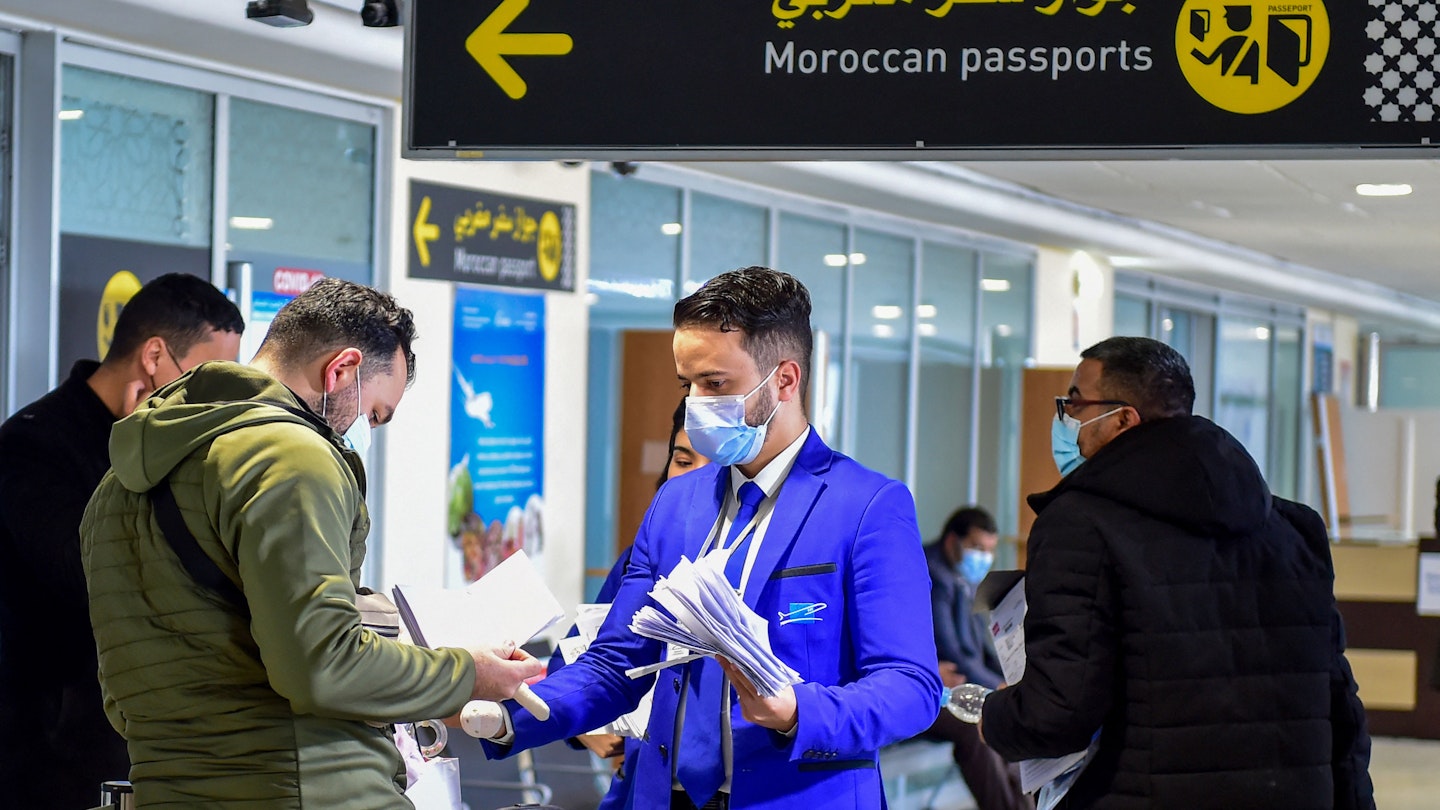
Morocco reopened its borders on February 7. © Getty Images
Morocco officially lifted its international travel ban and reopened to vaccinated foreign visitors on February 7. But, there are some requirements you'll need to follow in order to enter.
The move to open the borders follows "the evolution of the epidemiological situation in the kingdom" said a government statement via AFP , as hospitalization numbers stabilize across the North African country.
Morocco imposed one of the northern hemisphere's strictest travel bans to deal with the emergence of the Omicron strain of COVID-19, closing all land, air, and sea borders to travelers on November 29. The move stranded tens of thousands of Moroccans abroad, as well as keeping international visitors within the country, when repatriation flights ended in December.
Read more: Morocco's best food experiences
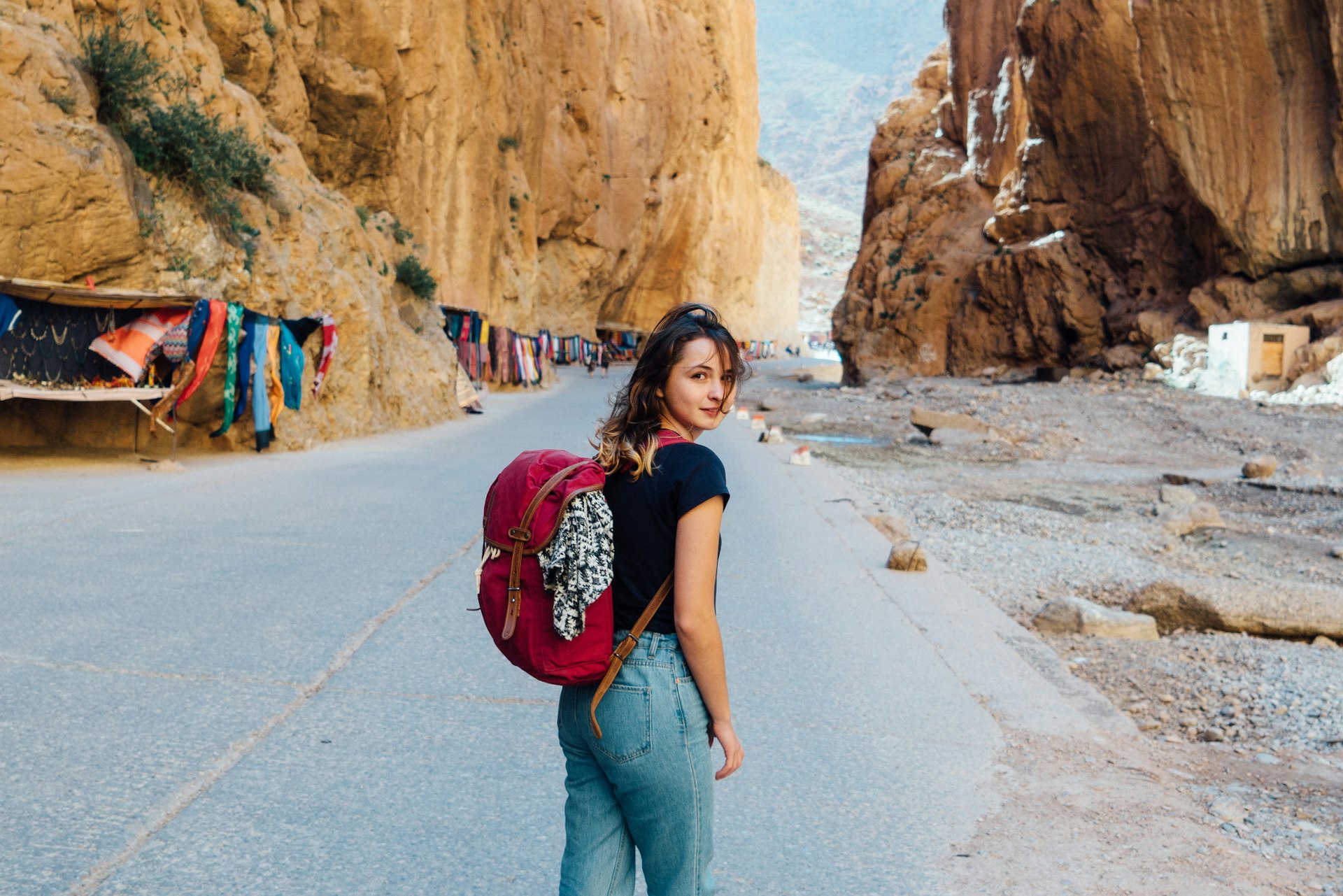
Even though Morocco has reopened to foreign visitors, there are a few requirements to enter.
Those age 12 and older must present a completed health form, present a vaccination pass (passes issued by other countries are accepted according to the Visit Morocco website ) and proof of a negative COVID-19 PCR test taken no more than 48 hours prior to boarding the flight.
Visitors must also take a rapid antigen test upon arriving in Morocco. Some visitors age 7 and older will also be required to take an additional test within 48 hours of arrival at their hotel.
Meanwhile, the country is still battling a growing number of coronavirus cases, particularly among the unvaccinated population, and some domestic measures remain in place. Proof of vaccination (i.e., a vaccine pass) is required to enter establishments such as hotels, cafes, restaurants, museums gyms, hammams, supermarkets, and public transport. Wearing face masks in public areas is required.
Read more: Morocco's 10 best beaches
When tourists return, it's likely they will be required to abide by the same domestic rules. US citizens should carry their Centers of Disease Control and Prevention (CDC) white card as proof of vaccination, the US Embassy says , although it "cannot be certain what proof will be accepted by individual establishments". The UK Embassy confirmed that Morocco will accept the UK’s proof of COVID-19 recovery and vaccination record at the border, though whether this will be accepted has a vaccine pass has yet to be confirmed. EU citizens can present their EU Digital COVID certs as proof of vaccination as the certificate's QR code is recognized in Morocco.
Morocco is Africa's most vaccinated country, having now administered two shots to 23 million people, in a total population of 36 million. According to Reuters , nearly three million people have received booster doses as of last month.
Read more: Philippines set to ease restrictions on fully vaccinated international tourists In Bhutan a historic Himalayan route opens to hikers for the first time in 60 years Traveling to the Canary or Balearic islands in Spain? Here’s what to expect
This article was first published September 2020 and updated February 2022
Explore related stories
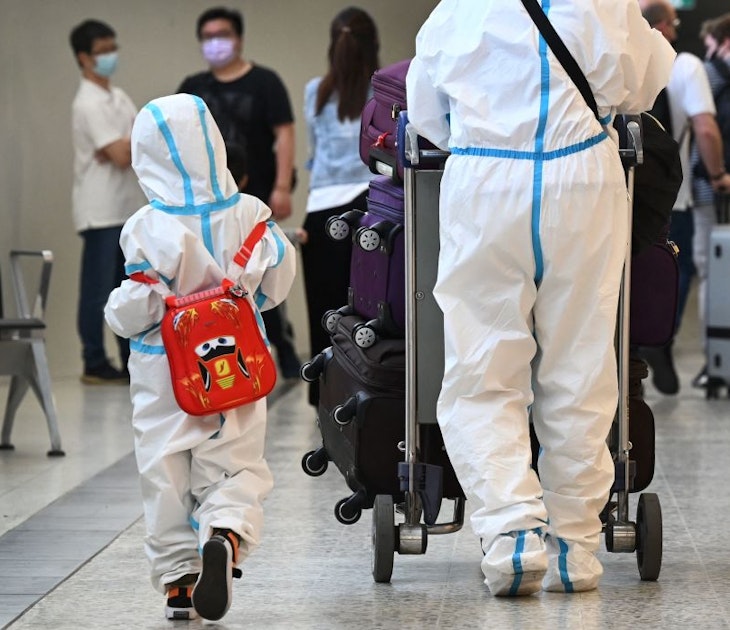
Nov 30, 2021 • 6 min read
Countries around the world are imposing travel restrictions following the detection of a new fast-spreading COVID-19 variant.
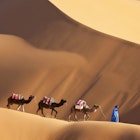
Mar 11, 2024 • 5 min read

Feb 7, 2024 • 5 min read

Jan 31, 2024 • 6 min read

Jan 17, 2024 • 8 min read
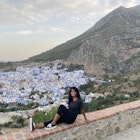
Jan 17, 2024 • 6 min read

Jan 2, 2024 • 11 min read
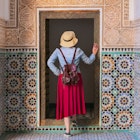
Nov 29, 2023 • 6 min read
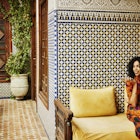
Oct 15, 2023 • 7 min read
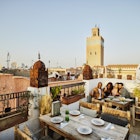
Oct 11, 2023 • 7 min read

Morocco Travel Guide (2023)
This is the ultimate Morocco travel guide for 2023, covering everything there is to know about visiting this beautiful country. I designed this page to be a complete resource for trip planning, outlining general things to know about Morocco, the top places to visit, bucket list experiences, how to get around, and a whole lot more.
The Best Morocco Travel Guide
After living here for six months and exploring nearly every corner of this beautiful country, I’m super excited to share what I’ve learned in this Morocco travel guide. From the things I wish I knew before traveling to essential safety information, I’ve packed it all in here for easy access.
Keep reading to discover all there is to know with this complete Morocco travel guide!
Main Things to Know About Morocco
> Language: The official languages of Morocco are Arabic and Berber(also called Amazigh). However, the most common language spoken in Morocco is Darija, or Moroccan Arabic, which is a combination of Arabic, Amazigh, French, and Spanish. Moroccan people are some of the most talented with languages I’ve come across on my world travels. Many people speak French, Spanish, and English in addition to Darija, especially in touristy areas. > Currency: The currency used in Morocco is the Moroccan dirham (MAD). The exchange rate is about 10 dirhams to $1 U.S. Dollar. Outside of major cities, most places in Morocco only accept cash. You can withdraw dirhams from local ATMs or exchange in just about every city. Many places will also accept euros and sometimes US dollars. > Religion: Morocco is a predominantly Muslim country, with Islam being the official religion. The practice of religion is an important part of Moroccan culture and daily life, with many mosques and religious sites throughout the country. You’ll hear the Call to Prayer five times a day, and at this time, many small shop owners will close to go to the mosque. > Safety: In my experience, Morocco is quite a safe country, especially as a woman. There are some common scams to look out for and a bit of catcalling, but aside from that, the people are some of the nicest I’ve met anywhere in the world. > Clothing: Morocco is a fairly conservative country, and it’s important to dress appropriately, especially if you’re a woman. Women should dress modestly and cover their shoulders and knees. Loose-fitting clothing is ideal for staying cool in Morocco’s hot weather, so think maxi dresses, flowy pants, and short sleeve jumpsuits. Though definitely pack layers because it gets cold at night. If you’re visiting Morocco during the winter, it’s pretty chilly, especially up north and in the desert.
Top Places to Visit in Morocco
Morocco is a country full of vibrant culture, beautiful architecture, and stunning landscapes. Here are the top 8 places to visit in Morocco on any trip.
1. Marrakech : Known as the “Red City”, Marrakech is definitely the most iconic place to visit in Morocco. Home to beautiful palaces, gardens, and mosques, there are secrets hiding behind every ornate door. Take a stroll through the bustling souks, shop for spices and souvenirs, and indulge in some traditional Moroccan cuisine.
2. Fes : This ancient city has been designated as a UNESCO World Heritage Site and is home to the famous leather tanneries. Be sure to explore the maze-like streets of the medina (there are more than 4,000 of them!) and catch a sunset from the Marinid Tombs.
3. Chefchaouen : This picturesque blue city is nestled in the Rif Mountains and is the perfect place to escape the heat. There are many things to do in Chefchaouen , like take a hike to the Spanish Mosque for breathtaking views of the city or cool off by the Ras El Ma River. With more time, a day trip to Akchour is a must.
Read More: Chefchaouen Travel Guide
4. Casablanca : Known for its stunning architecture and beautiful beaches, Casablanca is the main business hub of Morocco. Though, there’s still plenty of culture to enjoy. Don’t forget to check out the famous Hassan II Mosque and Marché Central for the catch of the day.
5. Tangier : This port city has a rich history of being a gateway between Europe and Africa. Explore the Kasbah Museum, relax on the stunning beaches, and drink mint tea on one of the countless rooftops in the medina. On a clear day, you can see Spain across the water!
6. Merzouga : This small town is the entrance to the Sahara Desert in Morocco. Experience a camel trek through the dunes and spend the night sleeping in a tent under the stars. Merzouga is also a top place for adventure activities like quad biking and dune buggies.
7. Essaouira : This charming coastal town is known for its enchanting beaches and relaxed atmosphere. In terms of things to do in Essaouira , you have a fair share of options. Take a stroll through the historic medina, hang out on the beach, chow down on some fresh seafood, and listen to live Gnaoua music.
Read More: Essaouira Travel Guide
8. Ait Ben Haddou: This fortified city is a UNESCO World Heritage Site and has been used as a backdrop for numerous films and TV shows, including “Game of Thrones”. Explore the winding streets and marvel at the stunning architecture, which dates back to the 17th century. It’s a great day trip from Marrakech or a stop on the way to Merzouga.
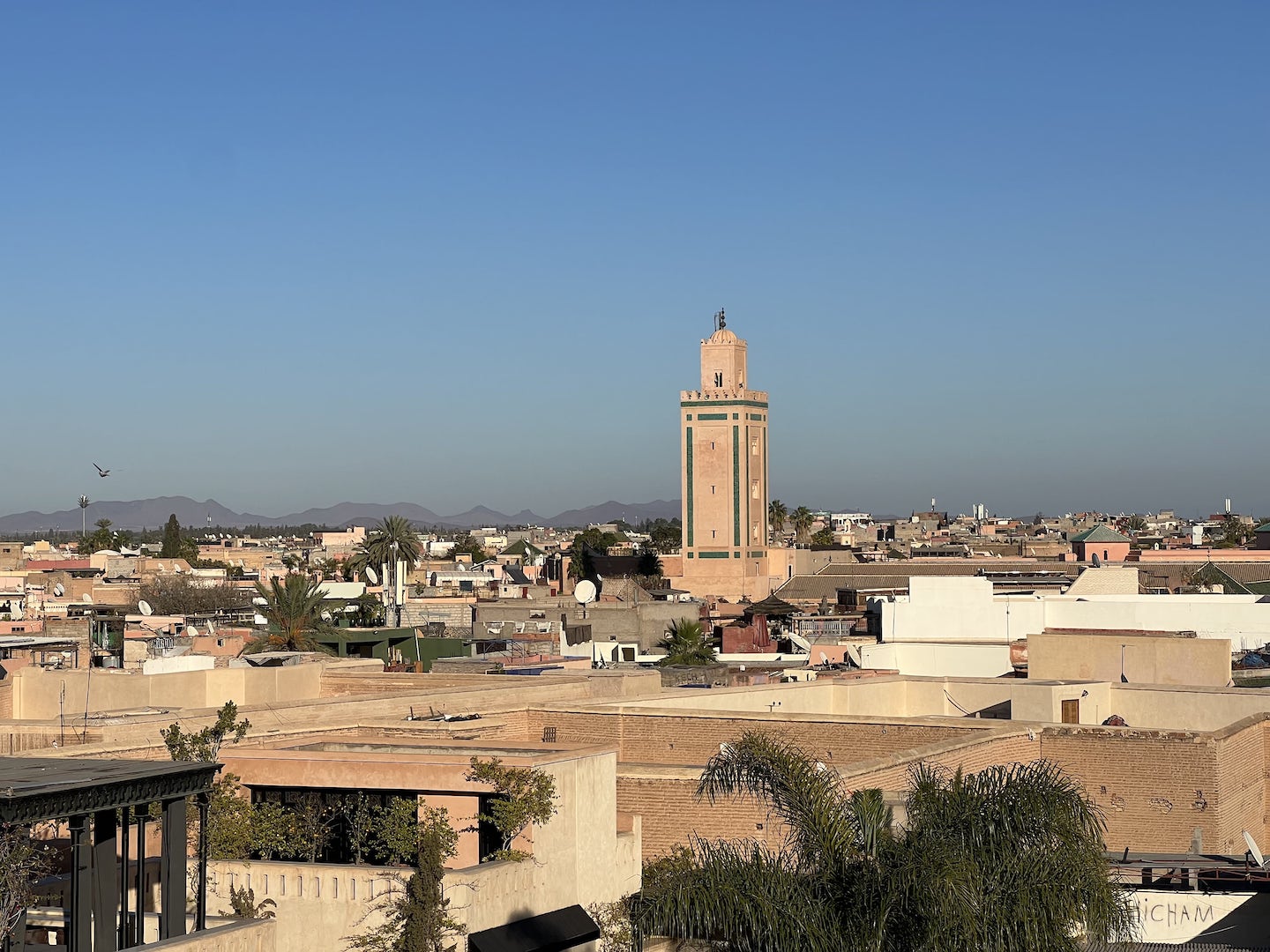
Best Time to Visit Morocco
The best time to visit Morocco is during the spring (mid-March to May) or the fall (September to October), when the weather is mild and pleasant. The summer months can be extremely hot, especially in the desert regions, and the winter months can be chilly, especially in the Atlas and Rif Mountains. It’s also important to note that Ramadan, the Islamic holy month of fasting, can affect travel plans as many businesses and restaurants have altered schedules.
If you’re planning a trip to Morocco in the summer, consider coastal destinations like Essaouira, Casablanca, and Tangier, with a day trip to Chefchaouen and Akchour for swimming.
Visiting Morocco in the winter? This is a prime time to take a Merzouga road trip and camp in the desert. Winter is also a great time to visit places like Marrakech and Fes.
Read my complete guide on the best time to visit Morocco for seasonal and monthly breakdowns, plus when to visit based on the kind of trip you’re looking for.
How to Get Around Morocco
There are several options for getting around Morocco, depending on your budget and level of comfort. This Morocco travel guide covers the most common methods.
Taxis are readily available in most cities, but be sure to negotiate the fare before getting in. For local trips, ask that the meter is turned on. Taxi drivers in Morocco are notoriously tricky (especially in Marrakech and Fes), so keep your eye out for any funny business.
You can also take large shared taxis to get between some cities in Morocco, like Tangier and Chefchaouen. This is a great option for budget travel because you split the fare with the other passengers and only pay for your seat (there are six seats in total). Most Morocco travel guide neglect to mention this option, but it’s truly the best way to travel around Morocco.
There’s generally a central big taxi station in the city run by an operator in a neon vest. Find him and let him know where you’d like to go, and he’ll take you to the taxi departing next.
This method of travel is my favorite and one of the top ways to experience a super local side of Morocco.
But be warned: you may end up waiting quite a while if no one else is going to the same destination. If this happens, you can always pay for the open seats to leave immediately.
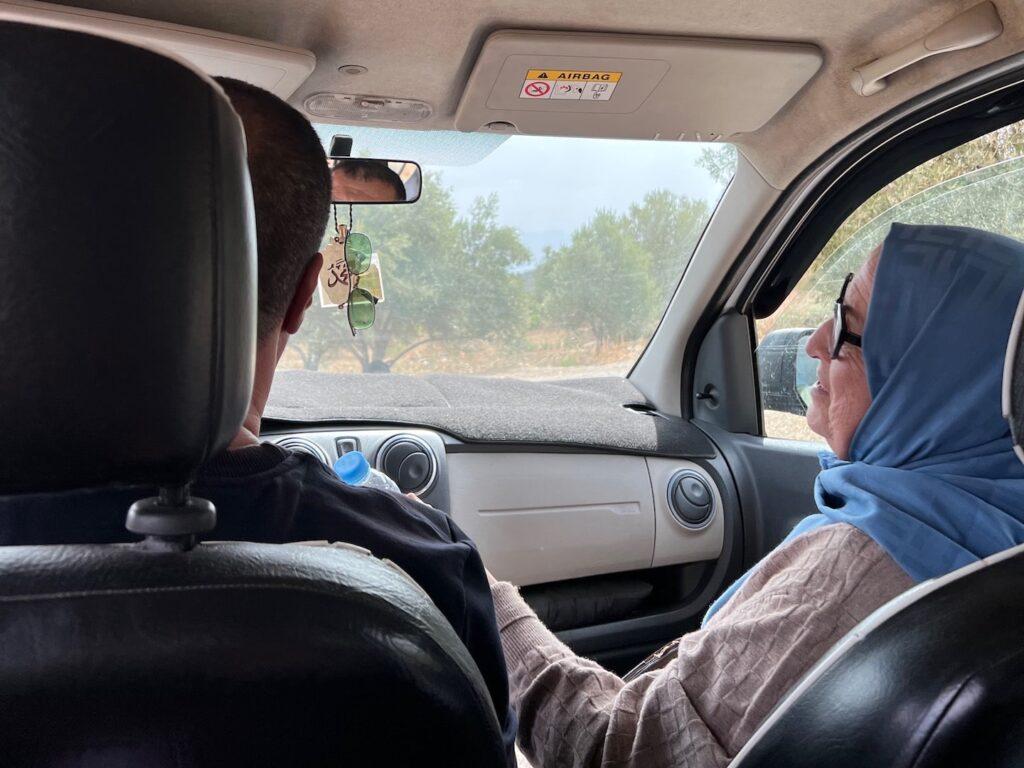
Buses are the cheapest option to travel around Morocco. The main company is CTM , but you can also sometimes book buses called Autocars through ONCF.
Buses can be crowded and loud, but in my experience, they’re super comfortable. They’re also the best option to travel in Morocco with a lot of luggage since there’s limited space in taxis, and train storage can be cumbersome to deal with.
Trains are a great option for longer journeys, with comfortable seating and air conditioning. The main company is ONCF, and you can book tickets in advance through their website or at the train station.
Honestly, second class is just as good as first class, so if you’re torn between the two, save your money. That said, you can see what first class looks like on most Moroccan trains below.
In 2018, Morocco opened a fast train called the Al Boraq (or the TGV) that travels between Casablanca and Tangier in only two hours.
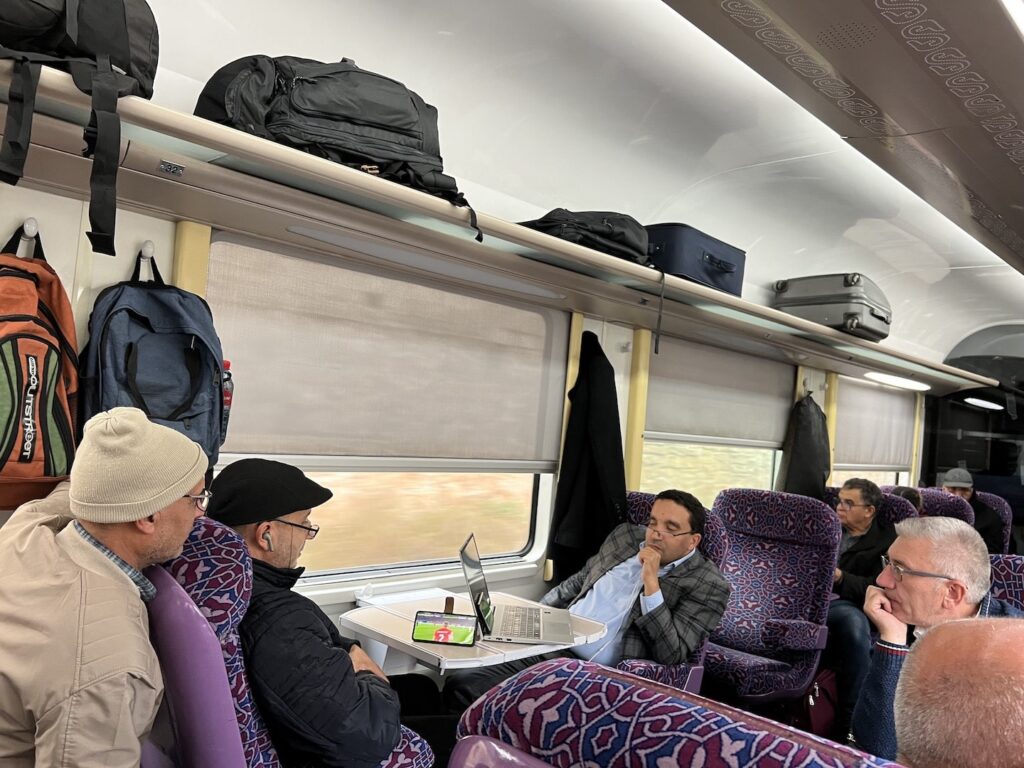
Private Car
For more flexibility, consider renting a private car to take a road trip, especially if you want to visit the desert.
Car rentals are normally around 400 dirhams ($40) for a single day, with as low as 200 dirhams ($20) daily rate for longer rentals.
However, Moroccan driving is pretty lawless, and the roads can be treacherous in some places. If this is a concern, you can always rent a private car with a driver, though this will be much more expensive.
Morocco Accommodation
There are plenty of options for accommodation in Morocco, from budget hostels to luxurious riads.
A riad is a traditional Moroccan house with an interior courtyard, often converted into a hotel or guesthouse. For a unique experience, consider staying in a riad in the medina for a taste of local life. Riads often include rooftops with gorgeous views and traditional breakfast offerings.
There are riads that cater to all budgets throughout Morocco, as well as hotels, Airbnbs, and hostels.
Camping is also an option in some places, particularly in the Sahara Desert.
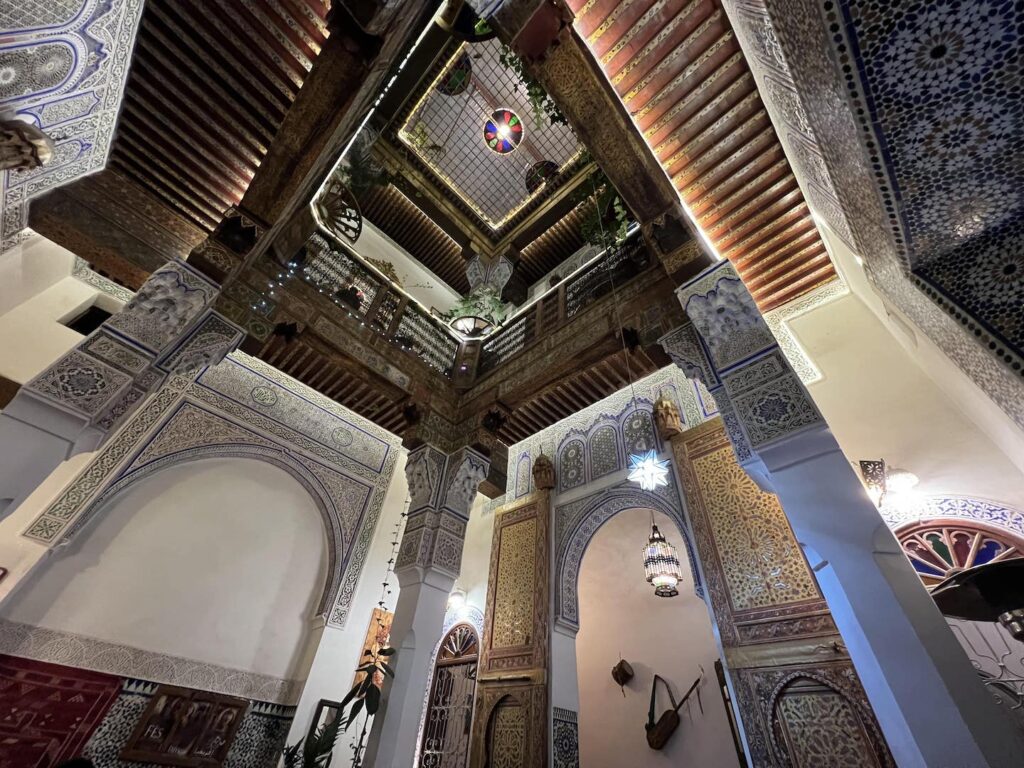
Moroccan Food and Drink
What’s any Morocco travel guide without a food section? Moroccan cuisine is renowned for its flavorful spices and exotic ingredients. It’s unbelievably delicious, with large portions, hearty side dishes, and satisfying meals. There are lots of healthy choices and vegetarian options when it comes to Moroccan food, making it a fairly easy country to enjoy food-wise if you have dietary restrictions.
Main dishes to try are:
- Tagine: A slow-cooked stew made with meat, vegetables, and spices. The dish is named after the conical earthenware pot in which it is cooked.
- Couscous: A staple dish made with small steamed balls of semolina grains, typically served with vegetables and meat. It’s traditionally eaten every Friday.
- Harrira: A traditional soup made with lentils, chickpeas, tomatoes, and spices. It’s often served as a meal during Ramadan.
- Zaalouk: A salad made with cooked eggplants and tomatoes, seasoned with garlic, cumin, and paprika. It’s typically served as a side dish and is super yummy.
- Mint tea: A popular drink in Morocco made with green tea, fresh mint leaves, and lots of sugar. It’s often served as a sign of hospitality.
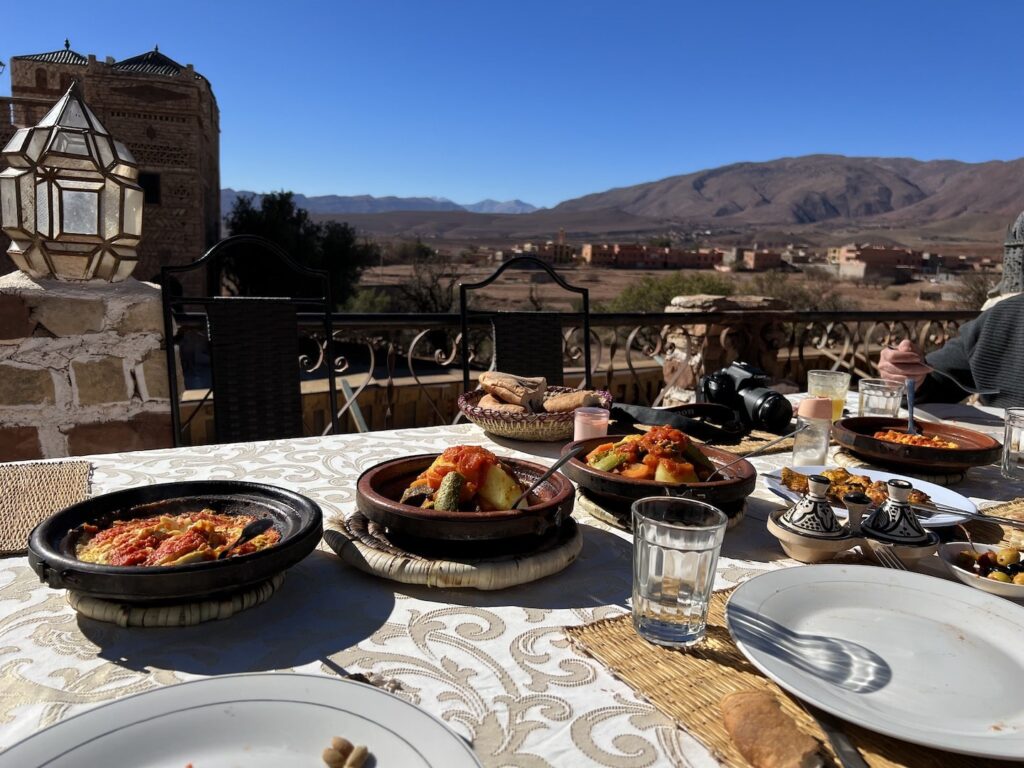
Moroccan pastries are also a quintessential part of the country’s cuisine and any Morocco travel guide. These sweet treats are often made with almonds, honey, and other delicious ingredients.
One of the most popular Moroccan pastries is the “kaab el ghazal,” which translates to “gazelle’s ankles.” This pastry is made with a flaky crust and filled with a sweet almond paste.
Another popular pastry is the “chebakia,” which is made by frying dough that has been coated in honey and sesame seeds (my personal favorites).
These pastries are often enjoyed during special occasions such as weddings or religious celebrations. Don’t leave Morocco without trying some of these delicious treats!
Morocco Bucket List
Morocco is full of unique, captivating, and bucket list experiences. From riding camels in the desert to surfing on the coast, this Morocco travel guide only covers a fraction of the adventures in store. To get you started, here’s a list of some of the best things to do in Morocco.
- Indulge at a traditional Moroccan hammam
- Explore the ancient medina of Fes
- Take a camel trek through the Sahara Desert
- Visit the Hassan II Mosque in Casablanca
- Shop for souvenirs in the souks of Marrakech
- Hike in the Rif Mountains
- Kite surf in Essaouira
- Visit the blue city of Chefchaouen
- Marvel at the Roman ruins of Volubilis
- Visit the coastal town of Asilah
- Take a traditional cooking class
- Go on a road trip along the Dades Valley
- Take a dip in the Akchour waterfalls
- Ride a quad bike through the desert dunes
- Visit the Aït Benhaddou kasbah and learn about its history
- Learn about the Berber culture
- Listen to live Gnaoa music performance
- Explore a desert oasis
- Visit the Ouarzazate film studios
- Go skiing in Ifrane
- Drink mint tea on a rooftop or in a city square
- Eat a traditional Moroccan breakfast
- Try Moroccan pastries
- Learn about the Jewish history in Morocco
- Go on a glamping trip in the desert
- Take a road trip along the Atlantic coast
- Go on a multi-day horse tour
- Take a day trip to stunning Moulay Idriss Zerhoun
- Explore Tetouan and its Andalusian architecture
- Take a hot air balloon ride over the Atlas Mountains
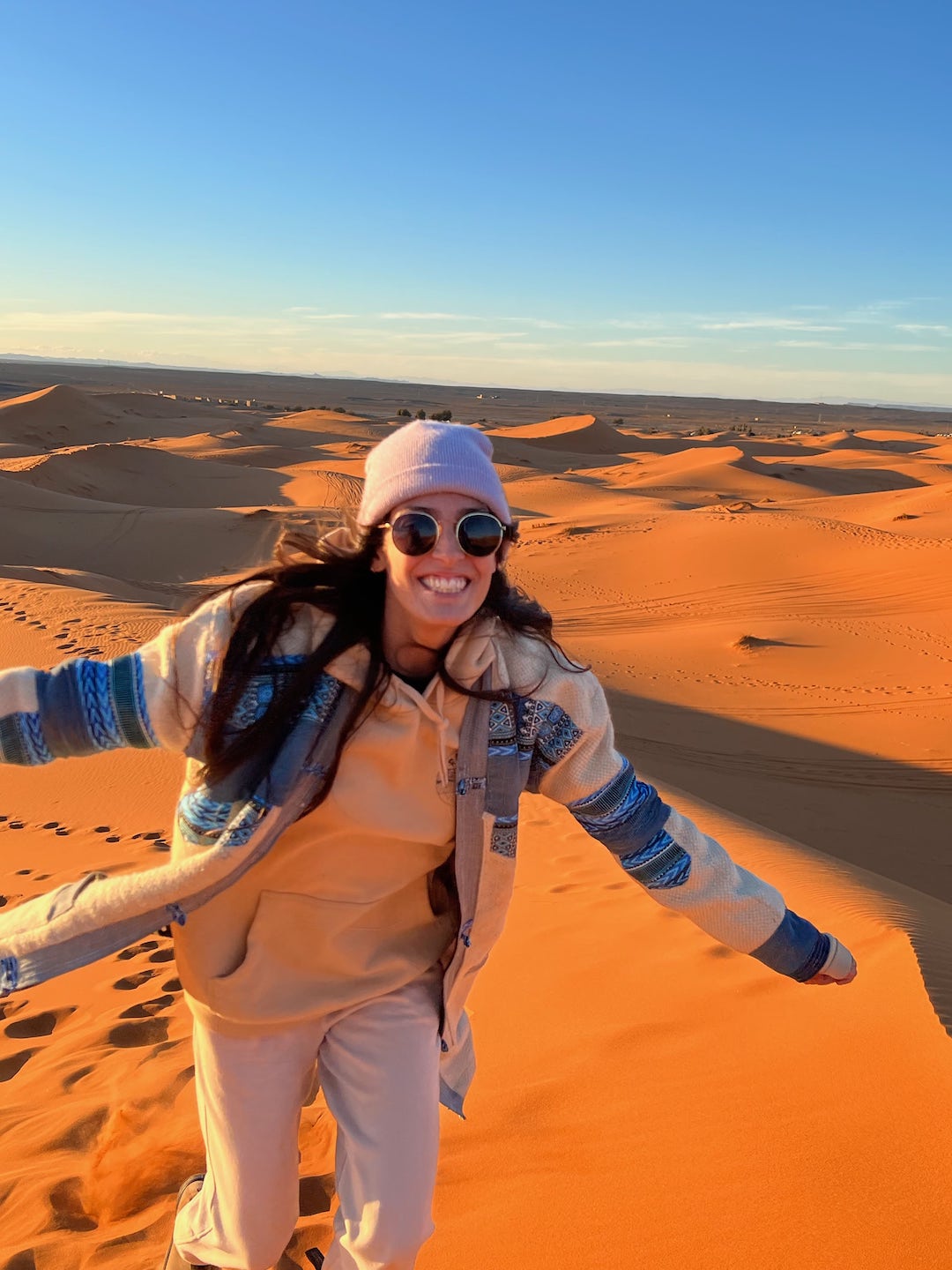
What to Know Before Going to Morocco
Like most countries, there are a few key things to know before going to Morocco to have a safe and enjoyable trip.
- Pack in a backpack instead of a roller bag if possible because medinas can be crowded, with steep hills, many stairs and no car access.
- Dress appropriately, especially if you’re a woman. Morocco is a conservative country, and it’s important to respect the local culture. For women, this means dressing modestly and covering your shoulders and knees.
- Carry cash with you, as many places don’t accept credit cards.
- Since Morocco is an Islamic country, the Call to Prayer happens five times a day. The first one happens before sunrise, and the last one happens just after dark.
- Avoid displays of public affection, which are frowned upon.
- Alcohol is not widely available in Morocco due to the Muslim religion. However, there are bars in some cities like Marrakech and Tangier. There are also some restaurants in larger cities that serve alcohol. You can also buy booze at some large grocery stores.
- Avoid drinking tap water, and opt for bottled water instead to avoid getting sick.
- Watch out for common scams, which I get into below.
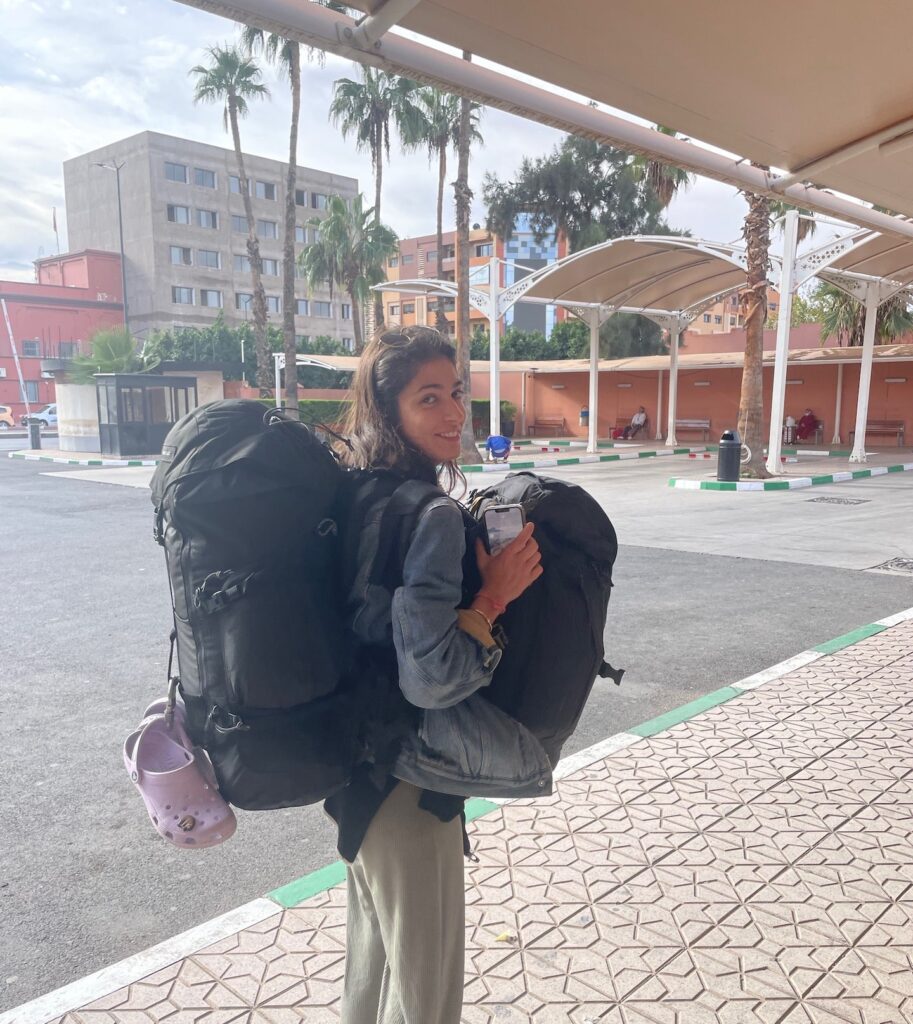
Common Scams in Morocco
Morocco is generally a safe country, but like any tourist destination, there are some scams to watch out for. I figured I’d throw them into this Morocco travel guide so you know exactly what to look out for.
These are a few of the most common:
Faux Guides : These are people who pose as official guides and offer to show you around the city. They may be friendly at first, but they will often take you to overpriced shops or try to pressure you into buying things you don’t need.
To avoid this scam, only hire official guides through your hotel or a reputable travel agency. You can also ask for recommendations from other travelers or locals. If someone approaches you as a tour guide, ask for their official badge.
Overpriced Souvenirs: In the markets (known as souks), vendors will often try to sell you items at a much higher price than they’re worth. They may also use high-pressure tactics to get you to buy more than you need.
To avoid this scam, always negotiate the price before buying anything. Start by offering about half of what the vendor is asking, and be prepared to walk away if the price doesn’t come down.
“It’s Closed”: In some cities in Morocco, especially Fes, you may be walking in the medina, and someone will tell you, “it’s closed,” and try to steer you somewhere else. After falling for this scam dozens of times, I finally realized they were lying… every. single. time.
Pickpocketing: Pickpocketing is fairly common in Morocco, especially in crowded areas like markets, large squares, and train stations. Thieves may work in groups to distract you while they steal your wallet or phone.
To avoid pickpocketing, keep your valuables close to your body and be aware of your surroundings. Wear a money belt or keep your wallet in a front pocket rather than a back pocket. You should also avoid pulling out large sums of money at once when paying for things.
Fake Transportation: In major tourist destinations like Marrakech, you may encounter people offering transportation to nearby destinations. These may be scams, and you could end up paying a lot of money for a subpar experience.
To avoid this scam, only get in official (clearly marked) taxis and book tours and longer transportation through your hotel or a reputable travel agency. Don’t be afraid to ask for recommendations or read reviews online before making a booking. If something doesn’t feel right, it probably isn’t.
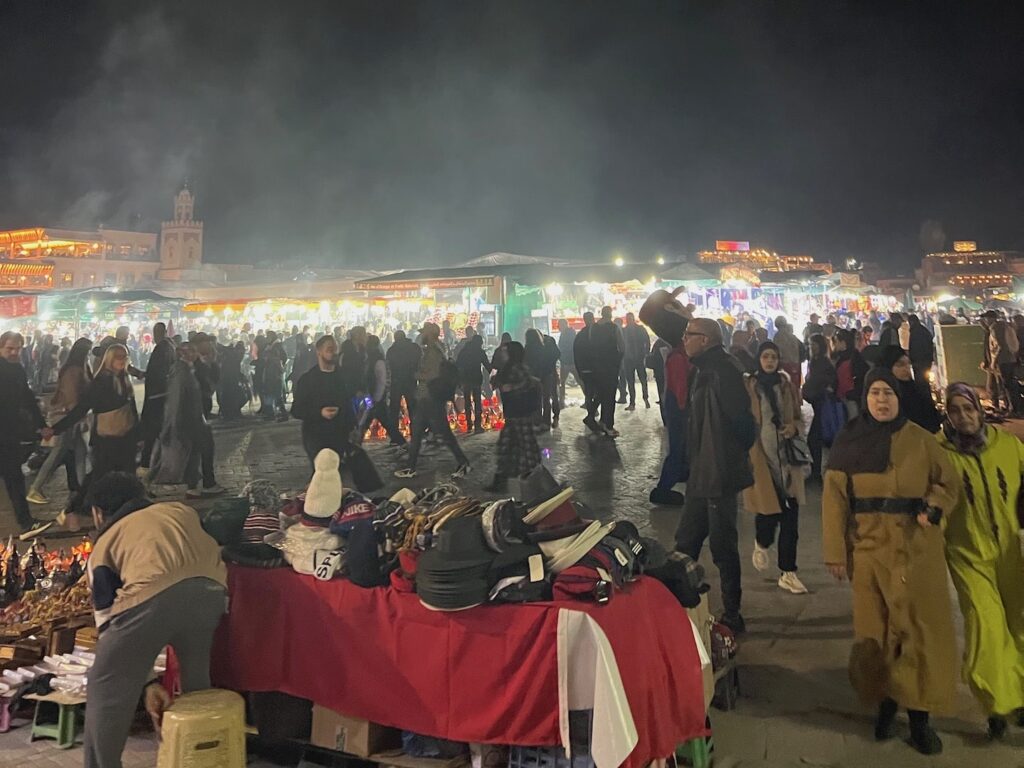
How to Stay Safe in Morocco
While Morocco is pretty safe, it’s still important to take precautions. These are a few final tips for this Morocco travel guide to help you stay safe:
- Keep an eye on your belongings at all times, especially in crowded areas.
- Be cautious when using ATM machines, and avoid withdrawing large sums of money at once.
- Don’t walk alone at night, especially in unfamiliar areas. Medinas can be particularly hard to navigate after dark, so be sure to have clear landmarks.
- Keep all valuables out of sight in your room, and locked if possible.
- It’s best to leave the flashy jewelry at home.
- When paying for something, don’t pull out all of your cash at once. Otherwise, you may become a target quickly.
- Like with any international trip, always carry your passport safely with you.
With these few things in mind, you’ll have a stress free trip to Morocco
Morocco Travel Guide FAQs
How many days is enough for morocco.
The number of days that you need to see Morocco is between 7 and 10 days. This will give you enough time to see a couple of cities and take a quick road trip to the desert. In two weeks, you can experience the mountainous inland of Morocco and its ancient medians, as well as the stunning Atlantic coast.
Do I need a visa for Morocco?
Morocco has a 90 day visa waiver for many countries, including the USA, Canada, UK, EU, Australia, New Zealand, and beyond. Just ensure you have a valid passport with at least one blank page. And keep in mind that the visa is for 90 days not three months.
Is Morocco friendly to tourists?
Overall, Morocco is a very friendly country to tourists. There is a lot of accommodation, abundant tour guides, and ample transportation options that allow anyone to travel Morocco with ease. You may come across petty crime while in Morocco, like pickpocketing and tourist scams, but there are no real major safety concerns for tourists. The people in Morocco are also well known for being friendly and hospitable to visitors.
What is the best month to visit Morocco?
The best month to visit Morocco is June to enjoy the Atlantic coast and northern destinations like Tangier and Chefchaouen. If you’d prefer a trip to cities like Fes, Marrakech, and Merzouga, the best month to visit is September, when it’s warm but no longer scorching in the south.
Where should I go for the first time in Morocco?
For your first time in Morocco, visit iconic cities like Fes and Marrakech, with a road trip to the desert. It’s also worth leaving room in your itinerary to visit smaller, equally enchanting destinations like Essaouira, and cities in the north of Morocco, like Chefchaouen, Tangier, and Asilah. The south and north of Morocco are drastically different, so if possible, try to experience both areas to get a full picture of this beautiful country.
Is Morocco cheap for tourists?
By western standards, Morocco is definitely cheap for tourists. It’s a super budget friendly destination with lots of inexpensive accommodation, attractions, shopping, and food. Morocco is also the land of luxury, with plenty of upscale hotels and experiences. It’s easy to score a deal on an opulent riad or multi-course dinner, even if you’re on a tight budget. Morocco truly caters to all price ranges, making it one of the top destinations for any travel lover.
Read More From the Morocco Travel Blog
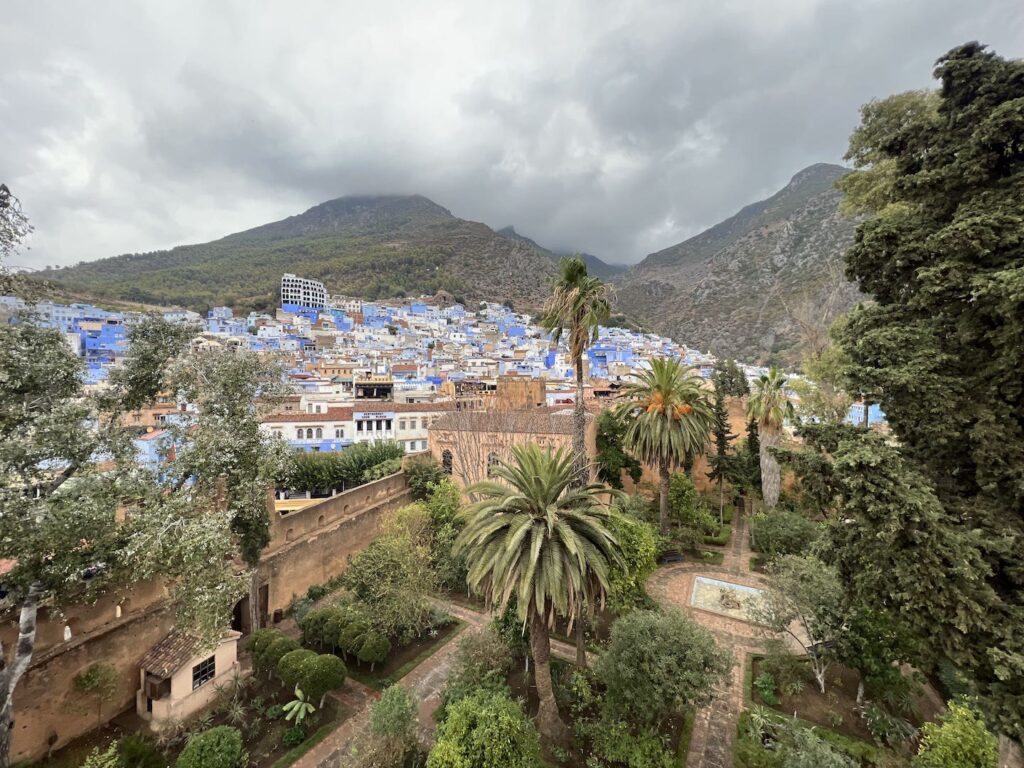
How to Get to Chefchaouen, Morocco By Taxi, Bus, & Private Car (2024)
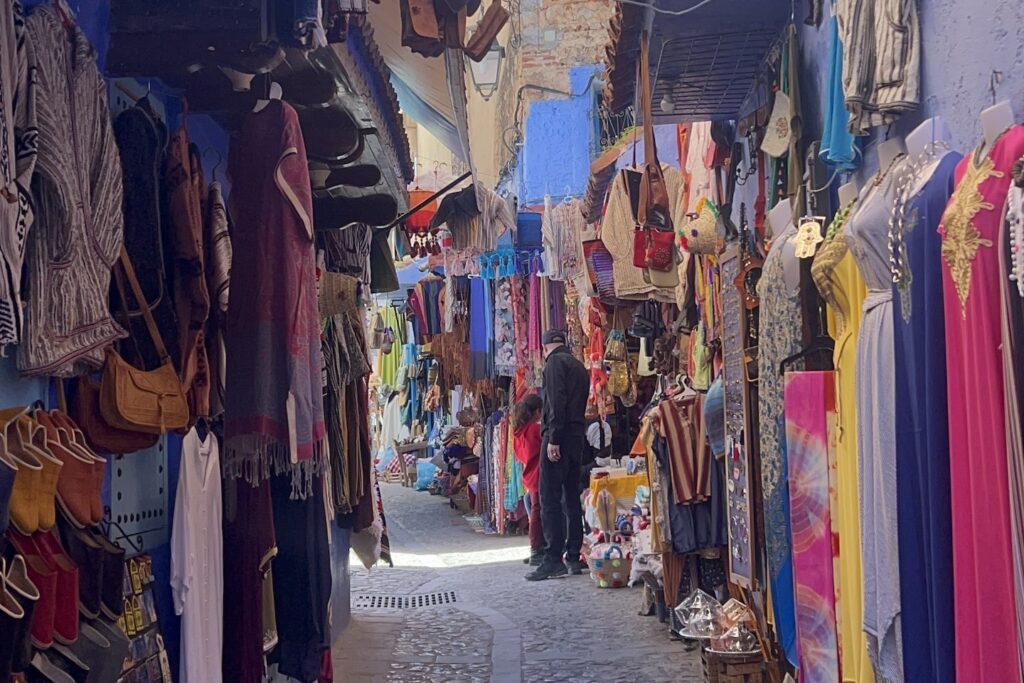
Best Time to Visit Chefchaouen: Seasonal + Monthly Breakdown
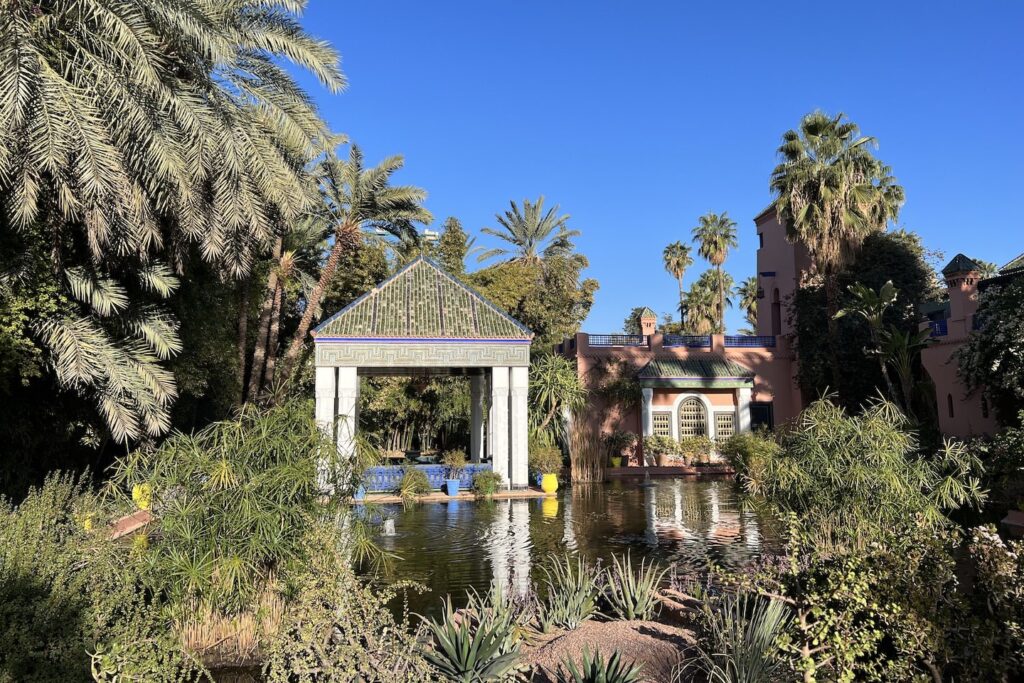
Best Time to Visit Morocco: When & Where to Go
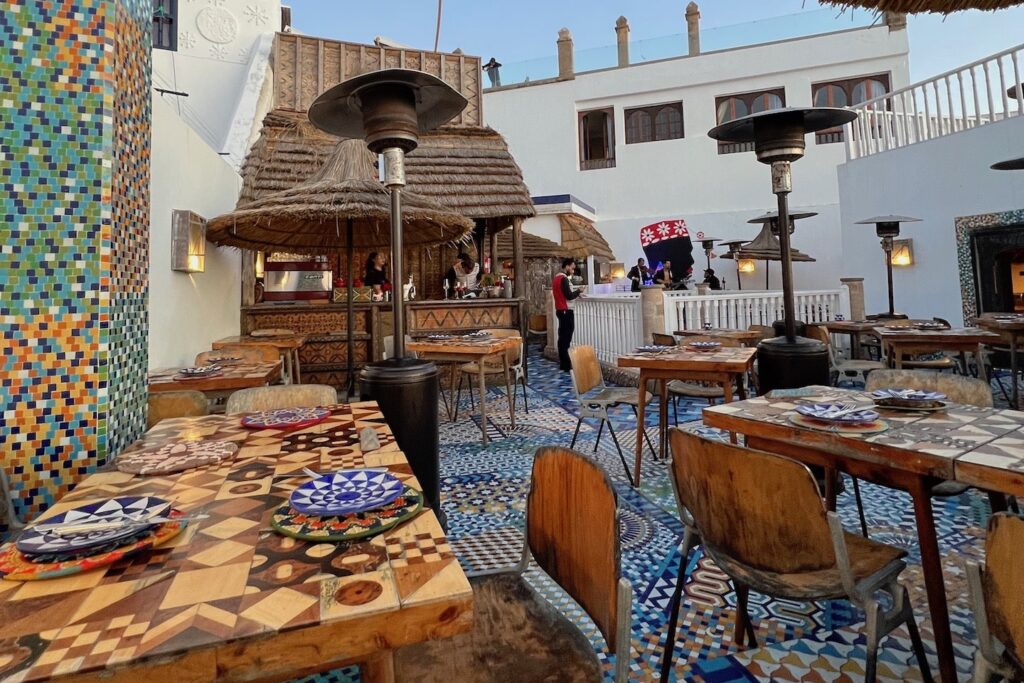
12 Best Restaurants in Essaouira (2024): The Ultimate Foodie Guide
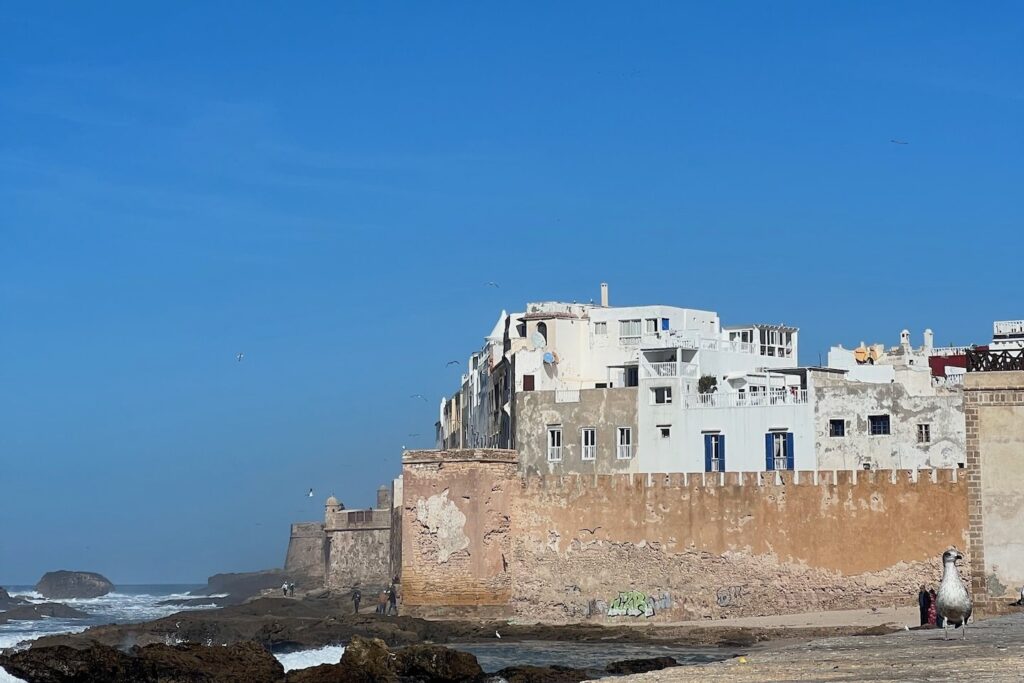
Essaouira Travel Guide 2024: Essential Information + Insider Tips
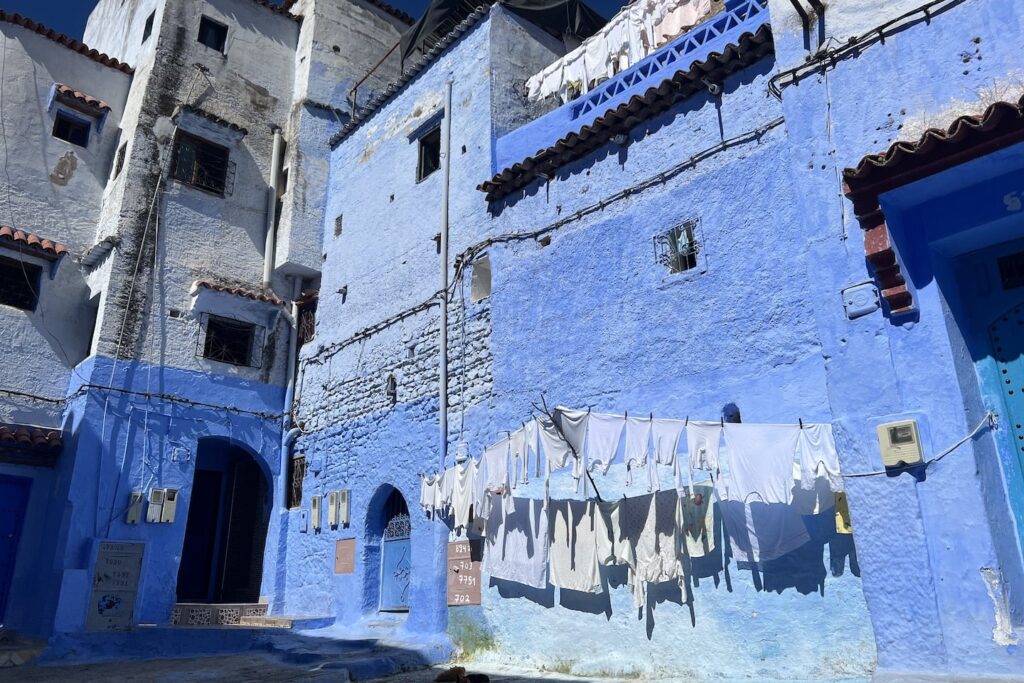
Chefchaouen Travel Guide (2024): Insider Tips + Pictures
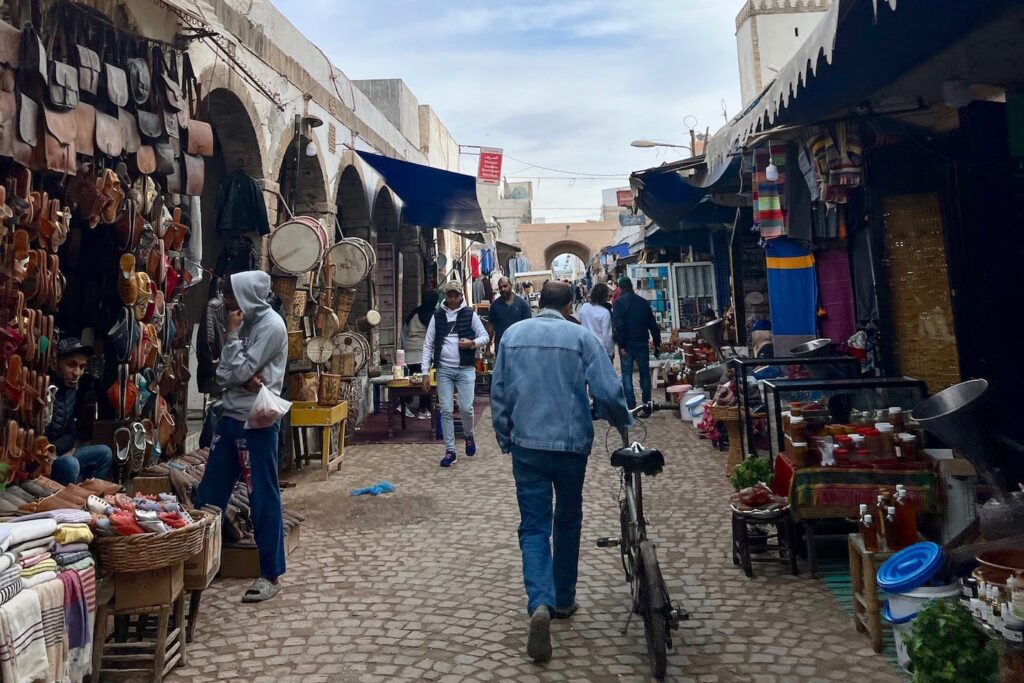
Best Time to Visit Essaouira (Season + Monthly Breakdown)
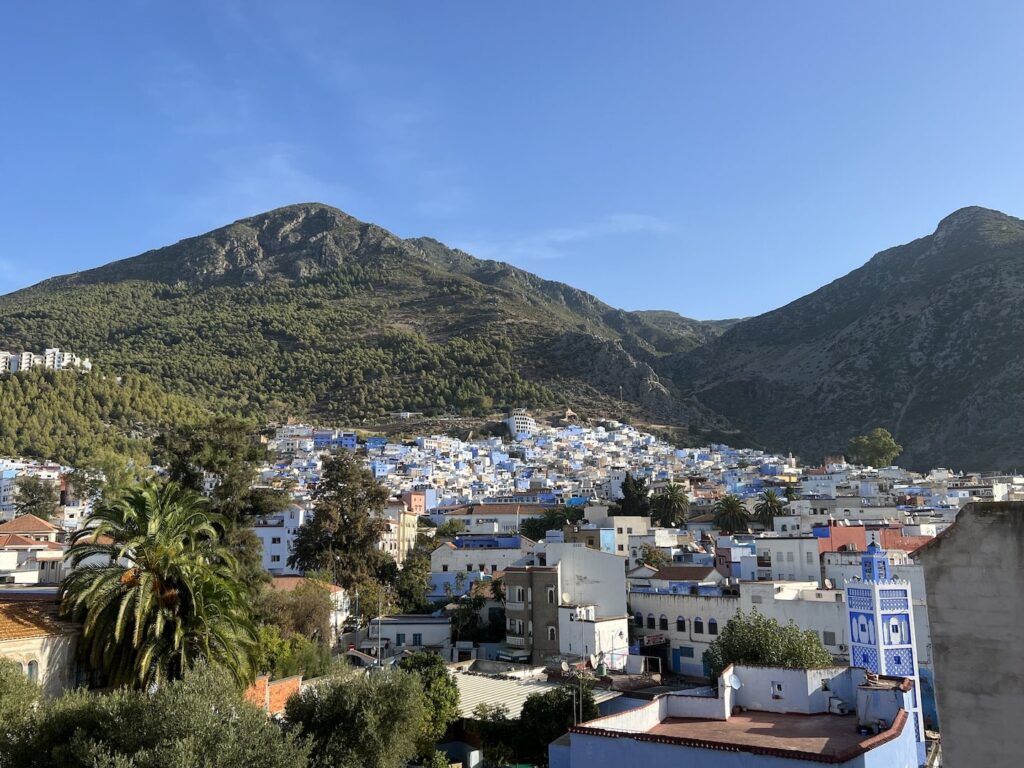
17 Unique Things to Do in Chefchaouen (With Pictures!)
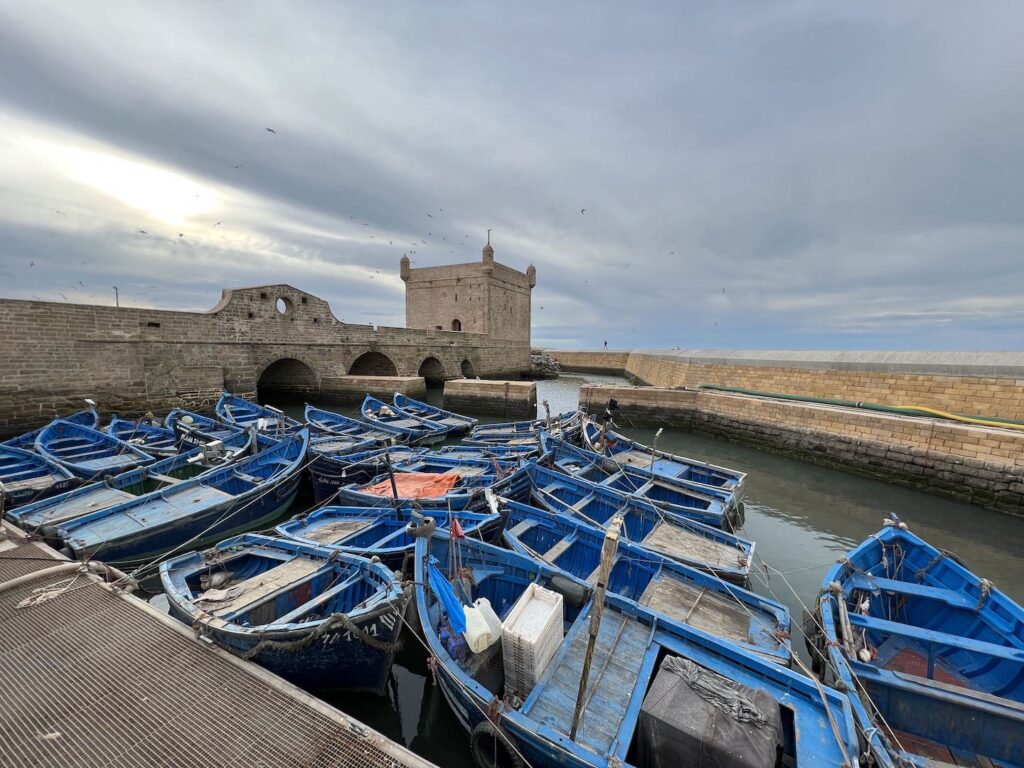
19 Things to Do in Essaouira in 2024 (+ Insider Tips)
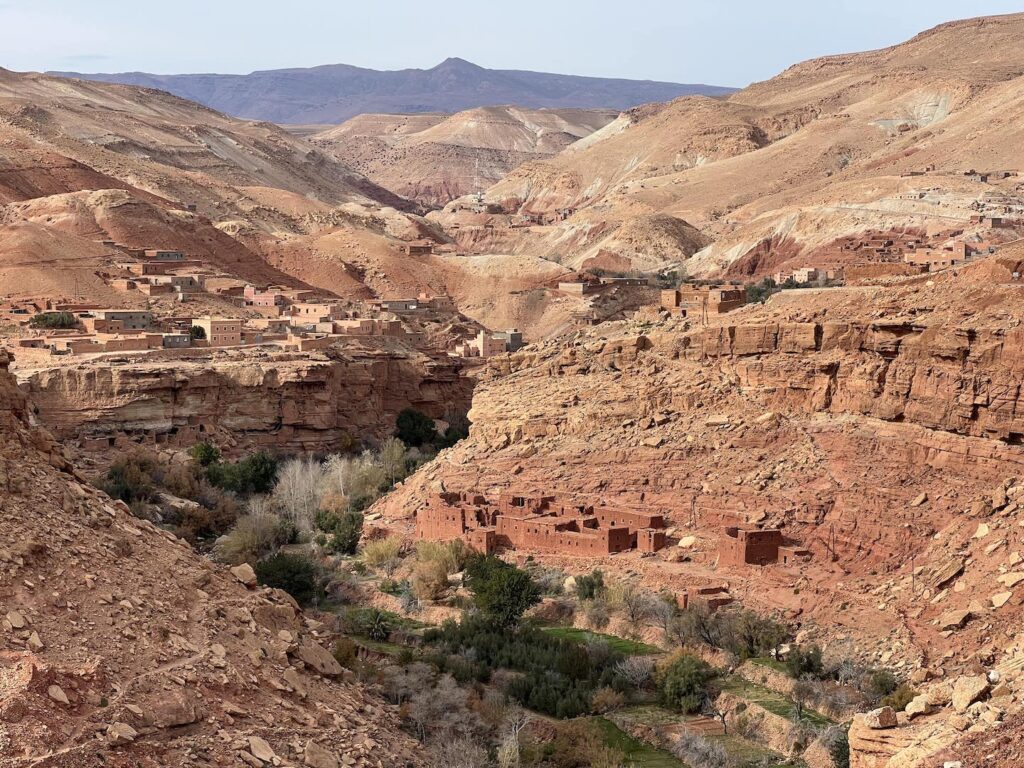
17 Captivating Places to Visit in Morocco (2024)

21 Things You Must Know Before Visiting Morocco Travel Tips
- Africa / Fez / In the City / Marrakech / Morocco
- 33 Comments
Visiting Morocco? This is what you need to know before visiting.
More and more people are visiting Morocco every year. It’s a beautiful country, and as photographers and videographers, we had a field day.
On the flip side, there were also downsides to visiting especially as a woman. If you plan on going, we put together a few pointers to help you set realistic expectations and prepare for your trip.
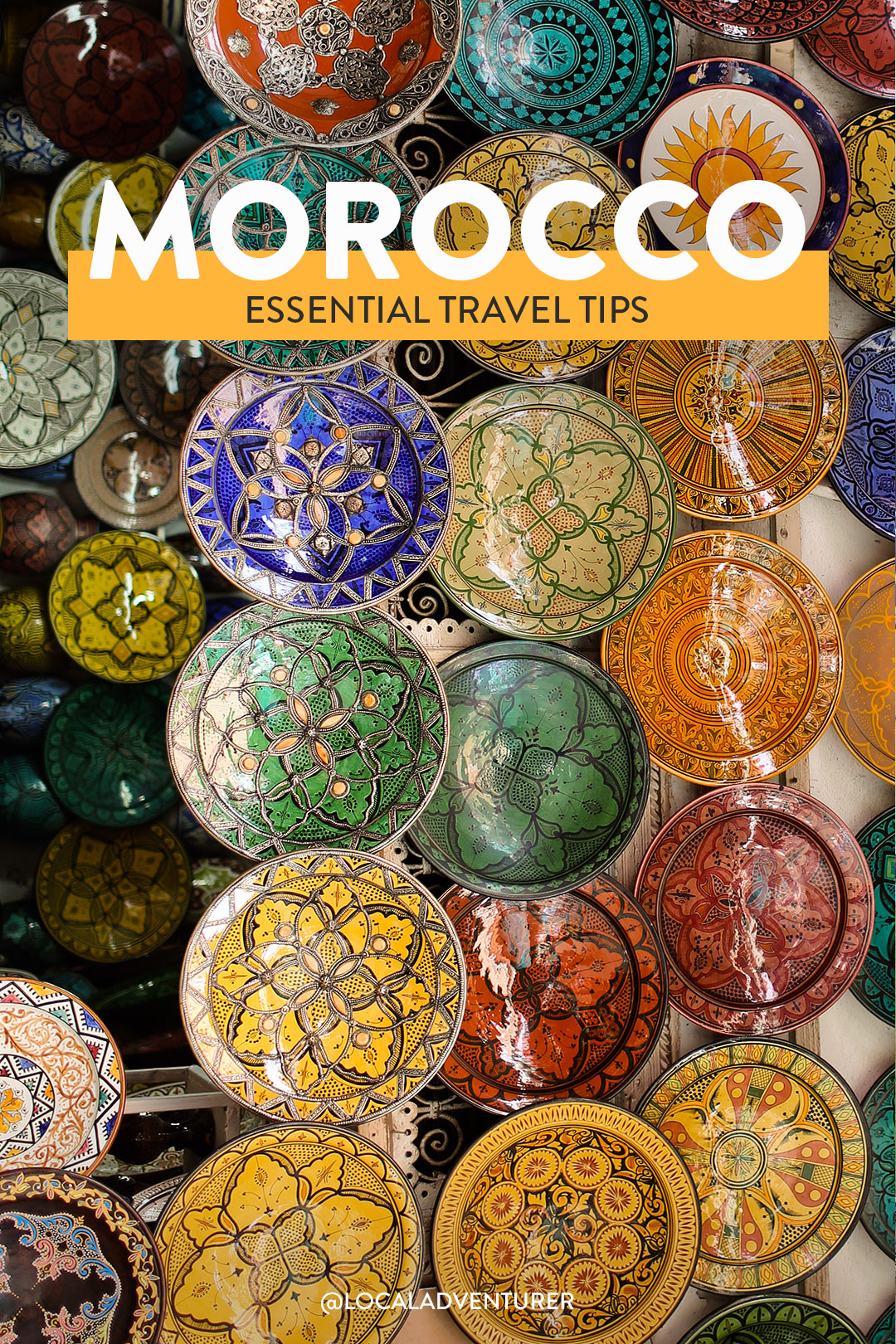
Thank you Contiki for hosting our trip. See our full 15 day trip itinerary here . All opinions are always our own. This post may contain affiliate links, where we receive a small commission on sales of the products that are linked at no additional cost to you. Read our full disclosure for more info. Thank you for supporting the brands that make Local Adventurer possible.
Last Updated: March 16, 2023
− − Content Menu
21 things you must know before visiting morocco, best places to stay in morocco, planning checklist, more resources, 1. dress appropriately.
Overall, guys can dress however they like, but women need to dress more conservatively. Although you see many tourists wearing whatever they want, we chose to cover up as much as possible to avoid unwanted attention.
Even if you’re traveling with a group of guys, you may still get harassed. Some of the girls in our group got groped on multiple occasions even though we were paired off with a male buddy.
It was mostly really old men, and it happened more often in crowded places. When visiting mosques, you need to cover down to your wrists and ankles.
For the ladies out there, keep a shawl / scarf handy (this one is reversible and great for traveling light)
See More: What to Pack for Morocco – 2 Weeks in a Carry On
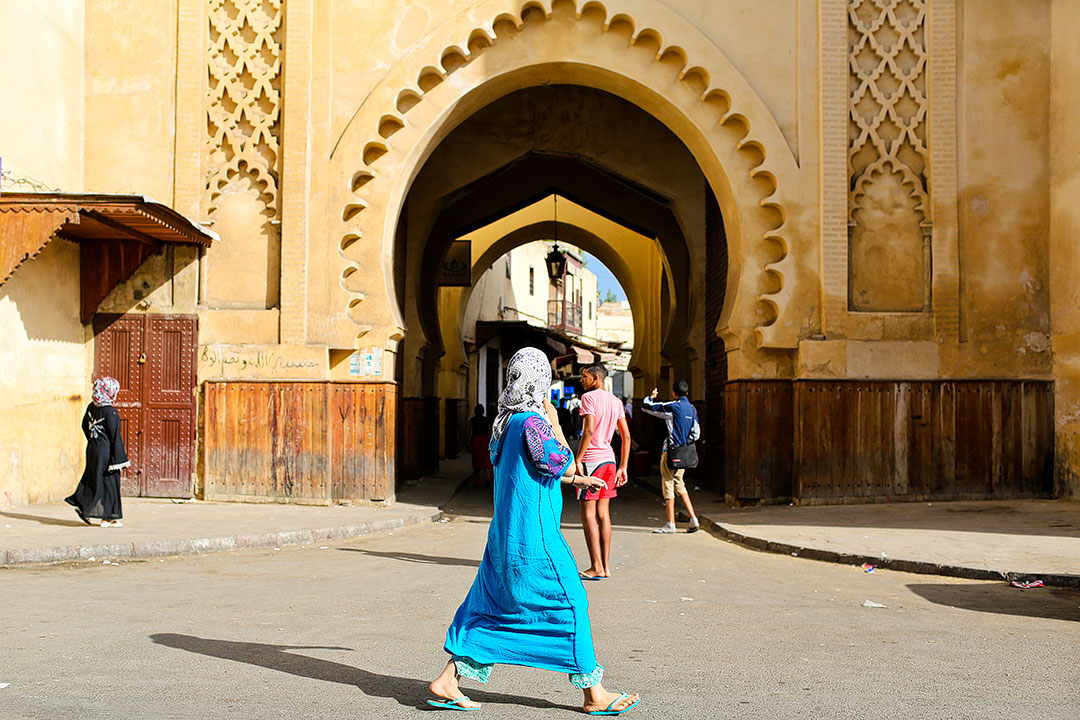
2. Currency and Cost
More established shops will take credit cards, but most smaller markets, street vendors, and cabs will not. Be ready with the local currency.
The Moroccan Dirham (DEE-rahm) goes for roughly 10.4 Dirhams (DH) per 1 USD or 11.09 per 1 euro. We thought things would be cheaper in Morocco, but the prices were comparable to Europe because of how touristy the country has become.
Our guide recommended that each person exchange 100 euros daily, which was plenty for us.
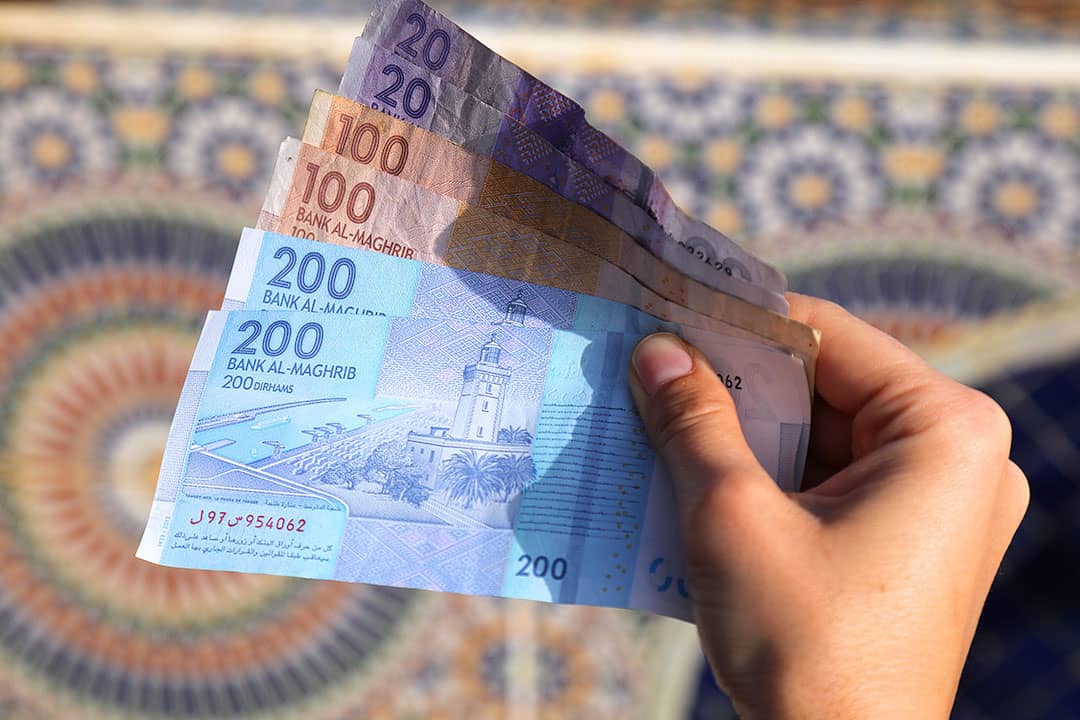
3. ATMS Can be Hit or Miss
Exchange enough money when you get your chance. Ask the front desk at your hotel; they may have money to exchange.
The ATM quickly ran out when our entire group was trying to exchange money. Who knew ATMs can run out of money!
A few people from our group thought the ATM was giving an error and tried multiple times, but the ATM didn’t dispense any while still charging it from the bank for every attempt.
Also, traveler’s checks are pretty much useless in Morocco. It’s hard to find a place to cash them.
4. Keep Correct Change with You
Moroccan cab drivers rarely “have change” when you need it. At least, that’s what they tell you. To avoid overpaying, keep your coins.
Most of our cab rides within the city cost roughly 30 Dirhams. The dilemma with keeping change though is that you will not be able to exchange it back when leaving the country since they only want larger bills.
You want to keep correct change while you’re in the country, but you also want to spend it all before leaving.
5. Learn to Haggle
If you’re shopping in the markets or medinas, you will have to learn to haggle. I know some people have strong opinions about paying full price for the sake of “charity”, but selling is like their national sport and haggling is an integral part of their culture.
More likely than not, they will still get the better deal, but keep in mind if you are willing to spend the time, you can get items for at least 25-50% of the starting price.
Know what you’re willing to pay before you start the haggling process and walk out if you can’t get the price you want. They may call you back multiple times.
Also, you may want to bargain with your cab drivers before getting in. Most of our rides within the city cost 30 DH. If they demanded more, our guide told us to hand them the money and walk away.
Luckily, that didn’t happen to us because we always firmly set a price before the ride.
If you’re looking to buy a carpet or anything with a higher price tag, do your research before visiting Morocco. People get tricked into buying them as “an investment” to sell later. Don’t fall for their sales tactics and the local guide’s added pressure to buy.
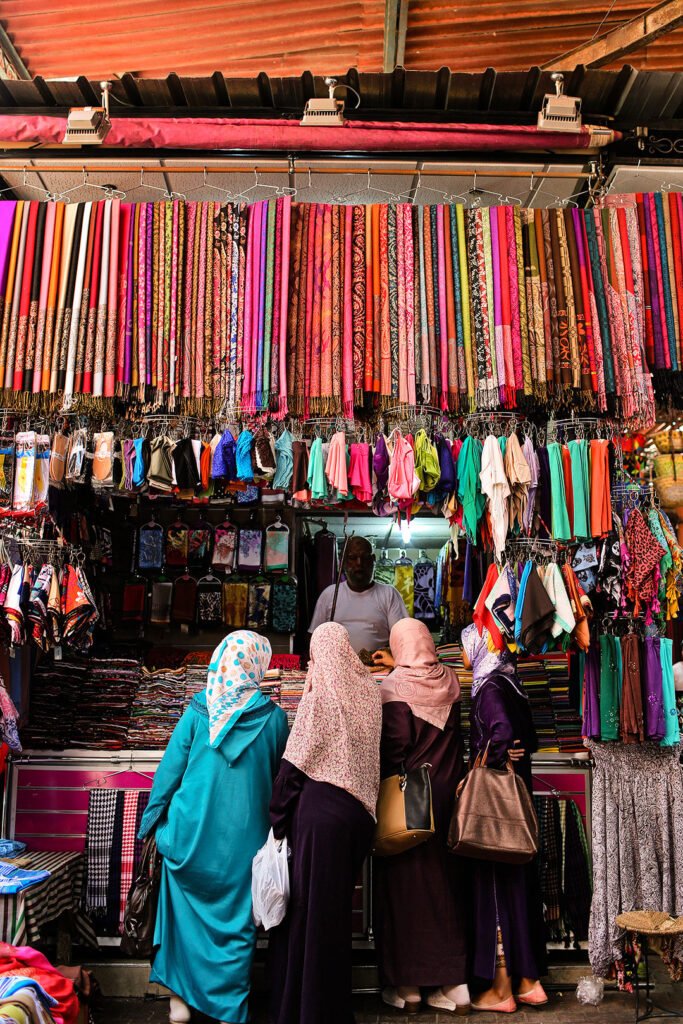
Have some change ready for tips. A good general rule of thumb is 1 DH at a local place and 3-5 DH at nicer places.
7. Be Wary of Local Guides
You should absolutely hire a local guide to help you get an inside perspective on the country and navigate through the maze of the medinas (old towns). However, be sure you know what you’re getting yourself into.
The local guides have built relationships with many different stores, and they are most likely getting a cut of the sales. Don’t be fooled when they say they are trying to help you haggle to get the best price, because they usually aren’t. We were able to get better prices without them. This happened in Fes.
See More: 21 Amazing Things to Do in Fes Morocco
8. Stay Away from Strangers Offering Free TOurs or Directions
Even if you don’t hire a local guide, you might find other locals offering you tours while you’re walking around the markets and medinas.
If you go with one of them you may end up completely lost and pressed to spend money. Most of the time they will ask for a tip afterward too.
This is the same with asking for directions. A lot of them will offer to walk you to where you’re going but then ask for a tip. If you’re so inclined, always keep money to pay them off, plan ahead and ask your hotel, or pull up some maps when you have WIFI.
Also, if you are renting a car in Morocco so that you can get around on your own, be sure to plan ahead rather than wait until you are there.
9. Fridays are Holy Days and Prepare for Holidays
Keep in mind that it is a Muslim country, so pay attention to their holidays otherwise you might be there when everything is closed.
Also, most shops and attractions will close on Friday since it’s their holy day.
A friend of mine went during Ramadan and told me it was very difficult to eat meals. We happened to arrive in Morocco on Eid al-Adha, where they were slaughtering and sacrificing animals on the street.
All shops we saw closed that day and most shops were closed the following day.
Plus it was a bloody mess, most of which we avoided. Below you can see what is usually a crowded marketplace is deserted.
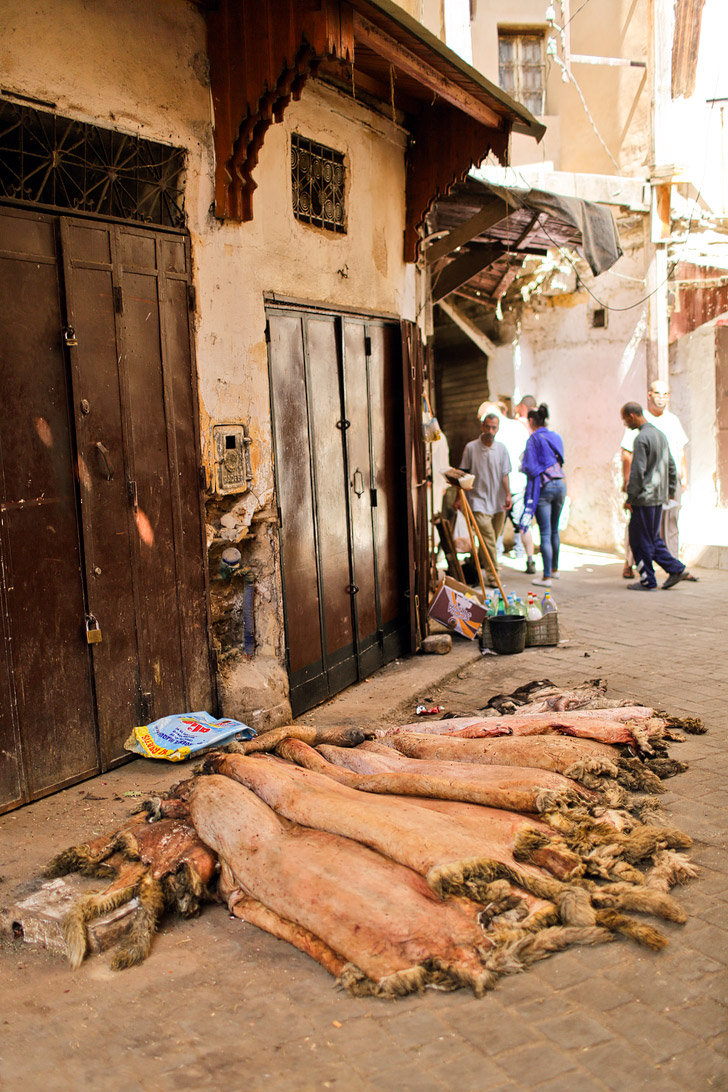
10. Be Careful what Water You Use
To stay safe, drink bottled water and even use it to brush your teeth. Also, avoid using any ice when you’re out. The LARQ Self-Cleaning Water Bottle is really useful when you’re in Morocco if you don’t want to buy a ton of bottled water. See all the top travel water bottles we tested on the road.
11. Pack Some Imodium
I don’t care how strong you think your stomach is, you should pack some Imodium just in case. This is always a good rule of thumb for all travel.
At least a third of our group wasn’t feeling well after the first meal in Morocco. I popped a couple of Imodium, and I was fine the next day. Others were not so fortunate.
See More: 21 Moroccan Foods You Must Try
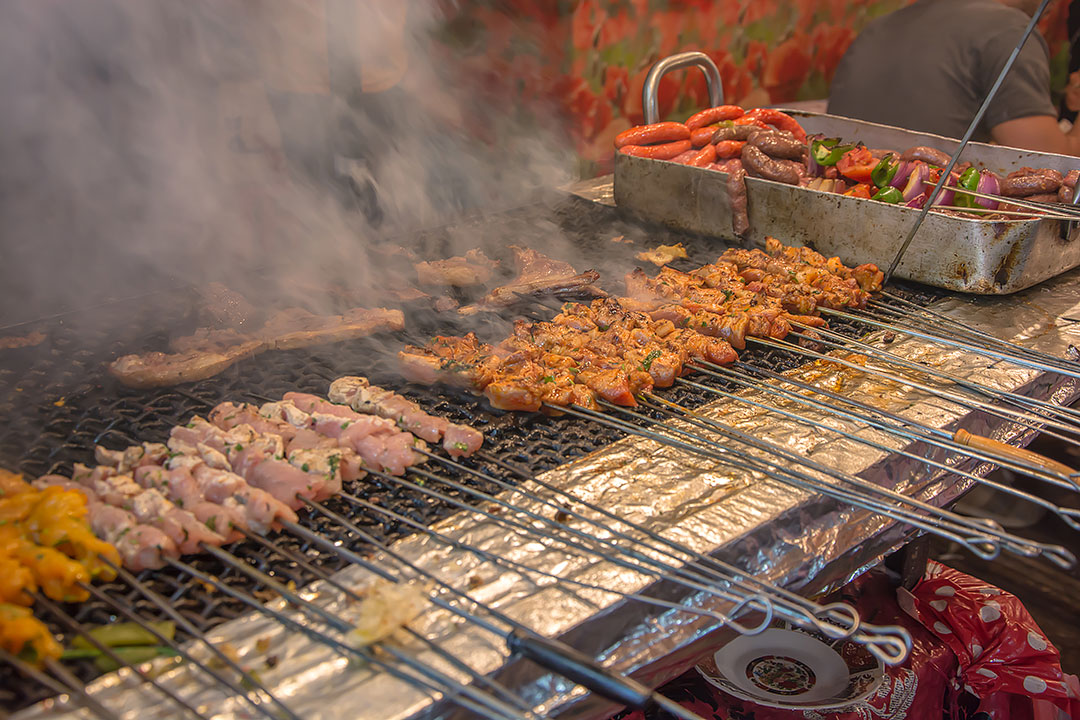
12. Watch Your Pockets
Most Moroccans are friendly and honest, but you should always be careful with pickpockets in any major city, especially in crowded places like the markets. Pickpockets often target touristy areas.
13. What Language Do they Speak?
Moroccans speak a mixture of Arabic, Berber, English, and French. You’ll be fine with English in most of the larger cities, but you’ll probably need a translator in the rural parts of the country.
Here are a few basic Arabic words that came in handy:
- Hello (Peace Be With You): Salam Alikome (salaam a eleikum)
- Thank You: Choukran (shokran)
- No Thank You: La Choukran (la shokran). This one is useful when you have a bunch of street vendors hassling you to buy something.
- Watch Out: Balak. Although you won’t use this yourself, you’ll most likely hear this in the medinas or souks (outdoor markets). Locals will say balak if coming by with a mule, motorcycle, or cart to warn you to either get the side or get run over.
14. Visiting Mosques
If you’re hoping to see a Mosque while visiting Morocco, you might be out of luck unless you’re Muslim. Most mosques are off-limits to non-Muslims, with the exception of the massive Hassan II Mosque in Casablanca. They are still beautiful to take photos from outside though!
If you’re looking for beautiful architecture, Bahia Palace is open to visitors.
See More: 21 Fascinating Things to Do in Marrakech Morocco
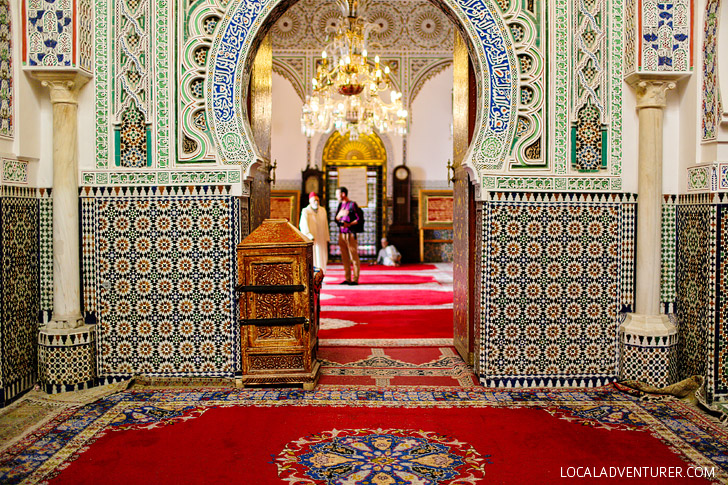
15. Alcohol, Drugs, and Parties?
Although most Moroccans are Muslims, yes, they still have all these. Hashish, an extract of the cannabis plant, is quite commonly offered to you in the streets.
Contiki loves their parties, and we were told that only hotel bars had alcohol available for tourists, but we surprisingly found several bars and even nightclubs serving alcohol.
We decided we didn’t want to pay 300 DH (30 euros) to get into a club that already appeared like a sausage fest from the outside.
They also told us it’s pretty typical for prostitutes to hang out at nightclubs there too. There was a special DJ guest that night, but normally the club was supposed to cost around 150-200 DH.
16. Do I need a Visa or Vaccines?
Almost all English-speaking countries (except South Africa and Australia) do not require visas to enter the country. The CDC also doesn’t require any vaccines although many would recommend Hepatitis A and Typhoid shots. Find out more details from CDC here for the most updated information on vaccinations before visiting Morocco.
17. Have the RIght Converters
Don’t get stuck in Morocco without a way to charge all your electronics. We recommend picking up one of these so that you have options for wherever you travel and additional outlets in case there aren’t many in the hotel room.
Morocco uses the following: Voltage: 220 V, Frequency: 50 Hz, Power sockets: type C / E. If you have something that works in Europe, then it will be the same. If you’re traveling from the states, the adapter will help you get everything charged.
18. Ask Before Taking Photos (And You may have to Pay)
When you’re walking through the markets, be careful when taking photos of people and shops. Unless you are purchasing something, they may get angry at you and even demand money for the photos.
When we took photos of the snake charmers, we paid 20 DH. Some may even hassle you for more, so again, it’s good to first establish a price before taking a photo.
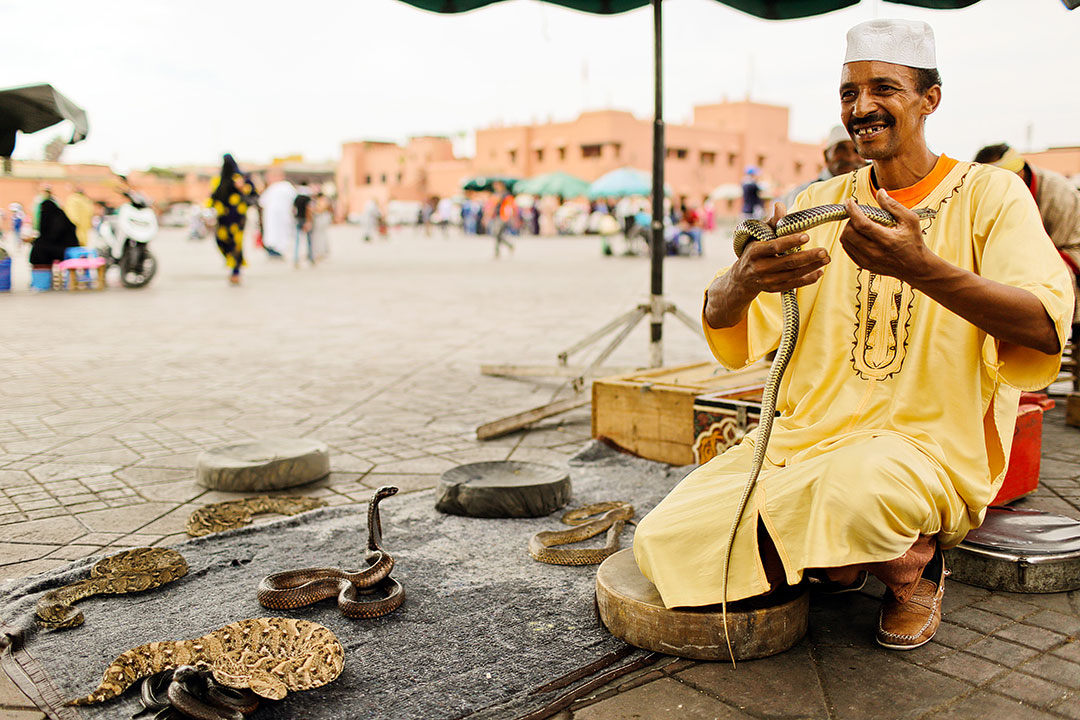
19. Bring TOilet Paper with you Everywhere
Don’t expect bathrooms to have toilet paper. Be prepared with your own and also have some hand sanitizer available. A lot of public restrooms have a small fee as well so if you see an attendant be sure to ask the price before using the bathroom.
Though they’re not flushable, I like to bring my wet wipes on all my trips to wipe my hands when I don’t have easy access to bathrooms.
20. Souvenirs to Bring Home
Fez is known for leather and carpets, while Marrakech is known for fragrances, oils, and spices (like saffron). If you’re buying saffron, make sure you’re buying the real thing. Many places sell artificial saffron for dirt cheap or mix the real with the fake stuff. No one wants saffron cut with other spices.
You can ask them to do a demonstration in water. If it colors the water yellow, it’s real, if it turns reddish, it’s the dye coming out from the artificial saffron.
You can also smell the difference (should smell more herbal), or ask for a couple of strands to put in your mouth and spit it onto a tissue to see what color it produces.
21. It’s a cat Lover’s Heaven… and Hell
There are homeless cats everywhere in Morocco. They are super cute and made us smile every time we saw them but also really sad every time we had to walk away and leave them.
It seemed that the people of Morocco took care of them in their own way. We saw them feeding them scraps of food in the markets. If you’re highly allergic to cats, don’t forget to bring some allergy meds with you.
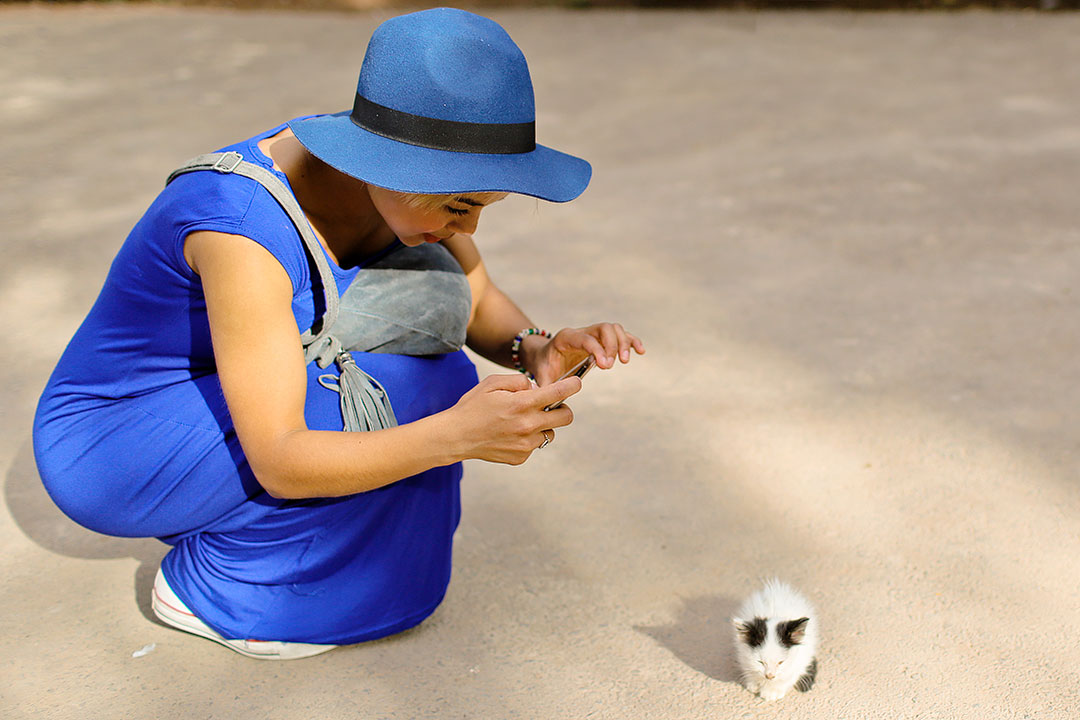
Final Thoughts as a Woman Visiting Morocco
There were many times on our trip that I genuinely wished I was a man visiting Morocco. While others simply got annoyed (full disclosure), I was much more sensitive since I still have residual resentment from some sexual traumas when I was younger that I am working out.
It’s a work in progress, making the trip incredibly challenging personally. For the most part, we had the best-case scenario of traveling with a local guide and Contiki. Those incidences happened within the few hours of free time that we wandered off alone.
Overall, Morocco is beautiful, and we’re happy to have experienced the country.
Instead of scaring you from visiting, we hope it educates you and helps you go in with the right mindset and expectations. As long as you’re entirely aware of your surroundings and know what to expect, you can have a wonderful experience.
- Get comprehensive insurance for your trip.
- Find a great deal on Morocco hotels .
- Arrange a rental car for your trip.
- Book a tour for your visit.
- Get airport lounge access .
- Buy a travel charger to keep your devices charged.
- Get a new backpack for your trip.
- Buy a Morocco travel guide .
- Pack the appropriate shoes for your trip.
- Don’t forget your in-flight essentials .
- Lonely Planet Morocco – they always have great photos and information.
- Moon Morocco – also very photo heavy.
- Morocco National Geographic Adventure Map
- Pocket Arabic Dictionary
Is Morocco one of the top places you want to visit? Why or why not? Can you think of any other tips for visiting Morocco?
Did you enjoy this post? Pin it for later
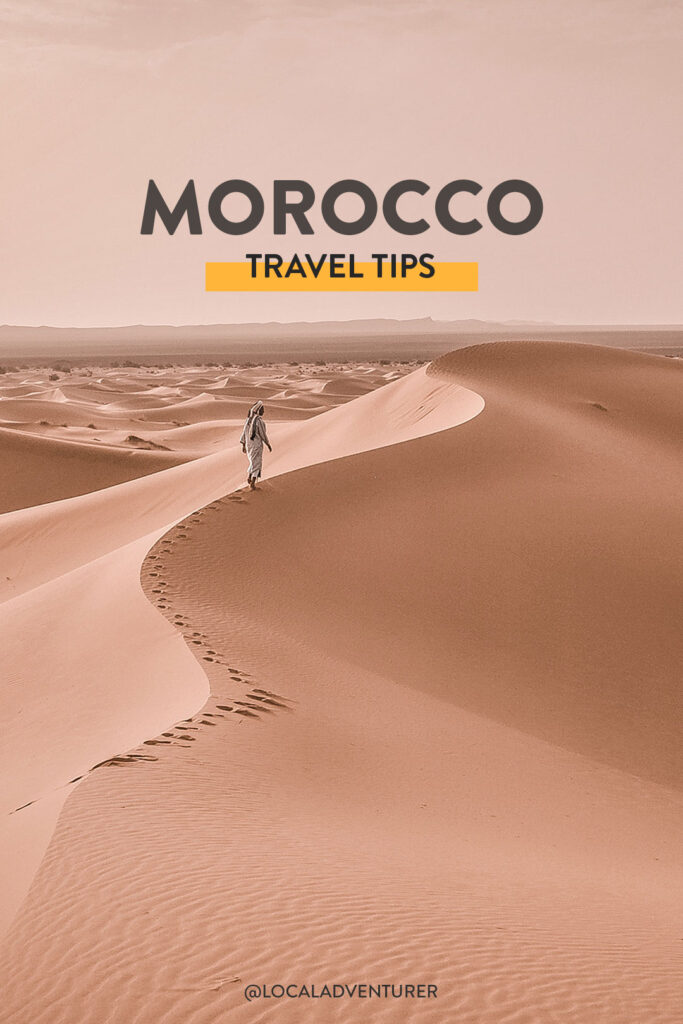
SEE More International City Guides
GALAPAGOS ISLANDS
KYOTO, JAPAN
LONDON, ENGLAND
MANCHESTER, ENGLAND
MELBOURNE, AUSTRALIA
NEWFOUNDLAND, CANADA
PARIS, FRANCE
PORTO, PORTUGAL
QUEBEC CITY, CANADA
REYKJAVIK, ICELAND
TOKYO, JAPAN
“Discovery consists not of seeking new lands but in seeing with new eyes ” – M. Proust
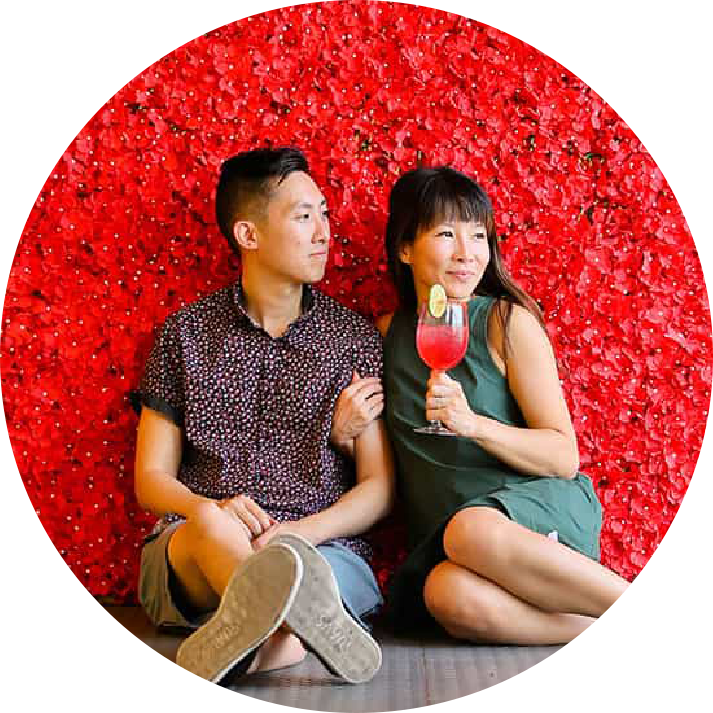
Esther + Jacob
Esther and Jacob are the founders of Local Adventurer, one of the top 5 travel blogs in the US. They believe that adventure can be found near and far and hope to inspire others to explore locally. They explore a new city in depth every year and currently base themselves in Las Vegas.
Follow on Instagram (E + J) , YouTube , TikTok , and Pinterest.
This Post Has 33 Comments
I’ve been to Morocco 3 times. Tangier and twice to Agadiar. Guess what IM A WOMAN and had the most amazing time in both areas. In Tangier we visited the Casbah which was amazing. Haggling was fun and the people are great. Never felt vulnerable and I have not been insulted or felt afraid. On the most part the people are really nice. I absolutely love Agadir. Its modern in its approach and there’s loads to do. The beach is beautiful. As two women travelling without a man, oh who’d of thought, we did not have any issues in Morocco anymore than anywhere else. Wherever there’s men they’ll be the ones who are rude, sexist and revolting. That’s unfortunately the way some of them are. Otherwise the people of Morocco are lovely. I’d go every year if I could afford it.
That’s so great to hear you had a wonderful experience! I’ve definitely heard a mix of thoughts from both sides.
Thanks for your list of tips. I’m a bit conflicted about Morocco due to my serious feminist leanings, but I so want to see it. It’s a shame that there is such disrespect and hypocrisy, but I suppose that’s everywhere in some regard. ;-)
You’re welcome, Hillary. I still hope you get to experience all the good parts of Morocco. I think it’s definitely changing with the younger generations, but it really is a different world view over there.
as local Moroccan, I can confirm that the tips that you provide are true. I am ashamed of the ‘Watch Your Pockets’ tip; what can I say?! every place have it’s good and bad people. however, by mentioning that you are making people aware so that they don’t have any bad experiences in Morocco. thank you :)
I think it’s true for most big cities in the world. :) Thanks Abdou!
Hi I’m Indian live in dubai UAE I like to visit Morocca it need visa or not I’m hear with residents visa
Great article. My friend is currently in moroco and hates it. I hope that she gets home safely and isnt raped. I am never going to visit! I will stick to places like Finnland, Switzerland and new Zealand
Stay safe everyone!
dont forget that you can be beheaded if you backpack in the countryside :)
I did not hear about that!
Thank you realy Marrakesh is very nice
So glad I found this! I booked today for me and my partner to go next year. Great to have an idea of what to expect.
So glad you found this helpful, Donna. I hope you two have a great trip!
Such a detailed insides about morocco, a great read to be aware before going to morocco, I have some more insights in depth. If you want to read.
Thanks for the information, yes I agree that before visiting In Morrocco we must know about the details of that places. When I had visited that place I don’t know anything about that place but my journey was very interesting and beautiful. The natural beauty also attracts me a lot.
Glad you found it useful, Diana!
Thank you for being so detailed. Your blog is wonderful and very insightful. I will use it in future travels. Thank you for including pictures.
Thanks so much for reading, Madison!
Wow…such an amazing experience feeling happy while visiting Morocco. Basically, in time of our trip we visited local market bought many products. Thanks to our local guide from yougomorocco.com planned a trip in a perfect way. I hope I will plan this place in an upcoming year.
Thanks for such an informative blog! I would love to travel to Morocco, and in fact, almost booked a trip, but decided to go elsewhere instead due to time constraints. Thanks for the advice to get out of the cities and explore more.
thanks for sharing the valuable info for Morocco visitors !!
I’m planning to visit Morocco with my boyfriend in March. But I’m a bit skeptical. Will I be safe in Morocco
My daughters middle school is deciding bet Morocco & Brazil. there will be at least a minimum of 20 middle schoolers with parents, The trip will be next April 2018. Im worried either way on what they can do
I feel like as long as there are parents watching out for them, they should be okay. It’s unfortunate to say, but it helps if the parents are male. Our tour guide was telling us they previously sent a female guide who didn’t fare too well in the country.
Very informative write up. I appreciate your work. I will be visiting Casablanca on official note in a weeks time just for two days. I hope the experience will be great! However, you did not mention what the cost of various hotels are like.
Thank you so much.
I’m moroccan and I have been there like 5 times I think but everything you said is true. It’s good you’re being honest about it. Morocco is good but it’s not perfect.
Thanks for your comment. If you think about it, no country is perfect. I’m sure plenty of people have gone and had different experiences too, so it’s best seeing it for yourself. :)
Very informative. Thank you for being so open and honest. I still want to visit Morocco and now have a good idea as what to.expect, especially as a woman.
Thanks, Suzy! You absolutely should! :)
Thanks, I will be in morocco in July, really helpful tips, Choukran :) regards Ayaz
You’re so welcome! Have a great trip :)
How I can trip to morocco is there any cheap morocco holidays packages ? My friend suggest me this website http://www.viriksonmoroccoholidays.co.uk is this good ? i find this website have very affordable packages but I am confused because of fraud.
Unfortunately we’re not sure about that company since we’ve never been. The only experience we have in Morocco is with Contiki, which we had a great time with! Good luck!
Leave a Reply Cancel reply
This site uses Akismet to reduce spam. Learn how your comment data is processed .
Cookies on GOV.UK
We use some essential cookies to make this website work.
We’d like to set additional cookies to understand how you use GOV.UK, remember your settings and improve government services.
We also use cookies set by other sites to help us deliver content from their services.
You have accepted additional cookies. You can change your cookie settings at any time.
You have rejected additional cookies. You can change your cookie settings at any time.
- Passports, travel and living abroad
- Travel abroad
- Foreign travel advice
Warnings and insurance
The Foreign, Commonwealth & Development Office ( FCDO ) provides advice about risks of travel to help British nationals make informed decisions. Find out more about FCDO travel advice .
Military activity in the region
On 13 April 2024 Iran carried out military action against Israel.
On 19 April, there have been reports of explosions in Iran, and unconfirmed reports of explosions in Syria and Iraq.
Monitor this travel advice and other media as the situation is changing fast. Follow and contact FCDO travel on Twitter , Facebook and Instagram . You can also get email notifications when this travel advice is updated.
Read FCDO advice on how to deal with a crisis overseas.
Before you travel
No travel can be guaranteed safe. Read all the advice in this guide as well as support for British nationals abroad which includes:
- advice on preparing for travel abroad and reducing risks
- information for women, LGBT+ and disabled travellers
Follow and contact FCDO travel on Twitter , Facebook and Instagram . You can also sign up to get email notifications when this advice is updated.
Travel insurance
If you choose to travel, research your destinations and get appropriate travel insurance . Insurance should cover your itinerary, planned activities and expenses in an emergency.
Related content
Is this page useful.
- Yes this page is useful
- No this page is not useful
Help us improve GOV.UK
Don’t include personal or financial information like your National Insurance number or credit card details.
To help us improve GOV.UK, we’d like to know more about your visit today. We’ll send you a link to a feedback form. It will take only 2 minutes to fill in. Don’t worry we won’t send you spam or share your email address with anyone.
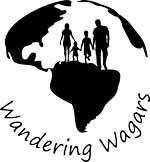
Morocco Packing List: A Complete Guide On What To Pack For Morocco Travel
Morocco packing list will help you understand what to pack for Morocco travel so that you’re well-suited for the epic adventures that await.
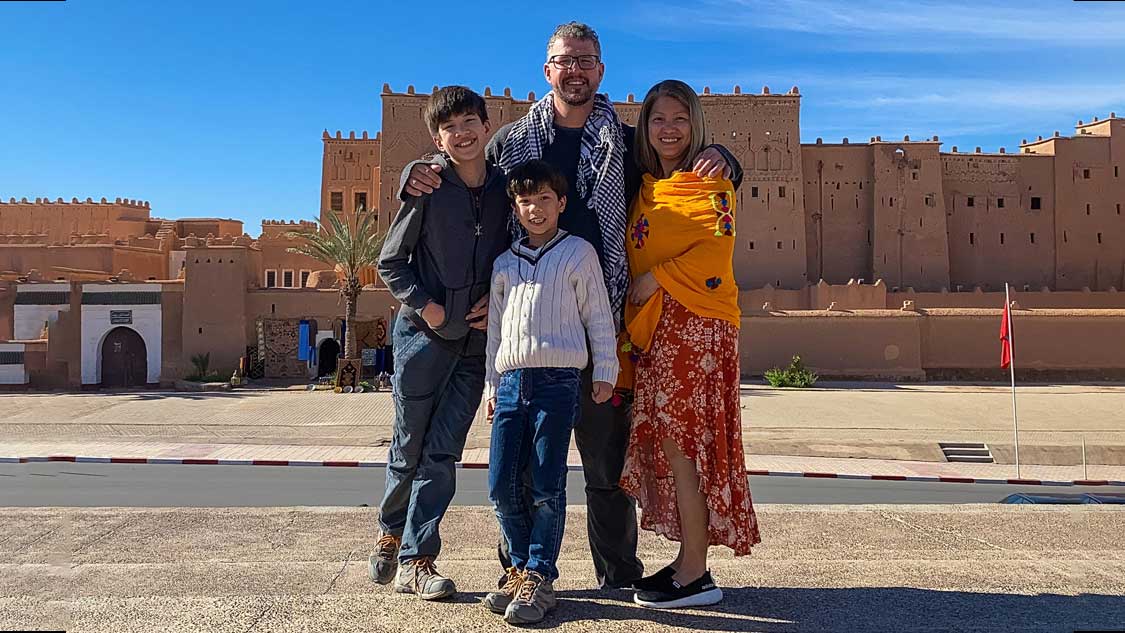
Morocco is a country that few countries can match in terms of accessibility, beauty, and mystique. It is a country packed to the brim with ancient history, remote desert villages, and markets brimming with a rainbow of herbs and spices.
Morocco is a land that sits on the doorstep of Western Europe, yet travel in the country can feel like entering an entirely new world.
For those entering the country for the first time, or travelers who have been drawn back to the mystery and beauty of the country again and again, it can be a challenge knowing what to pack for Morocco travel.
Part of the challenge in creating a Morocco packing list lies in the wild landscapes within the country. Morocco lies on both the Mediterranean Sea as well as the Atlantic Ocean. And within the country, you have the three Atlas Mountain ranges and the northern borders of the sprawling Sahara Desert where many visitors experience the Merzouga luxury desert camps .
The sheer expanse of the country means that, if you visit Morocco at the right time, you could be swimming on the sandy beaches of Agadir, skiing the Atlas slopes in Ifrane, or shredding the massive Erg Chebbi sand dunes on a four-wheeler. And, as you can imagine, those three activities require very different packing lists.
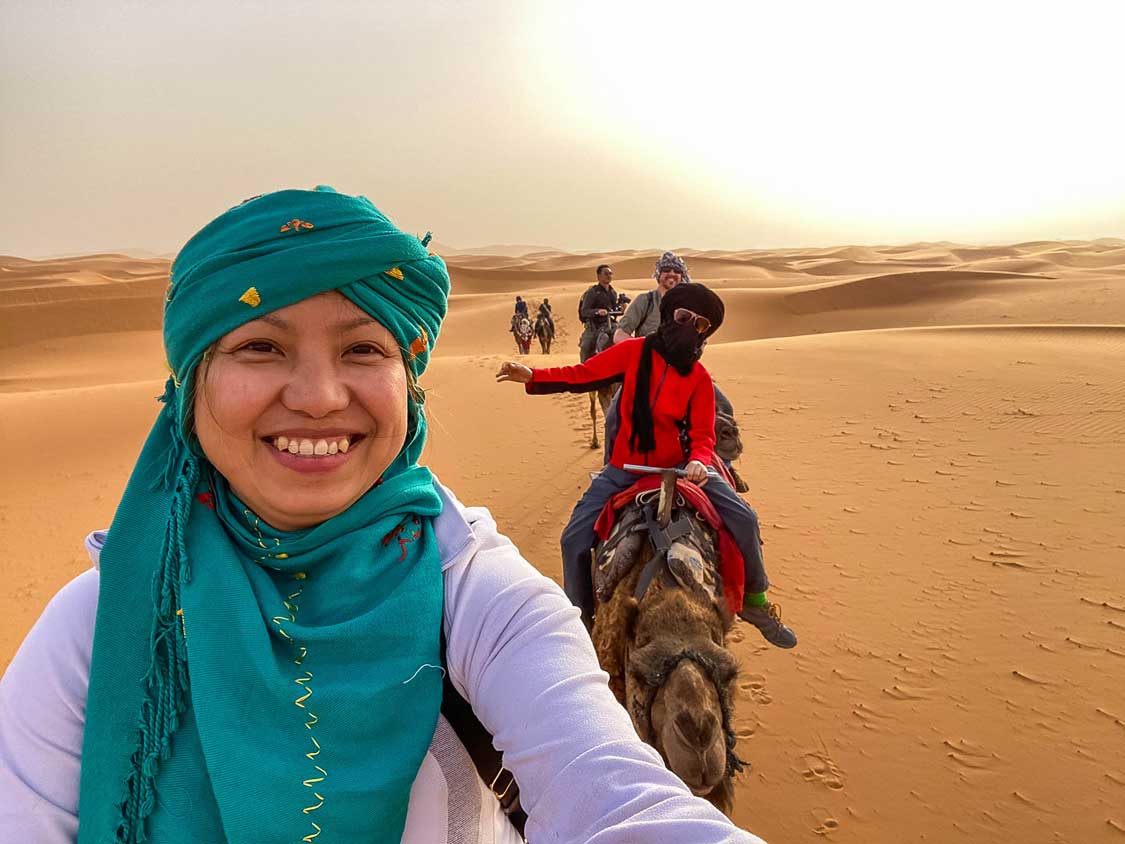
During our ten-day Morocco itinerary , we explore a lot of the country. We experienced some of the most magical places to visit in Morocco , including Marrakesh, Mergouza, the High-Atlas Mountains, and even desert camping. We were comfortable the entire visit because, after 47 countries, we’ve become experts at packing for adventurous travel.
So to help you understand what to wear in Morocco and also what NOT to wear in Morocco, I’ve put together this guide to help you plan. And, if you’re like us and visiting Morocco with kids , know that we planned this Morocco packing guide with them in mind as well.
How to Dress in Marrakech For Women
Table of Contents
Morocco is a very unique country to travel to. There is a vast influence of styles and cultures throughout the land. But it’s worth remembering that it is an Islamic country. As such, the typical clothing worn by locals is relatively conservative, especially for women.
Christina, having traveled to other Islamic countries, including Jordan and Egypt, in the past, knew that there could be some important differences between the cultural expectations in these countries for men and women.
Throughout the country, you’ll find that locals dress in a variety of ways. In the desert region, you’ll find many traditional Berber outfits, while in the cities, the dress style can range from urban chic to niqabs with full face coverings.
If you’re traveling in urban centers such as Marrakech , you won’t need to worry too much about how you dress. If you’re visiting religious sites, I recommend having a scarf or covering that will ensure that your shoulders are covered, and bare legs are rarely permitted (for both men and women).
However, in the rural regions such as Merzouga , things can be more conservative. This doesn’t mean being covered head to toe in a burka, but you should avoid wearing clothes that show a lot of skin. Light pants and shirts (t-shirts are fine) will help you blend into the local communities better and avoid unwanted attention from those who might not be used to seeing women dress in a more “western” fashion.
What to Pack for Morocco Family Travel
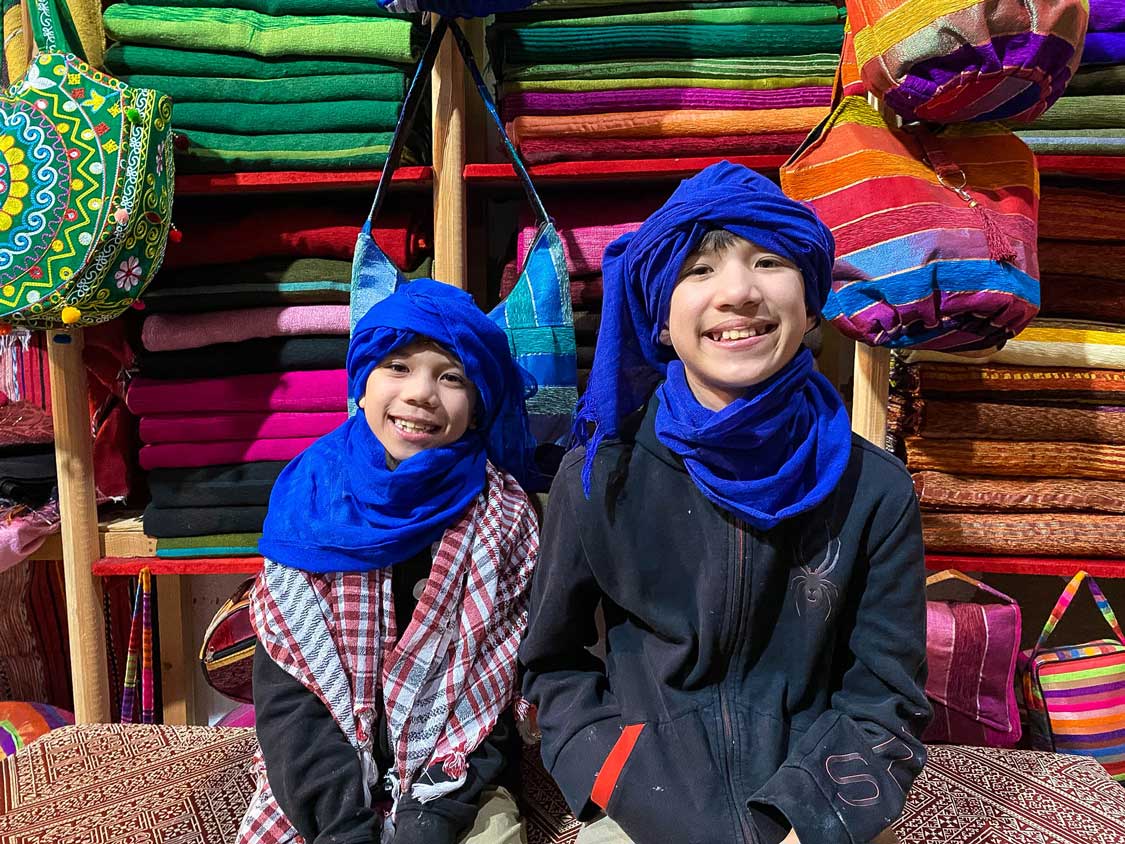
If you are packing for Morocco, it’s important to know how you plan to travel. Most families who travel through Morocco do so via an organized tour. However, many will travel independently or in small or large groups.
The weather in Morocco can be incredibly variable. From the beaches of Agadir and Casablanca to the towering Atlas Mountains through to the Sahara Desert, packing for Morocco means planning for every eventuality. We suggest dressing in layers. Temperatures can be all over the map in Morocco, even if you aren’t changing locations.
Dressing in layers means you can remove clothing when you get hot and put it on if you get cold. This is how we traveled during our time in Morocco with kids .
Travel Bag and Luggage For Morocco
If you are traveling to Morocco for two weeks or less, it is very doable to travel with carry-on luggage only. But doing this means picking durable and flexible carry-on luggage. I recommend something lightweight and rugged for moving through the country. You can find our guide to the best carry-on luggage here .
However, travel to Morocco means preparation. And, if you’re like us and take part in a range of activities when you travel, a check-in bag might be more realistic. We traveled to Morocco with check-in bags. This ensured we had all the Morocco travel gear we needed. You can find our guide to the best suitcases here .
The Best Day Pack For Morocco
Picking the best daypack for your travels in Morocco is crucial. A great daypack is one of the only ways to carry around your water bottles, cameras, sunscreen, and other things you need to pack for Morocco travel. You can check out my guide to the best daypacks for travel here .
For this Morocco packing guide, I recommend something lightweight and breathable. The temperatures can be hot, especially during the spring and summer months. So having something that wicks the sweat away from your body will make you much more comfortable.
The Best Shoes For Morocco
I will highlight this immediately because having the best footwear is crucial to enjoying your time in Morocco. From mountains to deserts, the landscape in Morocco can change dramatically. Make sure you choose quality shoes for your trip.
If you’re planning on spending your time in cities such as Marrakesh , Casablanca, and Fes , you might be fine with some urban walking shoes. However, if you’re planning on exploring the rural towns such as Soukra, Merzouga , or Tinghir , you’ll definitely want to bring hiking shoes.
I recommend lightweight, breathable shoes with a good grip. Because there is so much walking, you want your feet well cared for. It’s important not to overlook your kids’ footwear either; choosing good hiking shoes for kids is just as important as choosing them for yourself.
You can find our favorite hiking shoes for men here, our top hiking shoes for women her e, and the best hiking shoes for kids here.
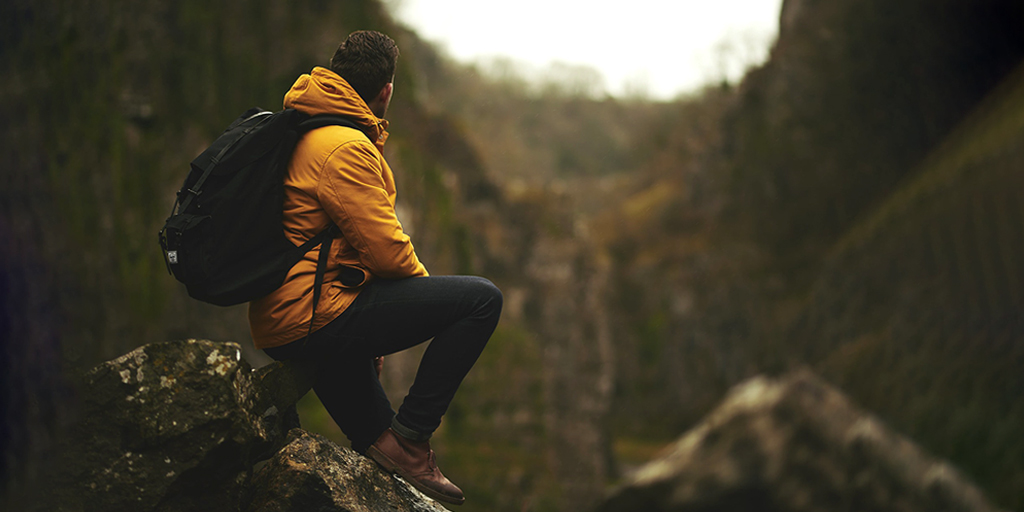
The Best Clothing For Morocco Travel
Underwear and socks for morocco.
What goes on underneath your clothes for Morocco is just as important as the clothes themselves. You can get by with just about any comfortable underwear for Morocco; I recommend bringing along some lightweight, quick-dry underwear like these ones for men . Christina recommends these ones for women . That way, if you need to do some emergency laundry, you won’t be waiting forever for them to dry.
Socks for Morocco, on the other hand, are super important. Make sure to pack wool or synthetic blend socks. These materials wick water and sweat away from your body. This helps to keep your feet dry. Christina loves these socks for their lightweight, comfortable, and durable materials. I’m personally a fan of these men’s travel socks .
Rain Jacket For Morocco
Summer in Morocco is fairly dry. But if you’re traveling in the winter, rain is a real possibility. Choose a lightweight rain jacket that breathes well. A rain jacket can help with many things. It can be a great windbreaker, an extra layer of warmth, and something to keep you and your family dry. Christina likes this rain jacket for women , while I am a fan of this one for men . If you’re looking for one for the kids, this is the one that our kids use .
The Best Pants For Morocco
Choosing the best pants for Morocco shouldn’t be a challenge. You can get by with the most comfortable, weather-resistant pants. Personally, I wear these pants almost everywhere I travel. They’re light, comfortable, and work well for both hiking and urban travel. Christina prefers these pants , while these are the ones that our kids normally wear.
But no matter what pants you choose for your Morocco packing list, I recommend light and breathable ones that wear well and are comfortable. Unless you’re only exploring the cities, skip the jeans for this trip.
T-Shirts For Morocco
Light, breathable t-shirts are ideal for your family travel to Morocco packing list. They keep your core dry and warm without weighing down your bags. They also help to wick sweat away from the body.
This ensures that you won’t get chilled even if you’re sweating high up in the Atlas mountains. This is the shirt that you’ll typically find me wearing . And this is the one that Christina recommends for women’s clothing in Morocco.
As far as travel t-shirts for kids, merino can be a pretty expensive material, especially with how fast kids outgrow their clothes. We typically save a few dollars by opting for quick-dry synthetic t-shirts such as this for the boys.
Long Sleeve Shirts
The weather in Morocco is typically pretty consistent. But the temperatures can vary a lot, especially if you’re traveling in the mountains. It’s important to pack for Morocco’s weather which is anywhere from hot to cool.
You don’t need a long sleeve shirt for Morocco every day. But it’s good to have a couple on hand for the time in the high elevation areas. Personally, I like shirts that I can wear on the trail and in the city. This is what you’ll typically find me wearing. Christina usually packs these tops . And I recommend something like this for the kids .
You’ll also want to ensure that you have some sweaters on hand. As you can see from our photos, we have sweaters on many of the days that we were traveling. Temperatures in Morocco can vary quite a bit from region to region, and nights, especially in the winter, spring, and fall, can be quite cool.
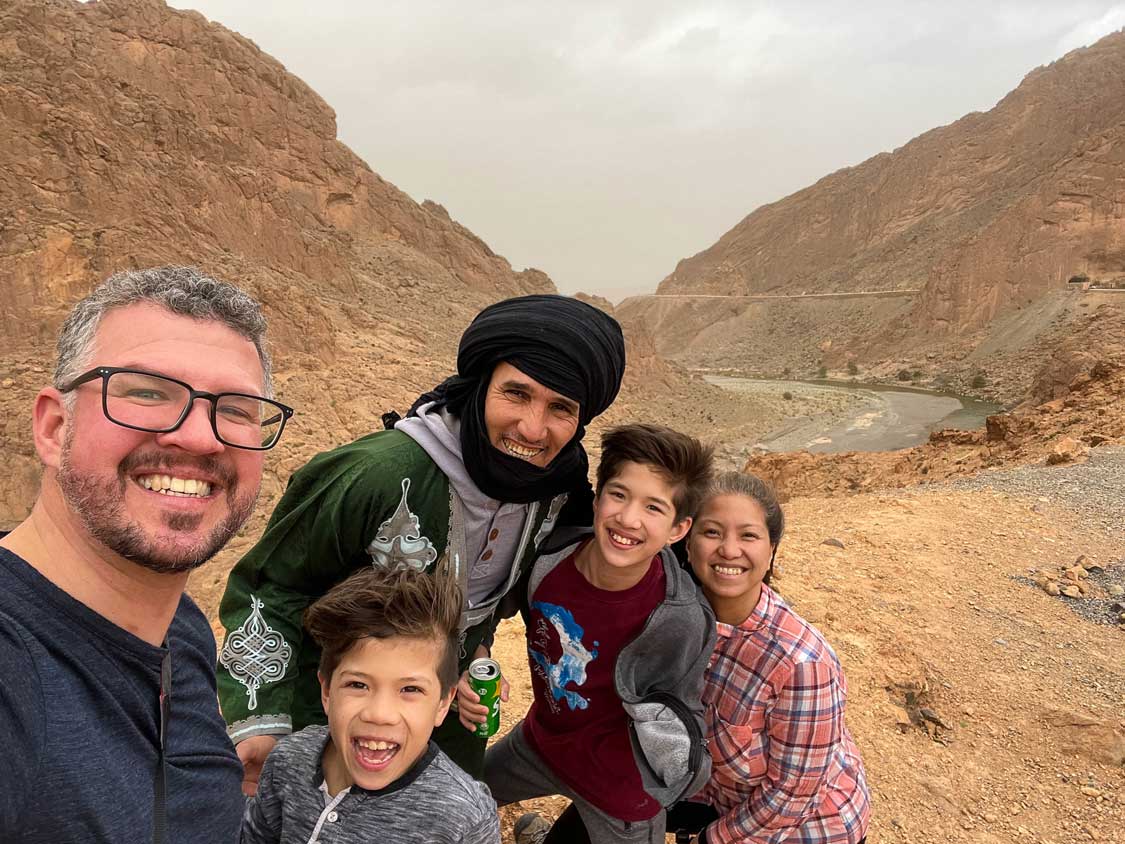
Other Clothes For Your Family Travel To Morocco Packing List
When we are packing for Morocco, we always make sure that we have a few other items in our packing list. Here are a few other items not to forget.
- A set of nicer clothes (We always try to have one fancy meal in each country).
- Belt – I’m a huge fan of this belt by Grip6 . I wear it almost every day of the year, traveling or not.
- Wide Brimmed Sun Hat – I like these for kids , this one is Christina’s favorite, and Kevin likes this one .
- Sunglasses with UV protection.
- Lightweight Travel Jacket – I usually use something like a down poof jacket to save weight. Travel jackets like this pack up super small and weigh almost nothing.
- Neck Gaiter – Neck gaiters can convert to multiple styles and work great for added warmth, wind protection, etc. We don’t travel anywhere without them anymore. And they are perfect for keeping the sand off your face when you’re exploring the Sahara Desert.
Other Items For Your Packing List For Morocco
These aren’t just for packing for Morocco; we take these packing list items on almost every trip and even on local outings.
- Flashlight or Headlamp along with extra batteries. These are important if you are spending time at one of the Sahara desert camps.
- Camera – We recommend a weatherproof/shockproof camera like this one in case of drops or falls.
- Tripod – Lightweight and portable
- Portable power bank – Some areas of Morocco have limited power. We always travel with a battery backup to make sure we can keep our gear charged.
- Electricity converter . The power system in Morocco is not the same as it is in North America and much of Europe. Packing a Type C power adapter . You can read more about the Morocco’s electrical requirements here .
- First Aid Kit (Read further down to see what should be in your first aid kit)
- Filtered Water Bottle – We don’t like to contribute to the massive amount of plastic pollution in Morocco. We always make sure to bring a filtered water bottle with us when we travel. You can check out our guide to the best filtered water bottles here.
- Insect Repellent
- Playing Cards – Sometimes, travel in Morocco means long bus rides, drives, or waiting at the airport. A Deck of cards is a great way to pass the time.
- Gifts for local children and guides – Packing pencils, books, and other writing utensils can bring smiles to local children in remote areas who might otherwise not have easy access to these things. Please don’t pack candy for children as children often don’t have easy access to dental care.
Recommended Reading For Your Morocco Travel
You can find great information about family travel to Morocco on our website. However, I always find that it’s useful to have a guidebook on hand . It gives me something to read about the locations I’m traveling to as I’m on the road. And I can reference information while I’m in places with limited or no internet.
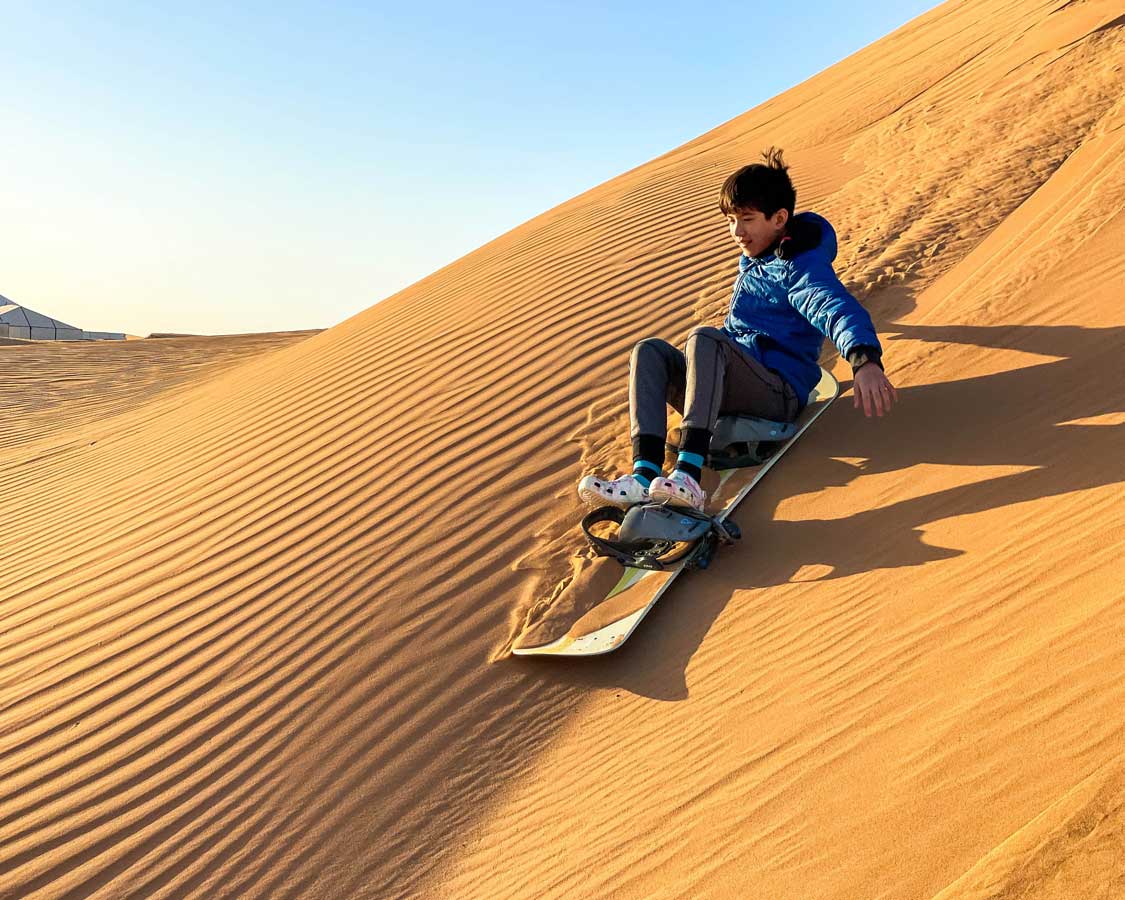
Other Morocco Packing List Items to Consider
These are items that are specific to certain types of travelers.
- Child Carrier – Strollers are almost useless outside of the major cities in Morocco. Most towns have cobblestone streets or dirt streets. Many archaeological sites are built on mountain or desert terrain. Bringing a good quality child carrier for young children is a great idea. You can check out our breakdown of the best child carriers for travel here .
- Hiking Poles – If you’re planning on hiking in Morocco, bringing a good set of lightweight hiking poles is very helpful. This goes double for if you are carrying a child. Hiking poles can help with balance on uneven terrain. We recommend these hiking poles .
- Portable Booster Seat -Most cars in Morocco have seatbelts. There are laws regarding seatbelt safety, especially involving children. If you are traveling with a child, we recommend bringing the MiFold portable booster seat . It’s small, lightweight, and easy to use. You can find that here .
Packing For Morocco – First Aid Kit
Accidents happen, and it’s always best to be prepared. These are the items that we pack in our travel first aid kit for Morocco. Morocco is not a country prone to malaria, so you won’t need that medication when traveling to the country.
- Prescription medication
- Ibuprofen – Fevers, colds, and aches and pains happen. Make sure you pack both adult and children’s ibuprofen.
- Band-aids, liquid band-aids, and gauze bandaids + medical tape
- Disinfectant for cuts and scratches
- Antihistamines – Even if you aren’t allergic to something at home, you may be allergic to something elsewhere.
- Diarrhea medicine (**it happens)
- Antibiotics (speak to your doctor before you travel)
What to Pack for Morocco – Documentation
Make sure you have your paperwork, travel visas, and passports in order beforehand. Please remember that rules such as visas vary from country to country. For passports, make sure that your passport is valid for at least 6 months from your planned departure date from the country you are visiting.
- Passports – Valid for 6 months from when you plan to leave.
- Travel Visa – If required for your country of residence.
- Airline tickets – Ensure all names on tickets match your passport documentation.
- Travel Insurance – Always be prepared in case of an emergency. We recommend World Nomads .
- Copies of documents – Before you leave, make photocopies of all crucial documents, including passports, driver’s licenses, etc. Keep these in a separate bag in case anything gets lost.
Frequently Asked Questions About How To Dress In Morocco
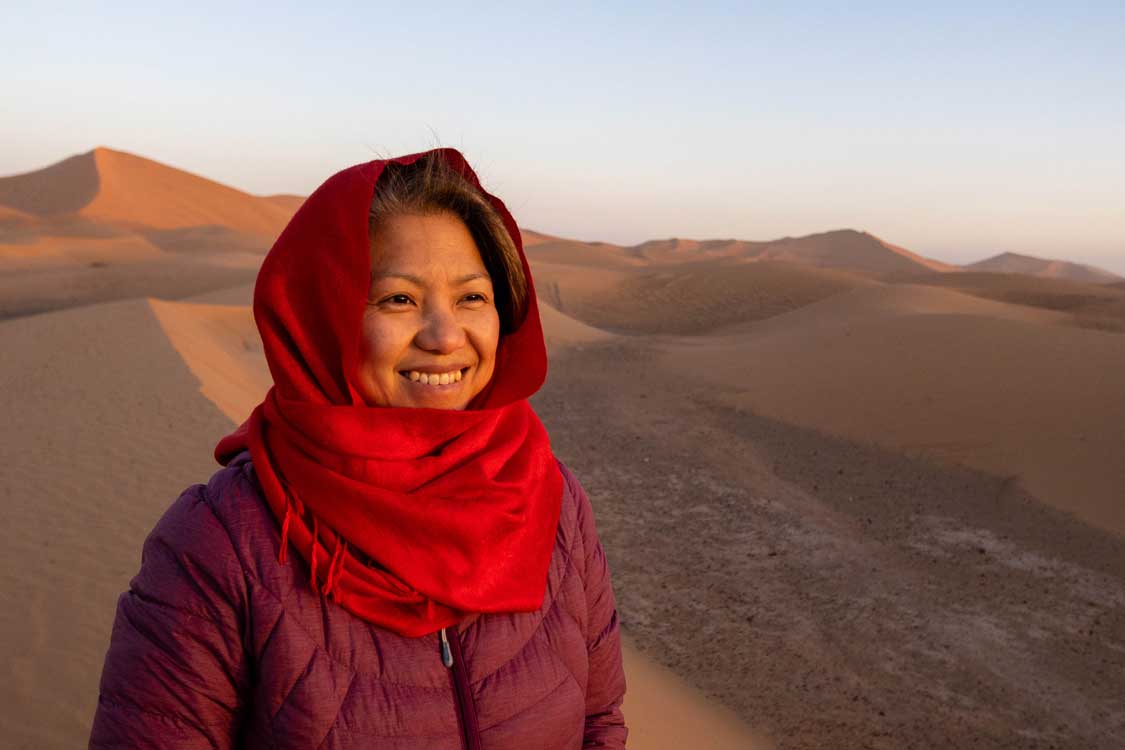
We get a lot of very specific questions about how to dress for Morocco travel. Here are a few of the most frequently asked questions.
Can You Wear Shorts in Morocco?
Locals in Morocco, while typically conservative, are used to tourists and travelers exploring the country. During the summer months, it’s not rare for visitors to be wearing shorts in the cities. However, in rural areas, it’s best to stick to longer shorts that cover your knees or Capri-length shorts. Typically I prefer full-length pants.
Are Women Required To Cover Your Body In Morocco?
Moroccans have a wide variety of clothing styles. While it is an Islamic country, there are no laws requiring women to cover their faces, hair, or bodies. It’s quite common for women, especially in the cities, to wear t-shirts and sandals.
However, if you’re traveling through the country, there may be times when modesty is appreciated by the locals. I recommend having a scarf or cover-up to throw on in those cases.
What Should You Wear Morocco?
Don’t stress too much about what to wear in Morocco. The typical rule to follow, especially for women, is that the more skin you show, the more attention you will get. Jeering can be a common thing, especially in the big city markets.
The biggest recommendation I have is wearing proper shoes. You’ll be walking a lot, and there is nothing worse than having sore feet while you travel.
What Should Women Wear In Morocco?
Women in Morocco are welcome to their choice of clothing styles. You’ll find everything from full-body niqabs to crop-tops and high heels.
Is It OK To Wear A Bikini in Morocco?
If you are visiting the pools or beaches in Morocco, women can wear bikinis, one-piece swimsuits, or even burkinis . Keep in mind that walking around outside of these areas in swimwear is not encouraged.
If you’re wearing a bikini at the beach and decide to stroll into town to get a snack, consider bringing a cover-up.
Is There A Morocco Dress Code?
There are no legal definitions for a Morocco dress code, nor are there laws prohibiting clothing styles or what you can or can’t wear in Morocco. However, the court of public opinion in the country leans toward more conservative clothing styles.
It’s worth noting that nude or topless sunbathing is illegal in the country. Despite its proximity to Europe, being topless anywhere in Morocco is considered illegal.
It’s Time To Pack For Morocco!
I hope that our Morocco packing list has been helpful. This is a wonderful country with warm, welcoming locals and absolutely unforgettable scenery and attractions. Please check out our Morocco family travel blog for more information on things to do and see in the country.
This post may contain compensated links. Find more info on our disclaimer. Wandering Wagars is a participant in the Amazon Services LLC Associates Program, an affiliate advertising program designed to provide a means for sites to earn advertising fees by advertising and linking to amazon.com, amazon.co.uk, amazon.ca. Amazon and the Amazon logo are trademarks of Amazon.com, Inc. or its affiliates.
You May Also Like To Read:
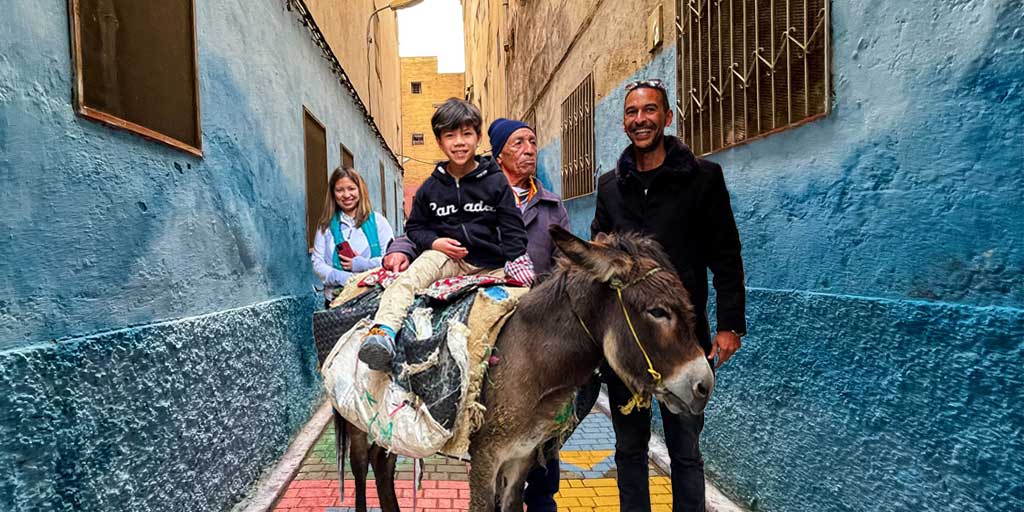
Wednesday 23rd of November 2022
Helpful, thanks. A few mentions of Peru, which was confusing at first...
Privacy Overview

IMAGES
VIDEO
COMMENTS
Dosing info - Hep A. Hepatitis B. Recommended for unvaccinated travelers younger than 60 years old traveling to Morocco. Unvaccinated travelers 60 years and older may get vaccinated before traveling to Morocco. Hepatitis B - CDC Yellow Book. Dosing info - Hep B. Measles. Cases of measles are on the rise worldwide.
Read the country information page for additional information on travel to Morocco. If you decide to travel to Morocco: Stay alert in locations frequented by tourists. Avoid demonstrations and crowds. Enroll in the Smart Traveler Enrollment Program (STEP) to receive Alerts and make it easier to locate you in an emergency. Follow the Department ...
Book train and bus tickets a day or two in advance to ensure the travel time you'd like. 3. Book professional guides. To get the most out of your trip to Morocco, use a guide who has in-depth expertise and speaks your language. In cities, check with the local tourism office or your accommodations for recommendations for licensed guides in the area.
Morocco. Africa. Check out this year's Best in Travel winners. A country of dazzling diversity, Morocco has epic mountains, sweeping deserts and ancient cities, and it greets travelers with warm hospitality and the perfect glass of mint tea. Best Time to Visit. Best Places to Visit.
Best things to do in Morocco. Our 10-day Morocco itinerary started in Chefchaouen, but you can easily do this the other way around. If you have the time, we would recommend extending the itinerary to 12 days (instead of 10) to have one more day in Chefchaouen and one extra for the Sahara Desert Tour.
Spring and Autumn (March - May, September - October): The best time to visit Morocco is in Spring and Autumn, between March and May and September and October. This period brings warm temperatures between 20°C - 30°C and sunny skies, making travel throughout the country very pleasant.
All travellers planning to visit Morocco must be fully vaccinated. The second dose of the vaccine must have been taken at least 14 days before travel. There are 10 approved vaccines acceptable for travel to the kingdom, including Sinopharm. Children under 18 are exempt from vaccination before travel. What do I need to do before I travel to Morocco?
Call us in Washington, D.C. at 1-888-407-4747 (toll-free in the United States and Canada) or 1-202-501-4444 (from all other countries) from 8:00 a.m. to 8:00 p.m., Eastern Standard Time, Monday through Friday (except U.S. federal holidays). See the State Department's travel website for the Worldwide Caution and Travel Advisories.
While levels have still to catch up with pre-pandemic times, the Minister of Tourism, Fatim-Zahra Ammor, reports that 3.4 million tourists arrived in the first half of 2022. She's hoping to push that to 8 million in total in 2022 and a whopping 10.5 million next year. Tourism is one of the key industries driving economic growth in Morocco, so ...
Morocco Travel Guide. Your ultimate Morocco travel guide, with tips, things to do, and best things to see in Morocco. Great for first-time and returning travelers. Morocco is a fascinating multicultural country blended from African, Arab and European influences. It is our closest link to the continent of Africa and a diverse holiday destination.
Morocco is located in the northwest corner of Africa. Thanks to its stunning landscapes, colorful cities, year-round pleasant weather, and unique cuisine, Morocco is a popular travel destination. In this article, we'll highlight the most important things to know before going, the 10 best places to visit in Morocco, and some itineraries we recommend.
The largest oasis in the world is in Morocco Oases are part of the natural wealth of Morocco. With an area of 77,000 km2, the region of Tafilalet, in the south of the country, is home to the largest oasis in the world.This group of oases,...
An important Morocco travel tip is to be respectful of the language. Moroccan Arabic is the official language of Morocco. ... Check out my other recommendations on women's shoes, and the best men's travel shoes. Get a Pair for Morocco! Shemagh. Just throwing this into your bag will make packing for Morocco a breeze. A Shemagh is the perfect ...
The new edition of the Morocco Travel Guide by Rough Guide was published in 2019 and is therefore quite up to date. Our conclusion: perfect for anyone travelling to Morocco! ... Here you will find all our recommendations: Hotel tips for Morocco. 4. Eating and Drinking in Morocco.
Consult a health care professional or visit a travel health clinic preferably 6 weeks before you travel to get personalized health advice and recommendations. Routine vaccines Be sure that your routine vaccinations , as per your province or territory , are up-to-date before travelling, regardless of your destination.
Morocco officially lifted its international travel ban and reopened to vaccinated foreign visitors on February 7.But, there are some requirements you'll need to follow in order to enter. The move to open the borders follows "the evolution of the epidemiological situation in the kingdom" said a government statement via AFP, as hospitalization numbers stabilize across the North African country.
Here are the top 8 places to visit in Morocco on any trip. 1. Marrakech: Known as the "Red City", Marrakech is definitely the most iconic place to visit in Morocco. Home to beautiful palaces, gardens, and mosques, there are secrets hiding behind every ornate door.
Travel Tips for Visiting Morocco. Although Morocco is a magical country, it can also be a challenging place to get around if you aren't equipped with the right information. You'll attract unwanted attention and bad looks if you don't understand or respect the culture. The last thing you want is trouble in a foreign country.
If you're looking to buy a carpet or anything with a higher price tag, do your research before visiting Morocco. People get tricked into buying them as "an investment" to sell later. Don't fall for their sales tactics and the local guide's added pressure to buy. 6. Tipping. Have some change ready for tips.
Read all the advice in this guide as well as support for British nationals abroad which includes: advice on preparing for travel abroad and reducing risks. information for women, LGBT+ and ...
Riding Camels through the Sahara Desert. During our ten-day Morocco itinerary, we explore a lot of the country.We experienced some of the most magical places to visit in Morocco, including Marrakesh, Mergouza, the High-Atlas Mountains, and even desert camping.We were comfortable the entire visit because, after 47 countries, we've become experts at packing for adventurous travel.
Morocco Travel Tips & Recommendations 🇲🇦 ☀️ 🐪. Public group. ·. 42.3K members. Join group. This community is all about travel tips and recommendations for a better journey experience in Morocco. All content shred on this group is either...